
You are using an out of date browser. It may not display this or other websites correctly.
You should upgrade or use an alternative browser.
You should upgrade or use an alternative browser.
Tilea IC2401 (Campaign#8)
- Thread starter Padre
- Start date
Padre
Lord
Will do, Vonkortez. And in fact, have done so ...
The Battle of the Isean Hills Continued
The great mob of ghouls, who now equalled the enemy’s regiment in size thanks to the brute Horrors’ attacks and the cultists own murderous flagellations to maintain their state of crazed frenzy, charged headlong into the defences.
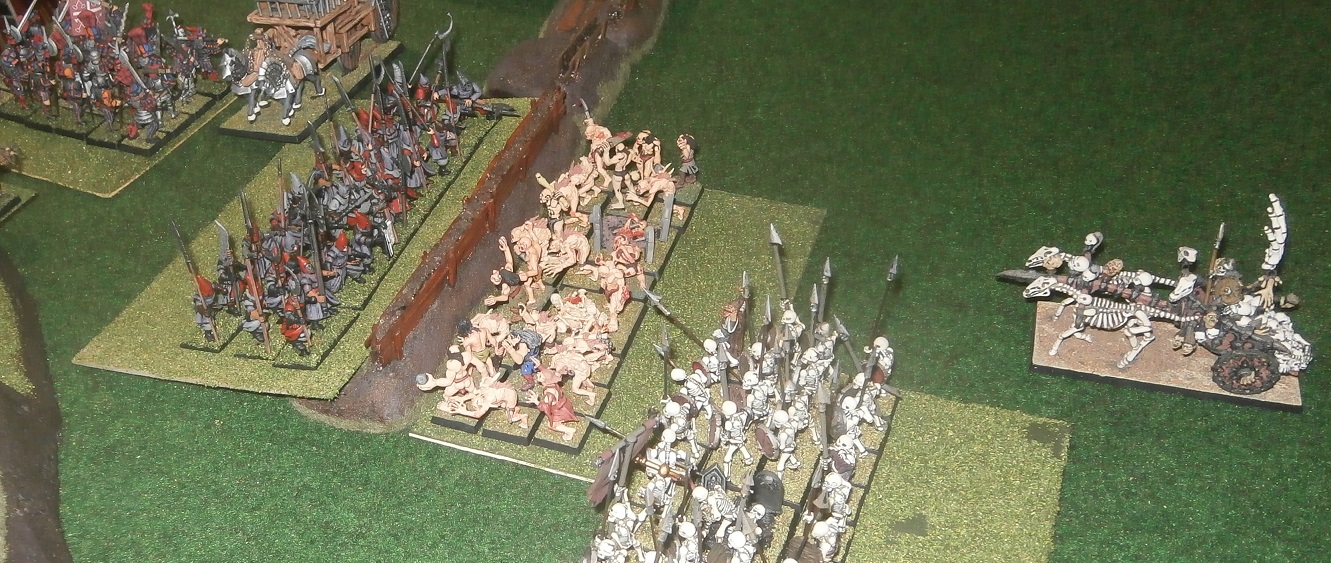
Maria cantered without undue haste to the side of the hex-wraiths and watched as Captain Bernhardt and his knights turned to threaten the Reman soldiery within the camp.
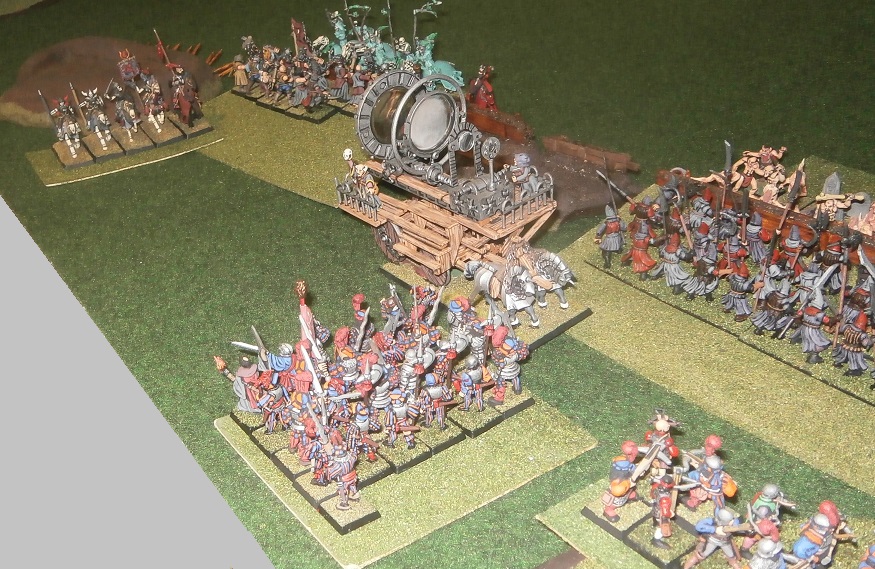
Whilst the winds of magic proved little more than a gentle breeze, so that not one spell could be successfully conjured, the fight between the ghouls and the dedicants proved very bloody indeed. Seventeen dedicants dies in the initial assault, and eighteen ghouls! (Game Note: The ‘End is Nigh’ roll meant the dedicants could re-roll to hits and to wounds for their 38 (yup!) attacks. In light of this, perhaps 18 seems like a bad result!) Two more ghouls collapsed from the weakening of the magics that kept them whole.
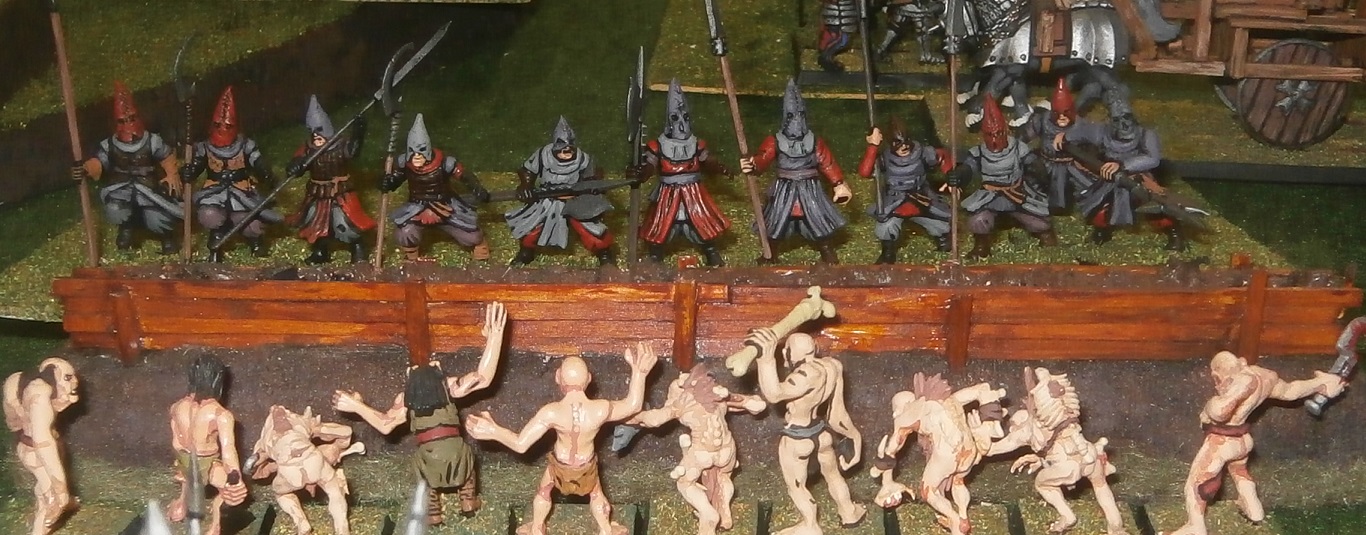
Captain Vogel knew he had to act decisively, before the enemy riders could launch themselves at him and his men. But when he ordered a charge, his so-called professionals proved wanting, and the hesitant lurch that resulted meant that the initiative was lost. The vampire Bernhardt and his knights were already spurring their fleshless horses into action. Standing with the Remans, Father Lorenzo quickly realised that something had gone awry, and so prayed for Morr’s Holy Protection to be gifted upon the men with him. He sensed its power as it enfolded them.
Upon the bastion-battery on the Disciplinati’s right, the cannoneers had shoved packets of grape shot down their pieces’ muzzles, and now both guns blasted the skeletons below them, shattering seven. (Game Note: 10 + 10 shots, but with 8th ed rules, you have to roll to hit as well as wound.) The bony warriors barely noticed, which in truth was the case most of the time!
The broken machine trundled about behind the defences, it’s crew’s shame exacerbated by the knowledge it was highly unlikely they would ever to get the chance to prove themselves or their machine in future battles, due to the fact that they were almost certainly going to die in this one.
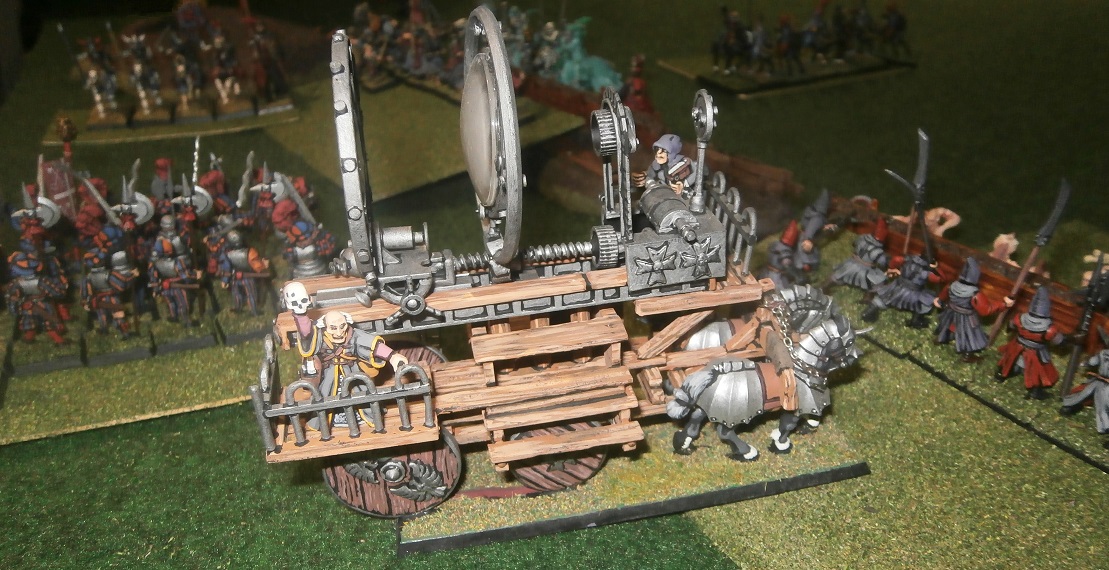
The Morrite dedicants fighting the ghouls, however, were so gripped with bloodlust that no such defeatist thoughts impinged upon their minds. They now slaughtered the last of the ghouls before them, to the loss of only one of their own to the foe’s vicious claws, but at a cost of two of their own to flagellation. The hexwraiths to their left, however, had cut down another four dedicants amongst their brother regiment, who despite their manic efforts could cause absolutely no harm in return. Meanwhil, Maria rode very close by as if nothing of consequence were occurring!
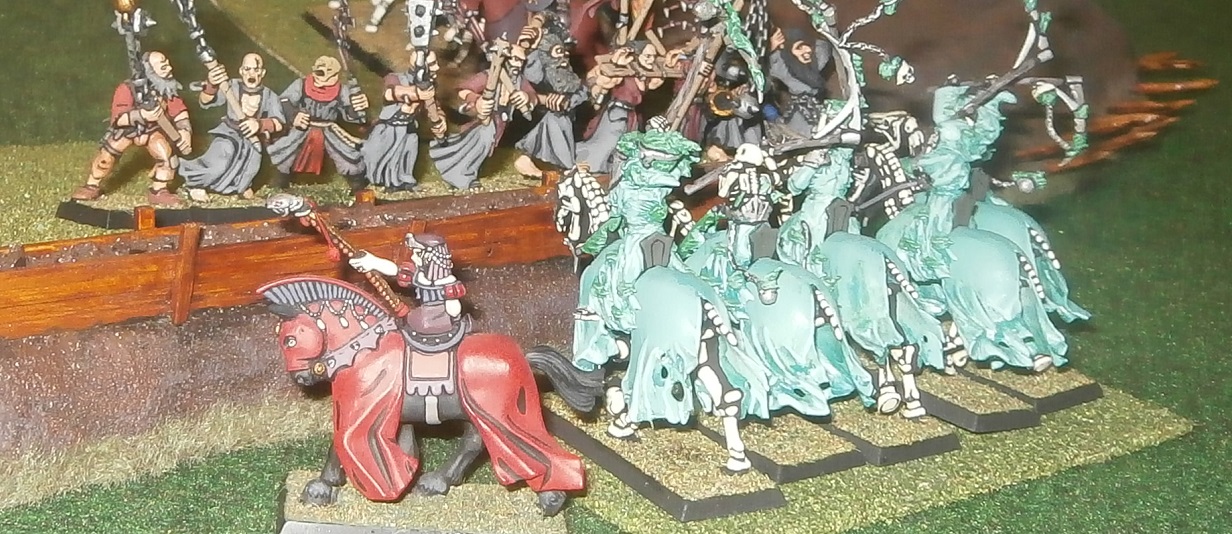
(Game Note: I was still amazed at what the hex-wraiths were doing, and could only imagine how frustrated I would have been about it if I had commanded the other side! BTW, we had toyed with the idea that the campaign player helping out by commanding an NPC army should command the undead, but as his player character, Lord Alessio Falconi, was currently engaged in a war against Maria’s servants in the south, it seemed only right that he should command here enemies in this game too!)
Maria was smiling, but there was not a soul alive who could see. She blew a kiss to Captain Bernhardt as he glanced at her upon the threshold of his charge, and then she joined him in hurtling headlong into Vogel’s hesitant Remans.

The Necromancer Saffiro had watched the slaughter of both the brute Horrors and the ghouls with interest and was now satisfied to see that only a few dedicants remained upon the defences. “My turn!” he thought to himself, then raised his hands to command his skeletons to charge.
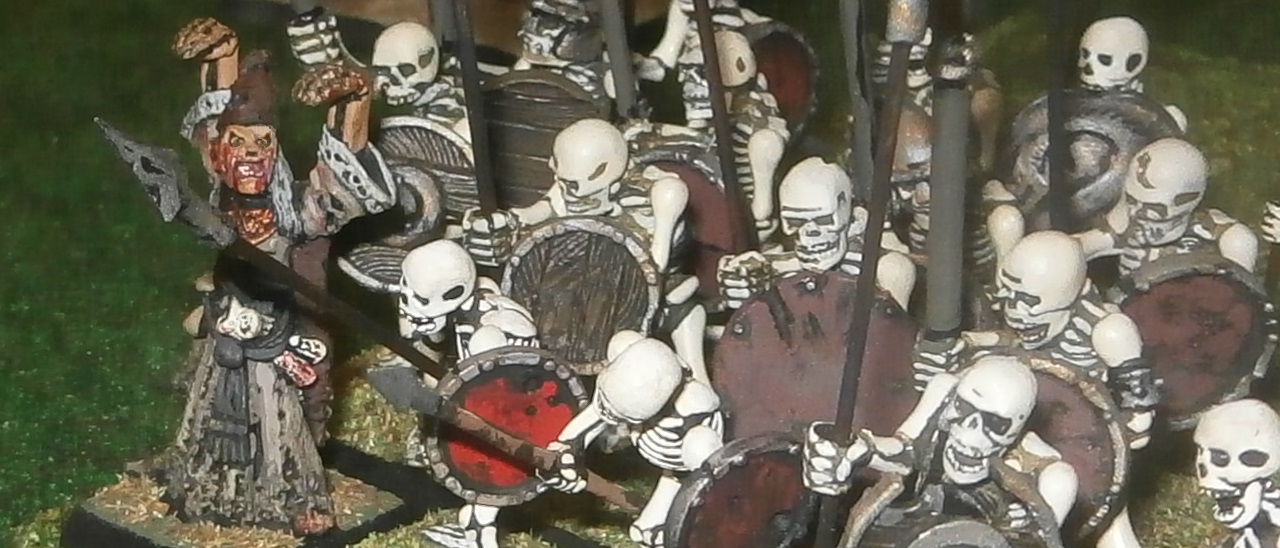
In they went, scrabbling over the piles of corpses strewn before the barricade without a care in the world, to stab a veritable forest of spears at the poor, tired souls on the walls!
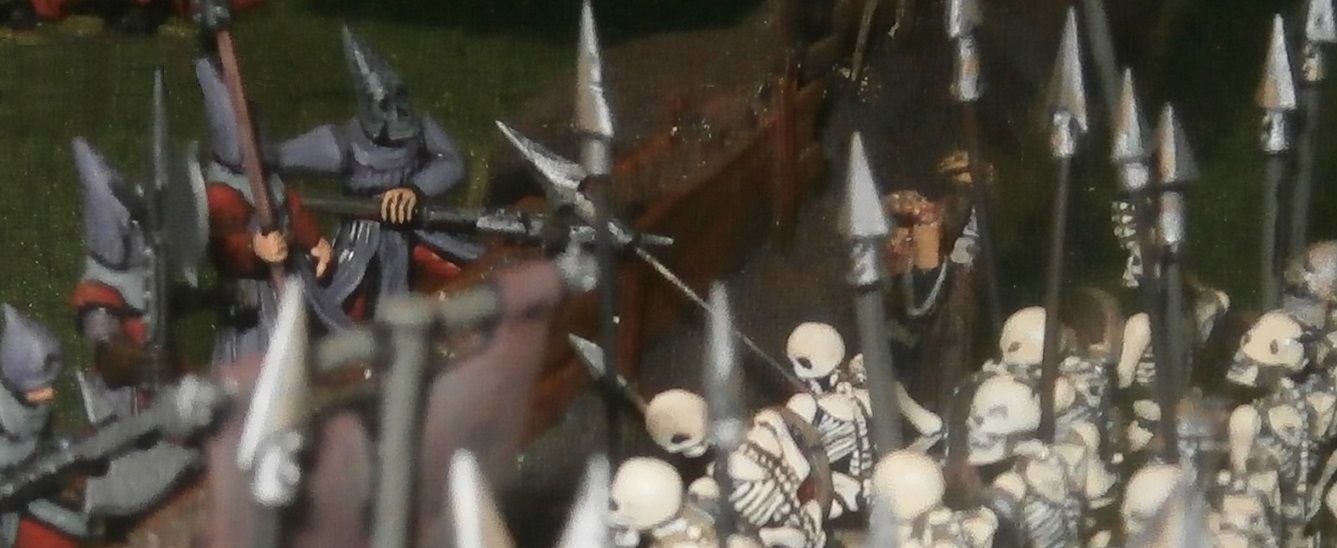
Before long there was but one cultist remaining. He stumbled back, his pointed hood so obscuring his sight that he had no idea he was the last. Whatever idea he did have, however, was his last.
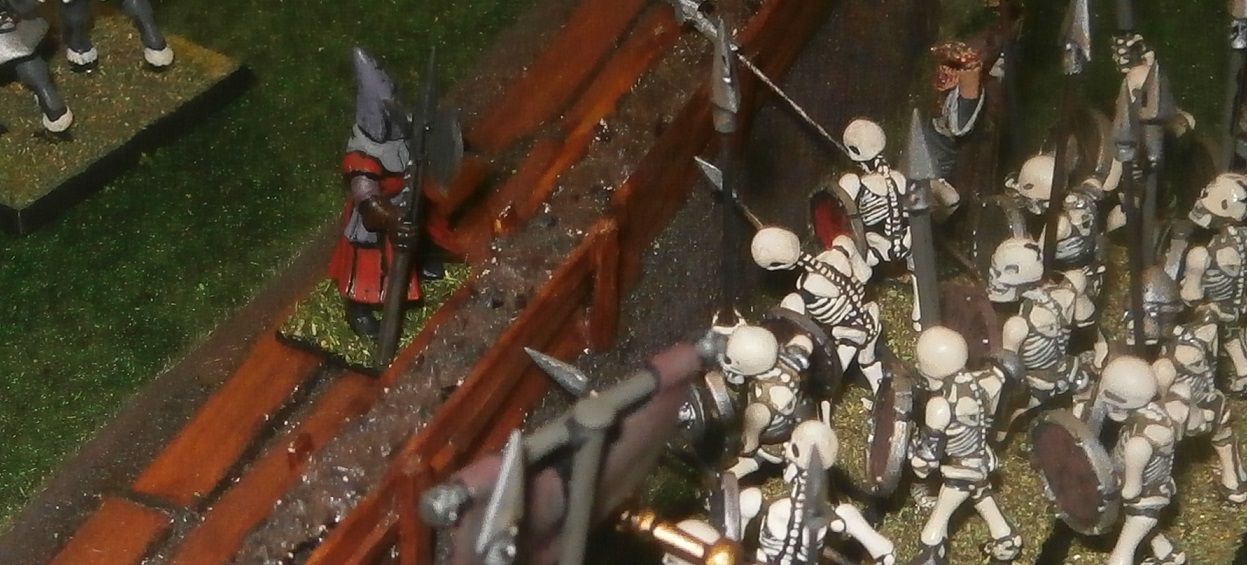
While the Hexwraiths’ scythes continued their bounteous harvesting of souls …

… Maria fatally cursed four of the Remans, then momentarily lost control of her magic while resurrected the missing knight. She was only saved from injury by her magical wards. Several more Remans died to the vampires’ and knights’ blades, and two of the knights were cut down in return. Somehow, the Remans had survived the initial impact, but the situation did not look good.
As Maria’s fight went on, cannon balls were fired to little effect, more dedicants were hewn by the wraiths, and crossbpw bolts clattered ineffectually against the corpse cart. Barone Pietro and his company rode to the rear of the undead and watched, aghast, as the slaughter went on. The riders dreaded the thought of charging in. Luckily for them, the barone gave no such command.
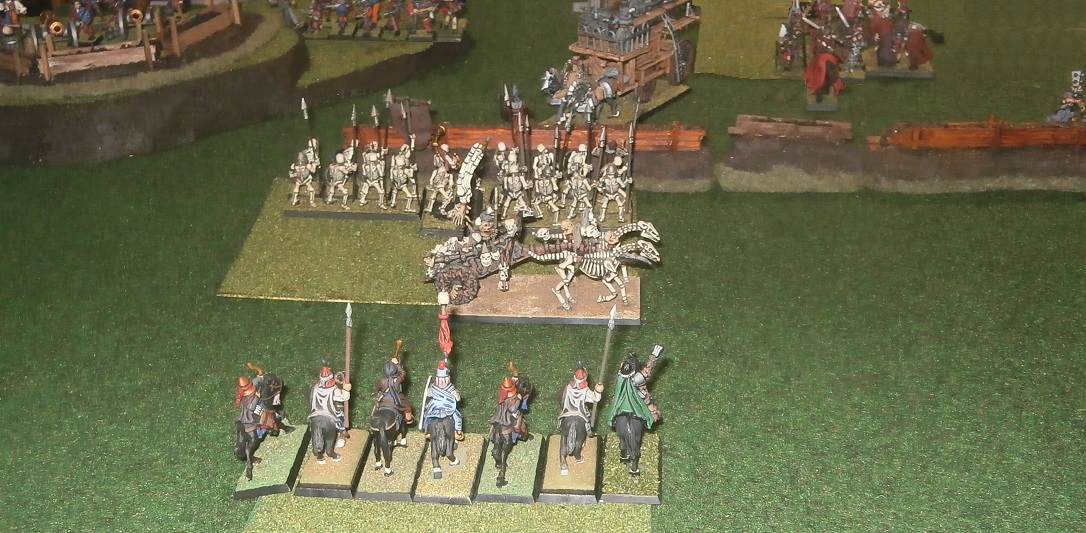
Maria now allowed a fury to course through her and she personally cut down six of the Remans. This, added to the bloody work done by Bernhardt and the knights, was too much for the Remans, and they turned to flee. Father Lorenzo was one of the first of them to be cut down in that flight, then Captain Vogel’s head was removed deftly by Bernhardt, while the remainder joined them in death soon enough.
As the crossbowmen on the hill wished they had run away when they had the chance, and the gunners abandoned their pieces to tumble pell-mell down the far slope, Barone Pietro suddenly realised that he and his men might be the only ones to escape the slaughter!
If, that is, they fled now.
Which is what they did.
End of turn 6
The Battle of the Isean Hills Continued
The great mob of ghouls, who now equalled the enemy’s regiment in size thanks to the brute Horrors’ attacks and the cultists own murderous flagellations to maintain their state of crazed frenzy, charged headlong into the defences.

Maria cantered without undue haste to the side of the hex-wraiths and watched as Captain Bernhardt and his knights turned to threaten the Reman soldiery within the camp.

Whilst the winds of magic proved little more than a gentle breeze, so that not one spell could be successfully conjured, the fight between the ghouls and the dedicants proved very bloody indeed. Seventeen dedicants dies in the initial assault, and eighteen ghouls! (Game Note: The ‘End is Nigh’ roll meant the dedicants could re-roll to hits and to wounds for their 38 (yup!) attacks. In light of this, perhaps 18 seems like a bad result!) Two more ghouls collapsed from the weakening of the magics that kept them whole.

Captain Vogel knew he had to act decisively, before the enemy riders could launch themselves at him and his men. But when he ordered a charge, his so-called professionals proved wanting, and the hesitant lurch that resulted meant that the initiative was lost. The vampire Bernhardt and his knights were already spurring their fleshless horses into action. Standing with the Remans, Father Lorenzo quickly realised that something had gone awry, and so prayed for Morr’s Holy Protection to be gifted upon the men with him. He sensed its power as it enfolded them.
Upon the bastion-battery on the Disciplinati’s right, the cannoneers had shoved packets of grape shot down their pieces’ muzzles, and now both guns blasted the skeletons below them, shattering seven. (Game Note: 10 + 10 shots, but with 8th ed rules, you have to roll to hit as well as wound.) The bony warriors barely noticed, which in truth was the case most of the time!
The broken machine trundled about behind the defences, it’s crew’s shame exacerbated by the knowledge it was highly unlikely they would ever to get the chance to prove themselves or their machine in future battles, due to the fact that they were almost certainly going to die in this one.

The Morrite dedicants fighting the ghouls, however, were so gripped with bloodlust that no such defeatist thoughts impinged upon their minds. They now slaughtered the last of the ghouls before them, to the loss of only one of their own to the foe’s vicious claws, but at a cost of two of their own to flagellation. The hexwraiths to their left, however, had cut down another four dedicants amongst their brother regiment, who despite their manic efforts could cause absolutely no harm in return. Meanwhil, Maria rode very close by as if nothing of consequence were occurring!

(Game Note: I was still amazed at what the hex-wraiths were doing, and could only imagine how frustrated I would have been about it if I had commanded the other side! BTW, we had toyed with the idea that the campaign player helping out by commanding an NPC army should command the undead, but as his player character, Lord Alessio Falconi, was currently engaged in a war against Maria’s servants in the south, it seemed only right that he should command here enemies in this game too!)
Maria was smiling, but there was not a soul alive who could see. She blew a kiss to Captain Bernhardt as he glanced at her upon the threshold of his charge, and then she joined him in hurtling headlong into Vogel’s hesitant Remans.

The Necromancer Saffiro had watched the slaughter of both the brute Horrors and the ghouls with interest and was now satisfied to see that only a few dedicants remained upon the defences. “My turn!” he thought to himself, then raised his hands to command his skeletons to charge.

In they went, scrabbling over the piles of corpses strewn before the barricade without a care in the world, to stab a veritable forest of spears at the poor, tired souls on the walls!

Before long there was but one cultist remaining. He stumbled back, his pointed hood so obscuring his sight that he had no idea he was the last. Whatever idea he did have, however, was his last.

While the Hexwraiths’ scythes continued their bounteous harvesting of souls …

… Maria fatally cursed four of the Remans, then momentarily lost control of her magic while resurrected the missing knight. She was only saved from injury by her magical wards. Several more Remans died to the vampires’ and knights’ blades, and two of the knights were cut down in return. Somehow, the Remans had survived the initial impact, but the situation did not look good.
As Maria’s fight went on, cannon balls were fired to little effect, more dedicants were hewn by the wraiths, and crossbpw bolts clattered ineffectually against the corpse cart. Barone Pietro and his company rode to the rear of the undead and watched, aghast, as the slaughter went on. The riders dreaded the thought of charging in. Luckily for them, the barone gave no such command.

Maria now allowed a fury to course through her and she personally cut down six of the Remans. This, added to the bloody work done by Bernhardt and the knights, was too much for the Remans, and they turned to flee. Father Lorenzo was one of the first of them to be cut down in that flight, then Captain Vogel’s head was removed deftly by Bernhardt, while the remainder joined them in death soon enough.
As the crossbowmen on the hill wished they had run away when they had the chance, and the gunners abandoned their pieces to tumble pell-mell down the far slope, Barone Pietro suddenly realised that he and his men might be the only ones to escape the slaughter!
If, that is, they fled now.
Which is what they did.
End of turn 6
symphonicpoet
Moderator
Oh my lord what an unholy slaughter! I hope you will forgive me if I find it almost . . . satisfactory, now that I've learned a little more of the history of the dedicati de Mors, or whatever the capped crusaders call themselves. Bloody awful lot! Truly a case of the lesser of two vile bunches, and I'm not sure I care to pick.
You do wonders to this game, sir! Very well planned and very well played. Your players are a lucky bunch indeed.
You do wonders to this game, sir! Very well planned and very well played. Your players are a lucky bunch indeed.
Stormbringer
Vassal
Padre":1az263dg said:
Please can you tell me what miniature that vampire bishop is?
Stormbringer
Vassal
Many thanks!
Padre
Lord
There’s More to Come
Luccini, Summer 2403
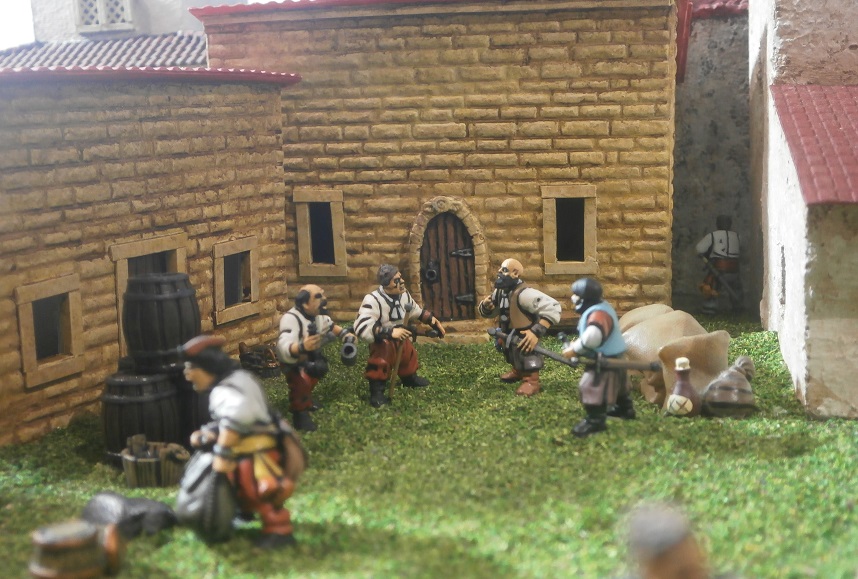
“Not bad, this stuff,” declared the Cooper Artur Scharff. In one hand he clutched a tankard, in the other a flask he had tapped some of the wine into so that they could all have a taste. Only the carpenter Gerino had refused, for he was distracted by a bottle of port he had found.
“Not bad at all. If the other barrels are as good, we should be selling this, not drinking it. With the price this’d fetch, we could buy five times its weight of the kind of wine our boys’d be happy with.”
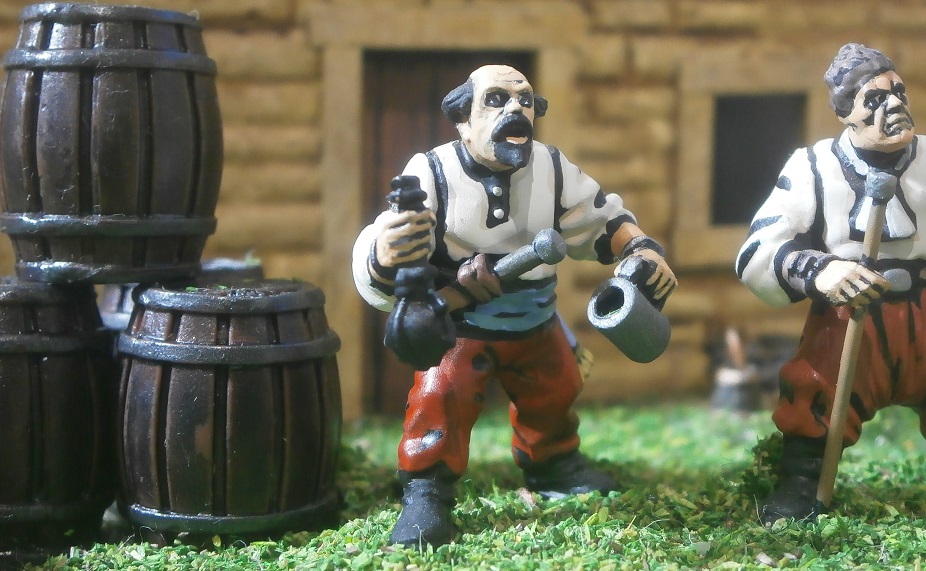
“You saying we’re cheap?” asked Geoberto. “’Cos I’ll have you know my palate is as sharp as any connoisseur’s when it comes to drink.”
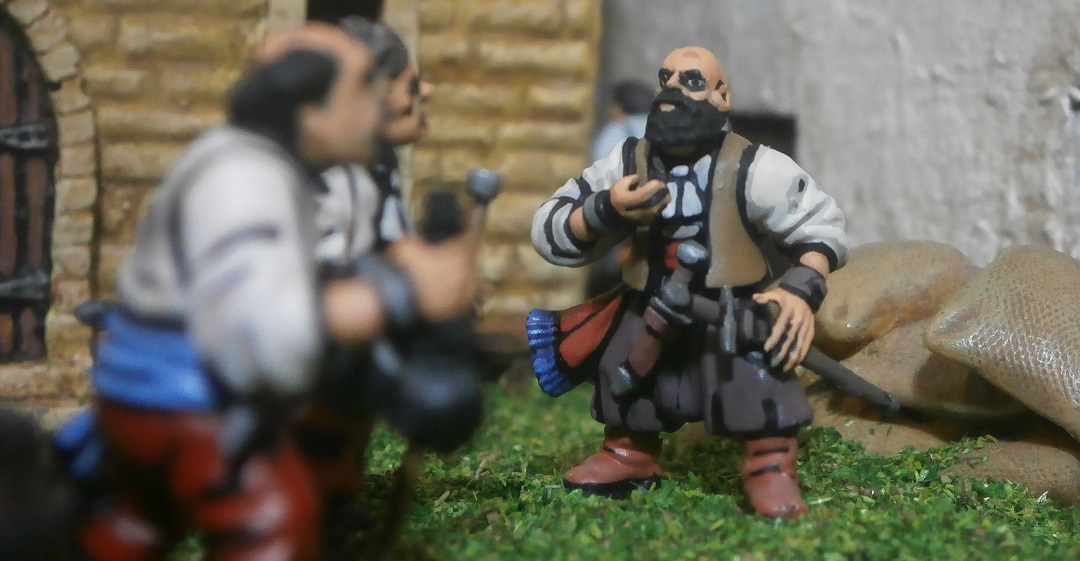
“You long since burnt away any palate you ever had with strong liquors,” laughed Artur. “Did for your hair too!”
“That was practice, long and hard,” said Geoberto, “which makes me the perfect drinker.”
They were discussing their ill-gotten gains on Luccini’s southern outskirts, where a wide path led from the city down to the Almond Sands. The city had a fine harbour, with wharves a-plenty for ships of every size, but it was guarded by two stone artillery bastions, so the Sartosan pirates had disembarked from boats on the sands then marched up to assault the city from the landward side. Now that Luccini was taken, most of the vessels had moved to the city harbour, but a couple of ships and their boats, those belonging to Captain Garique, had for reasons only the captain himself really knew, remained at the sands. Which was why Garique’s crew were trudging back and forth from the beach, hauling their considerable share of the loot on the way down.
Not all of them, though, just the younkers and the foremast men. The sea artists and officers were busy drinking and talking. Artur was sniffing the wine, then allowing it to roll around in his mouth before swallowing. The others were either humouring him or had failed to notice.
Artur stroked one of the barrels and nodded in appreciation of the cooper’s skill.
“Seems to me,” he declared, “that we’ve already taken enough loot to satisfy the captains. We could disperse the fleet right now and there’d be no one a-complainin’, no bitterness nor disappointment and only praise for the admiral. And we took it easy.”
“Tell that to Oskar Furst,” said Gerino, who had started listening. Some of the port he had been sampling a moment before was dribbling down his black beard.
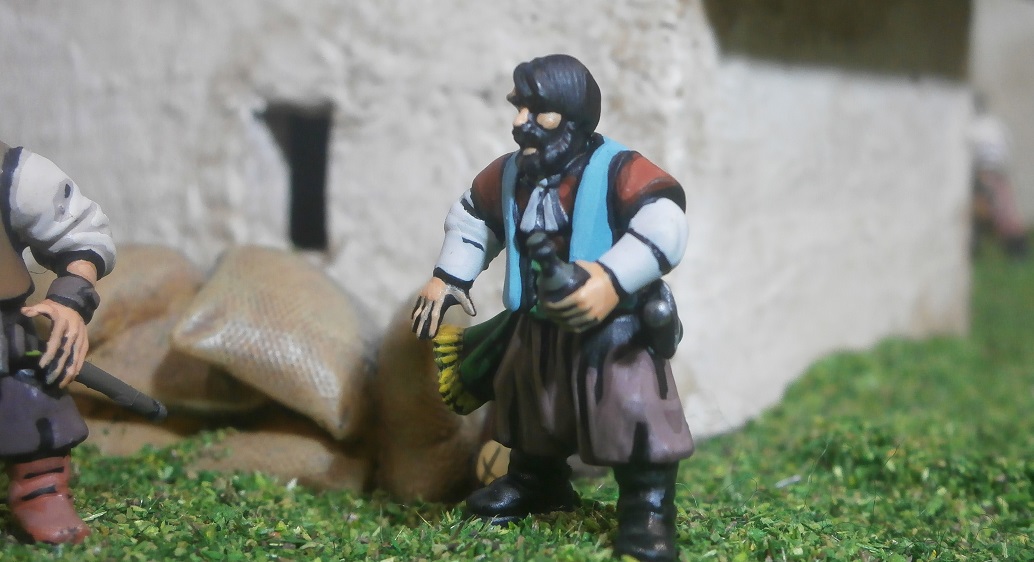
The admiral’s first mate, ironically named Furst, along with a number of Volker’s own crew, had died before the Sartosans even got off the beach, shot by a troop of Luccinan pistoleri left behind when the young king had marched off to war against the ogres.
“Someone was bound to be hurt,” said Artur. “You can’t expect to take a city like this without a little blood spilled. But think, if the king had been here with his army, however meagre it might be, there’d have been a lot more of us than Furst an’ a few of his lads piled at the garden’s gate.”
Geoberto laughed. “The pile’s big enough, what with all the Luccinans.”
“Their fault for arguing,” said the gunner, Isacco. “If they’d have had the sense to yield immediately, then everything would have turned out just the same, but they’d all be here to watch us.”
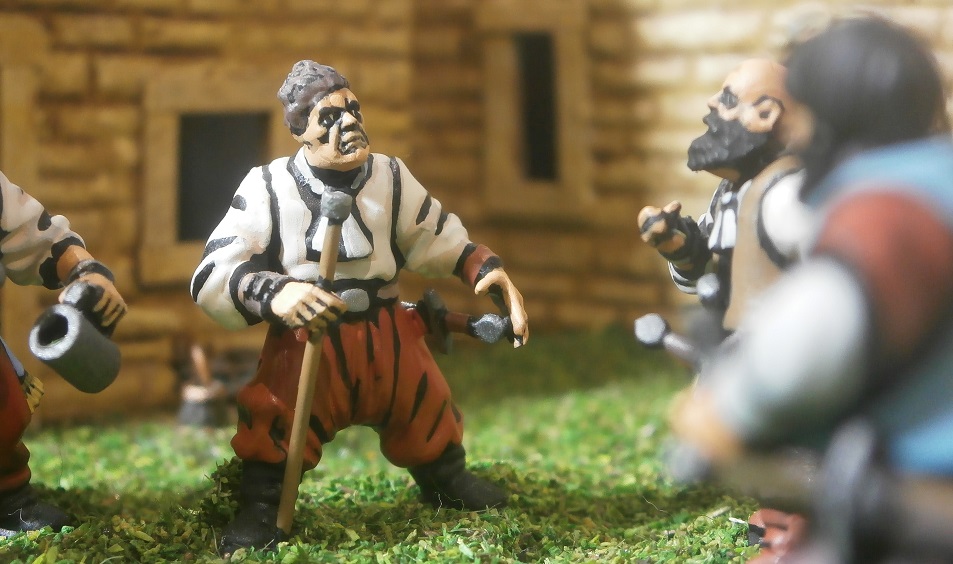
A pistol shot cracked from behind them, and they turned to look over the fence. One of Admiral Volker’s crewmen was responsible, from Furst’s watch, and was now stood over the man he’d killed.
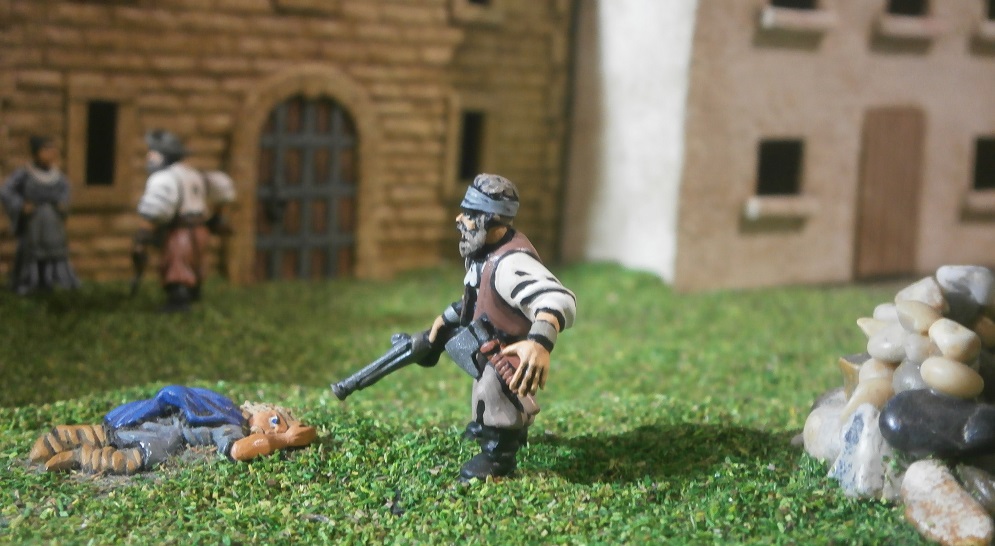
“Another fool arguing, no doubt,” said Isacco. “People should know when they’re beat, furl their sails and run before the wind.”
Isacco always had a sombre tone, a consequence of his somewhat pessimistic philosophy. It was said he had been a proper scallywag in his youth but had changed when a gun he was tending shivered and killed everyone around him, somehow leaving him with not a scratch, other than a missing toe.
“Maybe so,” said Geoberto, “But wouldn’t you complain a little if you were being robbed? There’s no need for real nastiness, just the show of it would suffice. We’re taking everything else they have. We could at least leave them with their lives.”
They watched as the shooter rolled the corpse over with his foot, perhaps to see if he was dead.
“Let the fellow grieve,” said Gerino. “Furst was well liked.”
Gerino took another swig from his bottle, and Artur drew some more wine from the tapped barrel.
“You said we should sell it, not drink it,” said Geoberto.
Artur looked up as the red fluid trickled into his flask. “Can’t sell this one, now it’s been tapped. There’s plenty more.”
“This is all our share, then?” asked Geoberto.
“It is. The captain made good choices when it came to laying claim to portions. We’ll get some carts to take this lot down to the beach.”
Gerino pointed down to where a little stream crossed the path. “They didn’t wait for a cart.”
Peering down, they could all see two fellows struggling with a barrel just on the other side of the water.
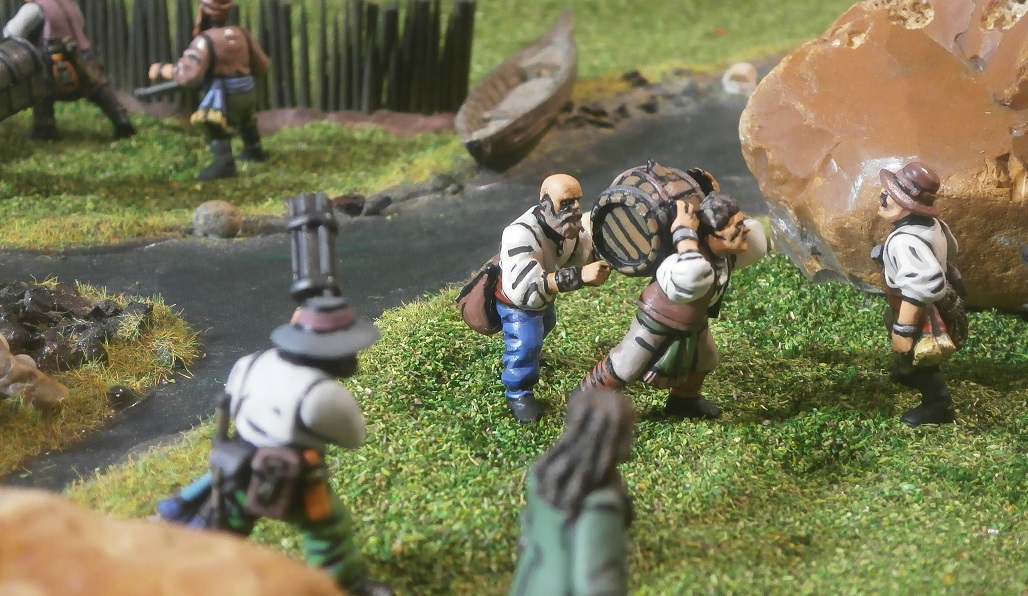
“That’s but a little one, and it ain’t the same vintage. Still, I’ll see to it that they’re the last to try that. If they drop the barrel it’ll ruin the wine even if it don’t break right open.”
“That one’ll be for the captain to drink,” said Geoberto. “They’ll not drop it. Not just now anyway, what with him so close. He took a barrel for his cabin last time.”
“As was proper,” said Artur. “It’s in the articles.”
They could all see Captain Garique standing near the two with the barrel, with Tito Álvares by his side, toting his beast of a gun.
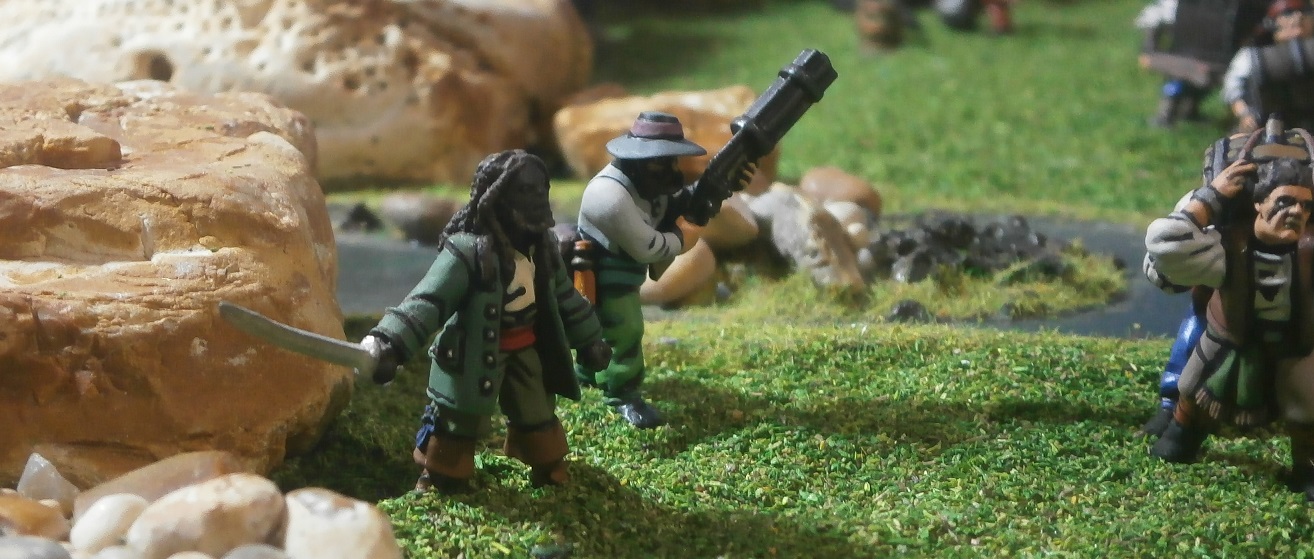
Garique had been supervising the removal of goods, utilising his unsheathed cutlass to point out which loot was to be carried next; ordering the tardy men to hurry up and those being careless to slow down. He was one of the oldest captains in the fleet, before that first mate to the admiral back when the admiral was only just elected captain himself. For some years he had been a captain in his own right, never once voted out, and well respected by his crew as a stickler for fairness (which was why it was only a small barrel he had taken for his own cabin). Bitter experience - the witnessing so much treachery, cheating and trickeries - had made him very suspicious of the other captains, even the admiral. Tito was often by his side, and thus Tito’s many-barrelled handgun, just in case a point needed making in no uncertain terms. It rarely did.
Garique’s share included much more than the wine. Several chests of precious metal and gems had been allotted to him, from which each of his crewmen expected their own shares.
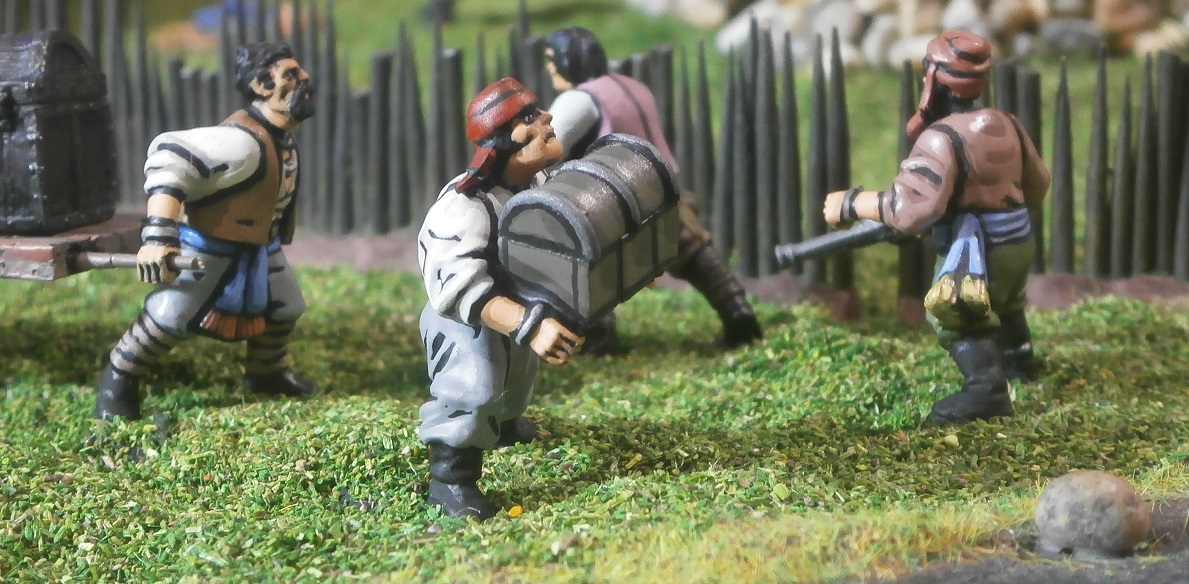
As per the articles, the captain would receive four shares in the prize, the sea artists and officers two, the sailors one and the boy (being only half a man) half a share. Some of the chests were huge, so big that a single man could no hope to lift them.

Those who were not lugging the loot were guarding its transit. The larger chests had blunderbuss and handgun armed escorts, while watchful sentinels were dotted all along the route.
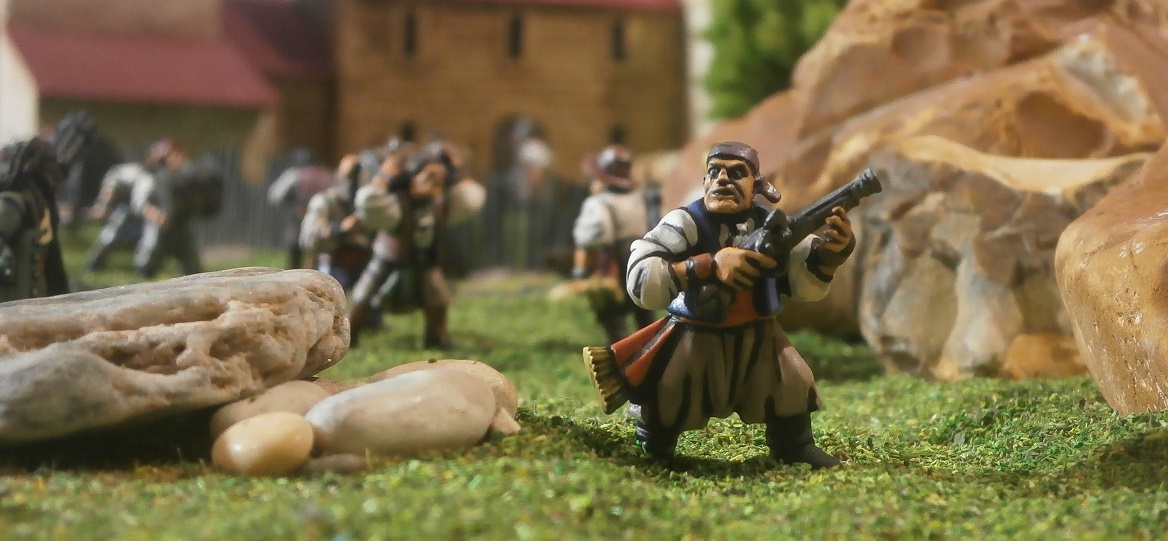
Luccini’s pistoliers had successfully scarpered after their brief assault, and so could conceivably return. As it was not known where exactly King Ferronso and his army were, no one could be sure he was not on his way home right now. Mostly, however, they were keeping an eye out for other Sartosans. Driven by greed and possessing of some flimsy excuse about gambling debts or compensation or some such, it was entirely possible that some other crews might choose to interrupt the loot’s journey to the sands.
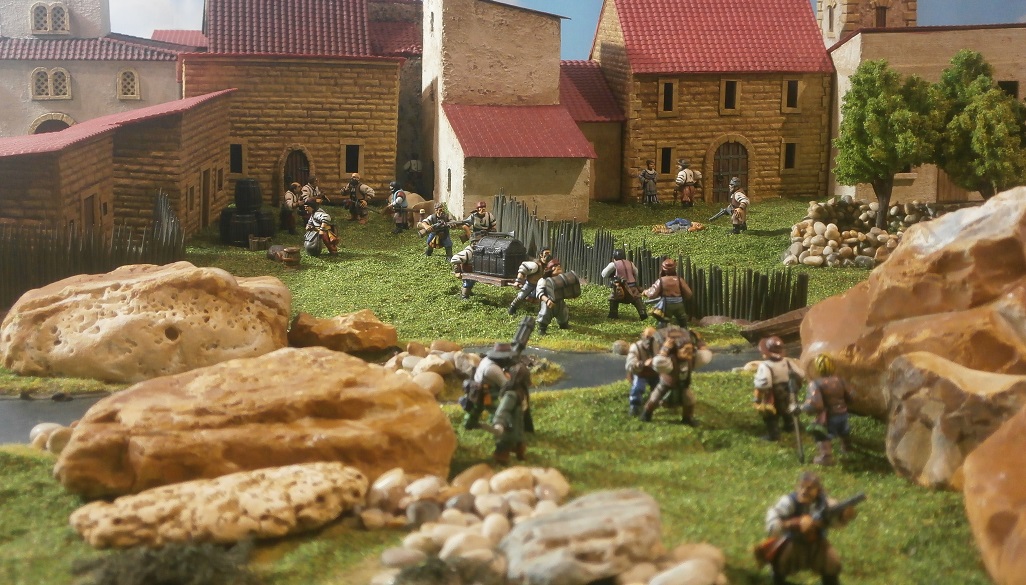
“The fleet’ll not be splitting up now, Artur,” said Isacco. “This has been just a taster of what’s to come. They say the brute Boulderguts took everything from the cities and towns inland, which leaves the coast all to us. I say Luccini was easy, and the next place will be easy too. The noble lords have taken their armies north. There’s nothing to stop us.”
“There might be plenty to stop us,” said Gerino. “I’ve been to Remas, and Portomaggiore and Alcente. They’re great powers. They can march an army away and still have an army at home if they choose to.”
“So where is next, then?” asked Geoberto.
Artur swallowed his biggest gulp yet. “You might be right about Alcente and Portomaggiore, Gerino," he said, "but Remas has been wracked by rebellion and riots, and has sent armies north, south and west. If the Remans have anything more than Luccini had to defend their walls I’ll eat my hat.”
“And wash it down with wine?” grinned Geoberto.
“It’s all about surprise,” said Isacco. “Remas is too obvious. Rich, old, battered to buggery, it’s where everyone will be expecting us to go. We could take somewhere smaller next. Maybe Volker knows we can take Alcente or Portomaggiore? Maybe we only took Luccini first because it was the closest?”
“Or the admiral wanted to try us out,” suggested Artur. “Flash our pans to make sure we’re ready for a real fight?”
Luccini, Summer 2403

“Not bad, this stuff,” declared the Cooper Artur Scharff. In one hand he clutched a tankard, in the other a flask he had tapped some of the wine into so that they could all have a taste. Only the carpenter Gerino had refused, for he was distracted by a bottle of port he had found.
“Not bad at all. If the other barrels are as good, we should be selling this, not drinking it. With the price this’d fetch, we could buy five times its weight of the kind of wine our boys’d be happy with.”

“You saying we’re cheap?” asked Geoberto. “’Cos I’ll have you know my palate is as sharp as any connoisseur’s when it comes to drink.”

“You long since burnt away any palate you ever had with strong liquors,” laughed Artur. “Did for your hair too!”
“That was practice, long and hard,” said Geoberto, “which makes me the perfect drinker.”
They were discussing their ill-gotten gains on Luccini’s southern outskirts, where a wide path led from the city down to the Almond Sands. The city had a fine harbour, with wharves a-plenty for ships of every size, but it was guarded by two stone artillery bastions, so the Sartosan pirates had disembarked from boats on the sands then marched up to assault the city from the landward side. Now that Luccini was taken, most of the vessels had moved to the city harbour, but a couple of ships and their boats, those belonging to Captain Garique, had for reasons only the captain himself really knew, remained at the sands. Which was why Garique’s crew were trudging back and forth from the beach, hauling their considerable share of the loot on the way down.
Not all of them, though, just the younkers and the foremast men. The sea artists and officers were busy drinking and talking. Artur was sniffing the wine, then allowing it to roll around in his mouth before swallowing. The others were either humouring him or had failed to notice.
Artur stroked one of the barrels and nodded in appreciation of the cooper’s skill.
“Seems to me,” he declared, “that we’ve already taken enough loot to satisfy the captains. We could disperse the fleet right now and there’d be no one a-complainin’, no bitterness nor disappointment and only praise for the admiral. And we took it easy.”
“Tell that to Oskar Furst,” said Gerino, who had started listening. Some of the port he had been sampling a moment before was dribbling down his black beard.

The admiral’s first mate, ironically named Furst, along with a number of Volker’s own crew, had died before the Sartosans even got off the beach, shot by a troop of Luccinan pistoleri left behind when the young king had marched off to war against the ogres.
“Someone was bound to be hurt,” said Artur. “You can’t expect to take a city like this without a little blood spilled. But think, if the king had been here with his army, however meagre it might be, there’d have been a lot more of us than Furst an’ a few of his lads piled at the garden’s gate.”
Geoberto laughed. “The pile’s big enough, what with all the Luccinans.”
“Their fault for arguing,” said the gunner, Isacco. “If they’d have had the sense to yield immediately, then everything would have turned out just the same, but they’d all be here to watch us.”

A pistol shot cracked from behind them, and they turned to look over the fence. One of Admiral Volker’s crewmen was responsible, from Furst’s watch, and was now stood over the man he’d killed.

“Another fool arguing, no doubt,” said Isacco. “People should know when they’re beat, furl their sails and run before the wind.”
Isacco always had a sombre tone, a consequence of his somewhat pessimistic philosophy. It was said he had been a proper scallywag in his youth but had changed when a gun he was tending shivered and killed everyone around him, somehow leaving him with not a scratch, other than a missing toe.
“Maybe so,” said Geoberto, “But wouldn’t you complain a little if you were being robbed? There’s no need for real nastiness, just the show of it would suffice. We’re taking everything else they have. We could at least leave them with their lives.”
They watched as the shooter rolled the corpse over with his foot, perhaps to see if he was dead.
“Let the fellow grieve,” said Gerino. “Furst was well liked.”
Gerino took another swig from his bottle, and Artur drew some more wine from the tapped barrel.
“You said we should sell it, not drink it,” said Geoberto.
Artur looked up as the red fluid trickled into his flask. “Can’t sell this one, now it’s been tapped. There’s plenty more.”
“This is all our share, then?” asked Geoberto.
“It is. The captain made good choices when it came to laying claim to portions. We’ll get some carts to take this lot down to the beach.”
Gerino pointed down to where a little stream crossed the path. “They didn’t wait for a cart.”
Peering down, they could all see two fellows struggling with a barrel just on the other side of the water.

“That’s but a little one, and it ain’t the same vintage. Still, I’ll see to it that they’re the last to try that. If they drop the barrel it’ll ruin the wine even if it don’t break right open.”
“That one’ll be for the captain to drink,” said Geoberto. “They’ll not drop it. Not just now anyway, what with him so close. He took a barrel for his cabin last time.”
“As was proper,” said Artur. “It’s in the articles.”
They could all see Captain Garique standing near the two with the barrel, with Tito Álvares by his side, toting his beast of a gun.

Garique had been supervising the removal of goods, utilising his unsheathed cutlass to point out which loot was to be carried next; ordering the tardy men to hurry up and those being careless to slow down. He was one of the oldest captains in the fleet, before that first mate to the admiral back when the admiral was only just elected captain himself. For some years he had been a captain in his own right, never once voted out, and well respected by his crew as a stickler for fairness (which was why it was only a small barrel he had taken for his own cabin). Bitter experience - the witnessing so much treachery, cheating and trickeries - had made him very suspicious of the other captains, even the admiral. Tito was often by his side, and thus Tito’s many-barrelled handgun, just in case a point needed making in no uncertain terms. It rarely did.
Garique’s share included much more than the wine. Several chests of precious metal and gems had been allotted to him, from which each of his crewmen expected their own shares.

As per the articles, the captain would receive four shares in the prize, the sea artists and officers two, the sailors one and the boy (being only half a man) half a share. Some of the chests were huge, so big that a single man could no hope to lift them.

Those who were not lugging the loot were guarding its transit. The larger chests had blunderbuss and handgun armed escorts, while watchful sentinels were dotted all along the route.

Luccini’s pistoliers had successfully scarpered after their brief assault, and so could conceivably return. As it was not known where exactly King Ferronso and his army were, no one could be sure he was not on his way home right now. Mostly, however, they were keeping an eye out for other Sartosans. Driven by greed and possessing of some flimsy excuse about gambling debts or compensation or some such, it was entirely possible that some other crews might choose to interrupt the loot’s journey to the sands.

“The fleet’ll not be splitting up now, Artur,” said Isacco. “This has been just a taster of what’s to come. They say the brute Boulderguts took everything from the cities and towns inland, which leaves the coast all to us. I say Luccini was easy, and the next place will be easy too. The noble lords have taken their armies north. There’s nothing to stop us.”
“There might be plenty to stop us,” said Gerino. “I’ve been to Remas, and Portomaggiore and Alcente. They’re great powers. They can march an army away and still have an army at home if they choose to.”
“So where is next, then?” asked Geoberto.
Artur swallowed his biggest gulp yet. “You might be right about Alcente and Portomaggiore, Gerino," he said, "but Remas has been wracked by rebellion and riots, and has sent armies north, south and west. If the Remans have anything more than Luccini had to defend their walls I’ll eat my hat.”
“And wash it down with wine?” grinned Geoberto.
“It’s all about surprise,” said Isacco. “Remas is too obvious. Rich, old, battered to buggery, it’s where everyone will be expecting us to go. We could take somewhere smaller next. Maybe Volker knows we can take Alcente or Portomaggiore? Maybe we only took Luccini first because it was the closest?”
“Or the admiral wanted to try us out,” suggested Artur. “Flash our pans to make sure we’re ready for a real fight?”
Lands Annex
Vassal
Superb as always Padre, loving this sea-salty story as an aside to the slaughter on the field. Love that Garique model too!
Padre
Lord
Yeah, LA, I too like that model muchly.
Now for another 'activation' introduction story ...
The Message-Letter
Somewhere in Tilea.
Three of the Grey Seer’s servants were making their hurried way to him. For an otherwise abandoned stretch of tunnel, there was a lot of noise as they progressed, what with the crunching of the gravel beneath their feet, the clattering of the lantern the servant Bolk held aloft to illuminate their passage, and the strained wheezing sound of Gradger’s mask-assisted breathing. All this was amplified by the close stone walls around them, conjoining and reverberating, so that when they did speak they had to shout – or, more accurately, squeal.
“Your message-letter, Farrgrin, important is it? Yes, yes?”
“Never look, never read, just carry. That is my task-burden. Not for my eyes, see?” Farrgrin glanced back to indicate that they were being watched even now, for Bolk had more responsibility than merely lugging the lantern. Whether or not Gradger, his vision restricted by the small, thick glass lenses of his mask, noticed the gesture, Farrgrin did not know.
“Has to be important. It is for the lord-master. He will not look upon petty gossip and chatter-drivel.”
“You are asking what you should not be asking,” snapped Farrgrin. “Best be silent, or I might suspect-believe you to be a spy-traitor.”
“Not-ever I,” said Gradger. “Always obey, never shirking.”
“Well and good, best for all,” declared Farrgrin, nevertheless tightening his clutch upon the scroll.
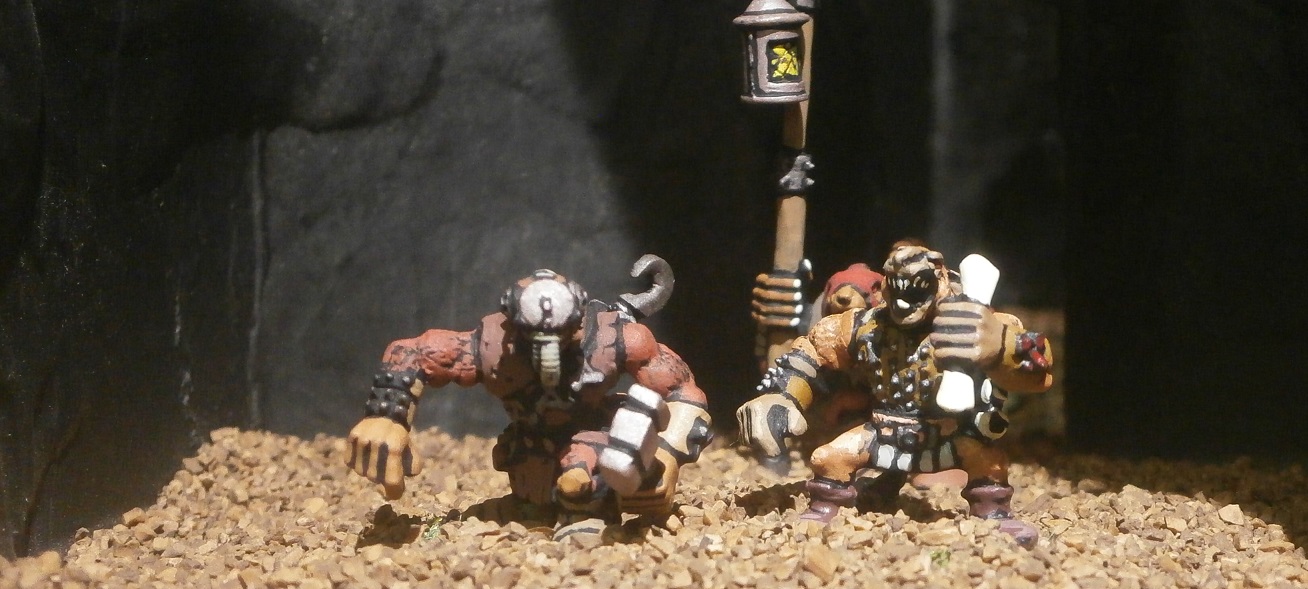
They were in one of the lesser tunnels, leading from a little used exit. There were no breeding pits, slave pens, mine entrances or fungus caverns along this stretch, and nor had there ever been. Perhaps it had originally been intended as a sally port, or an emergency escape route? Farrgrin cared not, to him it was simply a satisfactorily secretive option.
Gradger’s mask let out a strained hiss as he took a deep intake of breath, and Farrgrin knew another comment would follow.
“I ask-enquire only because of Josgrach,” he said. “His was important news - the collapse, shoddy work-failings, fools in charge - which angered the lord-master. Rightly so, yes, yes, rightly so. Important news it was and the end of Josgrach. Bearer of bad tidings and killed-dead because of it.”
“It is not-ever for us to question the lord-master,” said Farrgrin.
“But yet what of us, I ask and plead, if this is grave and disturbing news? Are we to be blame-punished for the mere carrying of it?”
“The lord-master knows-sees that which we cannot. Failings, you said? Perhaps Josgrach failed, see? Late-delayed, or talk-chattering too much, see?”
Farrgrin picked up the pace a little, and began to outstrip Gradger, running almost beyond the limit if the lantern’s light.
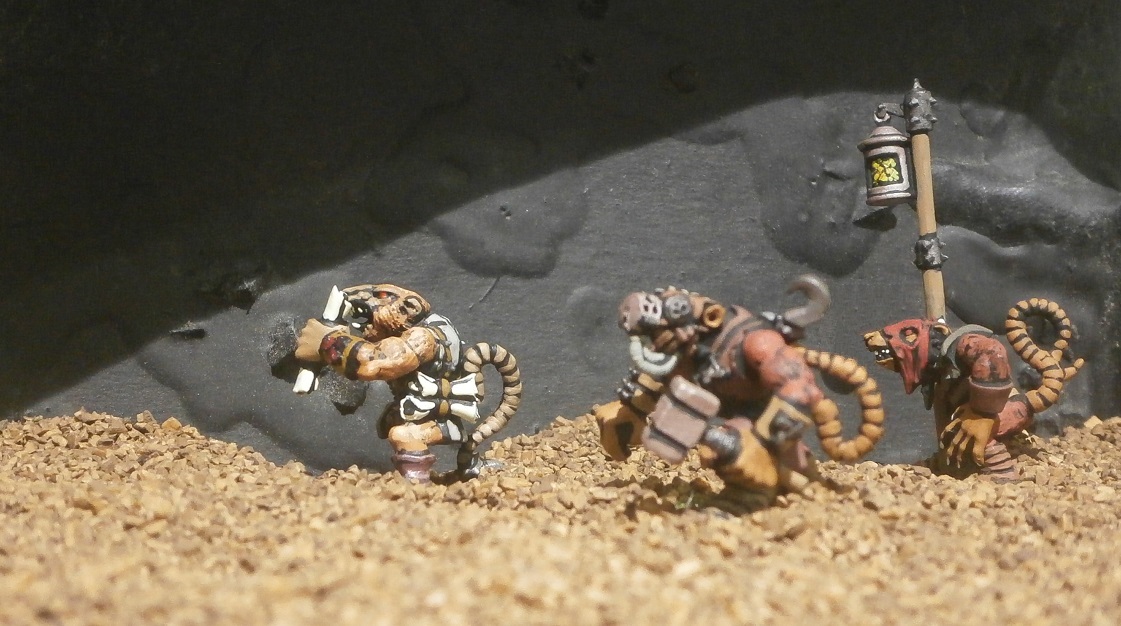
“Listen well, listen hard, understand,” he continued. “Learn from Josgrach’s fate, not fear, but sense. What is important is that we carry this message-letter prompt, quick, secret. So keep up! And shut up! See?”
They were approaching the end of the tunnel, where it met with a well-used passageway close to the Grey Seer’s cavern-chambers.
“Here, now, the guards,” hissed Farrgrin. “Remember my advice-words and live.”
Gradger allowed himself to drop back further, so that Bolk was between him and Farrgrin. A moment later they rounded the bend to the junction.
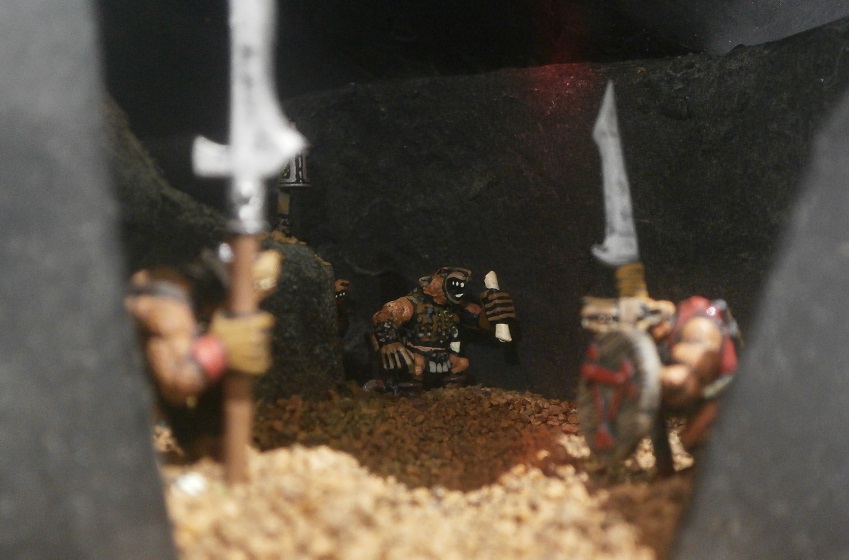
Now for another 'activation' introduction story ...
The Message-Letter
Somewhere in Tilea.
Three of the Grey Seer’s servants were making their hurried way to him. For an otherwise abandoned stretch of tunnel, there was a lot of noise as they progressed, what with the crunching of the gravel beneath their feet, the clattering of the lantern the servant Bolk held aloft to illuminate their passage, and the strained wheezing sound of Gradger’s mask-assisted breathing. All this was amplified by the close stone walls around them, conjoining and reverberating, so that when they did speak they had to shout – or, more accurately, squeal.
“Your message-letter, Farrgrin, important is it? Yes, yes?”
“Never look, never read, just carry. That is my task-burden. Not for my eyes, see?” Farrgrin glanced back to indicate that they were being watched even now, for Bolk had more responsibility than merely lugging the lantern. Whether or not Gradger, his vision restricted by the small, thick glass lenses of his mask, noticed the gesture, Farrgrin did not know.
“Has to be important. It is for the lord-master. He will not look upon petty gossip and chatter-drivel.”
“You are asking what you should not be asking,” snapped Farrgrin. “Best be silent, or I might suspect-believe you to be a spy-traitor.”
“Not-ever I,” said Gradger. “Always obey, never shirking.”
“Well and good, best for all,” declared Farrgrin, nevertheless tightening his clutch upon the scroll.

They were in one of the lesser tunnels, leading from a little used exit. There were no breeding pits, slave pens, mine entrances or fungus caverns along this stretch, and nor had there ever been. Perhaps it had originally been intended as a sally port, or an emergency escape route? Farrgrin cared not, to him it was simply a satisfactorily secretive option.
Gradger’s mask let out a strained hiss as he took a deep intake of breath, and Farrgrin knew another comment would follow.
“I ask-enquire only because of Josgrach,” he said. “His was important news - the collapse, shoddy work-failings, fools in charge - which angered the lord-master. Rightly so, yes, yes, rightly so. Important news it was and the end of Josgrach. Bearer of bad tidings and killed-dead because of it.”
“It is not-ever for us to question the lord-master,” said Farrgrin.
“But yet what of us, I ask and plead, if this is grave and disturbing news? Are we to be blame-punished for the mere carrying of it?”
“The lord-master knows-sees that which we cannot. Failings, you said? Perhaps Josgrach failed, see? Late-delayed, or talk-chattering too much, see?”
Farrgrin picked up the pace a little, and began to outstrip Gradger, running almost beyond the limit if the lantern’s light.

“Listen well, listen hard, understand,” he continued. “Learn from Josgrach’s fate, not fear, but sense. What is important is that we carry this message-letter prompt, quick, secret. So keep up! And shut up! See?”
They were approaching the end of the tunnel, where it met with a well-used passageway close to the Grey Seer’s cavern-chambers.
“Here, now, the guards,” hissed Farrgrin. “Remember my advice-words and live.”
Gradger allowed himself to drop back further, so that Bolk was between him and Farrgrin. A moment later they rounded the bend to the junction.

Lands Annex
Vassal
Yes! I've been awaiting the arrival of the vermin for ages! Brilliant, can't wait to see what dastardly things they are up to.
Padre
Lord
You think they're gonna be dastardly, Lands Annex? Get a load of this ...
A Letter Sent to Many, Autumn IC 2403
This to be sent to all the legitimate and honourable rulers of Tilea, for their better understanding of the foul Treachery performed at Verezzo this Autumn of the Year IC 2403 and furthermore so they may know how the Lord of Pavona, His Grace Duke Guidobaldo Gondi, has offered his help and protection to all the citizens of that realm in their time of dire need and great sorrow.
Upon returning from Remas and having learned from his subjects of the discovery of the remains of a camp near unto Scozzese, the Duke rode post-haste from the security of his ancient and noble city of Pavona with his gentlemen at arms in order to investigate. It was quickly apparent that goblins had indeed utilised the camp in question, without a doubt the same force that held Scozzese to ransom by threat of destruction whilst the noble duke was abroad leading the pursuit of the tyrant Boulderguts. Keen to exact retribution for their actions, and to cleanse Tilea of their kind so that no more realms might suffer at their foul hands, and without a care for the meagre size of his own force, Duke Guidobaldo rode forthwith in pursuit.
The trail led unto the realm of Verezzo, and when Duke Guidobaldo’s outriders reported encountering several many citizens fleeing from the realm, the noble lord of Pavona feared that the goblins had already set upon this realm in a similar manner, perhaps this time employing the violence they had threatened against defenceless Scozzese. Upon questioning the Verezzan citizens, however, it became clear that a quite different crime had been perpetrated.
Here is the full and horrible nature of the account Duke received.
A force, clad in the blue and white livery and flying the colours of Portomaggiore, had arrived at the outlying estates to the north of the city of Verezzo to announce they were there to take the supplies promised by Lord Lucca Vescussi. They claimed Lord Lucca was still with the grand alliance army near Trantio, engaged in the war against the vampires, but that his orders were clear - that the army of Portomaggiore was permitted by his command to take all it needed for its sustenance during this time of war, in return for the protection it was providing the realm. The citizens complained that they themselves had been given no instructions to give anything at all to the Portomaggiorans, only that they should provide the army of the VMC with the supplies stockpiled for that very purpose, which indeed they had done only two weeks previously, and furthermore the Lord Lucca had already returned to their realm a week before. The soldiers scoffed at these claims, redoubled their demands, and then began violently plundering everything of worth and value they could lay their brutal hands upon.

News quickly reached Lord Lucca, ruler of Verezzo, who gathered what little force remained in his realm after his considerable contribution to the army of the Grand Alliance and rode out to face the robbers in battle.
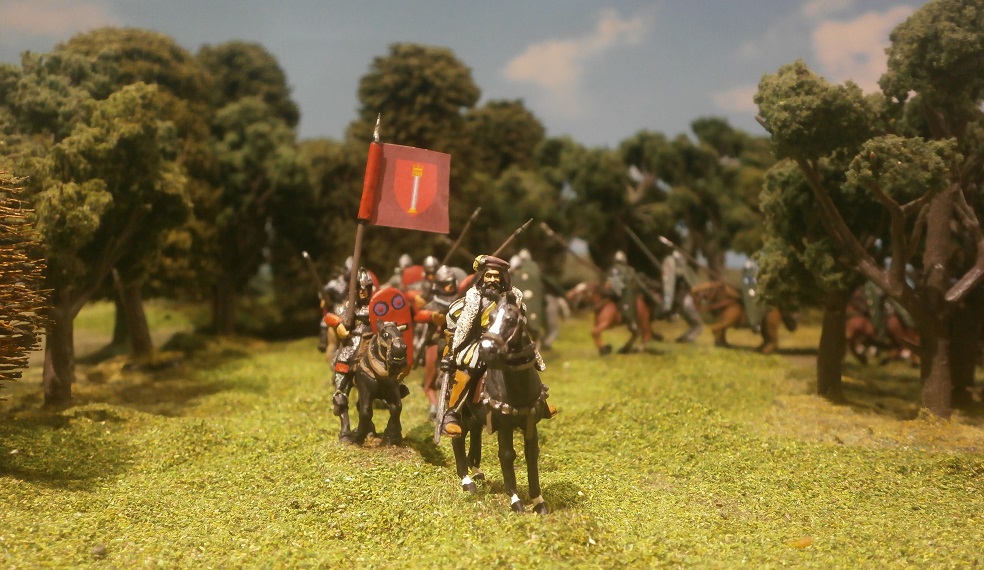
As well as his riders, being light horsemen from a wild region of the Border Princes who had served him for many a year and were glad to dwell in a more civilised land, he had a company of crossbowmen, stout citizen militia all, and the one gun remaining in his small arsenal, being an ancient piece kept serviceable despite its archaic nature. He also sent word to the halfling soldiers remaining in Terrene that they should move as rapidly as possible to support his small force.
Upon arriving, he found a not inconsiderable force of what appeared to be Portomaggiorans arrayed before him, including a large body of brigand-bravi flying the personal banner of Lord Alessio Falconi - presumably a part of Falconi’s not inconsiderable household forces …

… as well as a body of mercenary crossbowmen, apparently Arabyan (perhaps a remnant of Gedik Mamidous’ Sons of the Desert left behind in Tilea?) The latter, by their very nature, might be expected to behave in such a manner, but then Lord Lucca saw, to his horror, that among the robbers was a body of mounted men-at-arms, liveried in the blue and white of Portomaggiore, well-armed, armoured and mounted upon horses of quality.
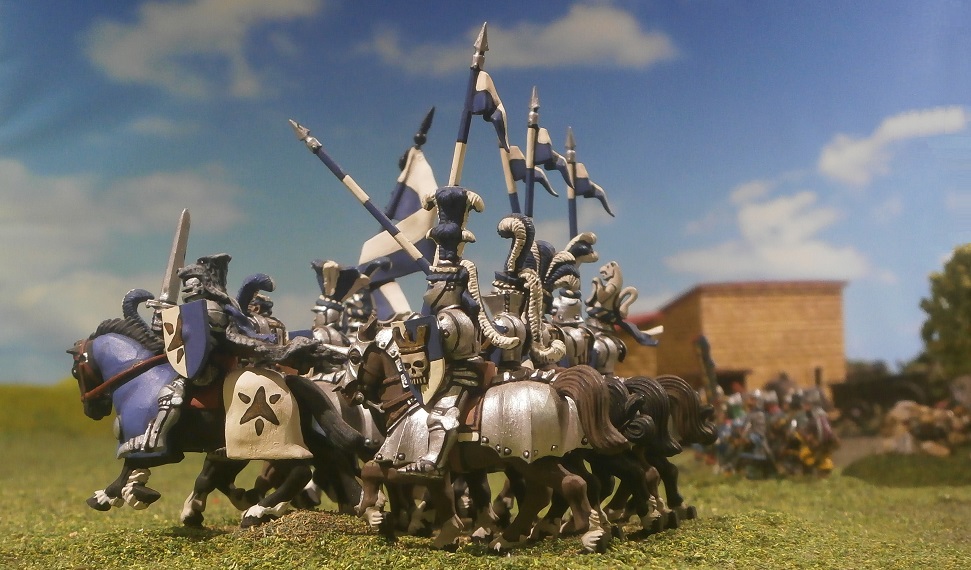
That gentlemen might stoop to such wicked and ignoble action was offensive to Lord Lucca, as it subsequently seemed indeed to Duke Guidobaldo when he first heard the report. If only our two realms, Pavona and Portomaggiore, had been granted differing liveries by history? Here was an action that demeaned the colours blue and white. Only pride, well earned, prevented our Duke from declaring then and there that he would change the livery of his own soldiers, for he knew full well that if any should change, it ought to be the Portomaggiorans, for it was they by their own actions (or so it seemed at that time) who had disgraced their livery.
Lord Lucca’s crossbowmen came on as best they could, to support the fast-moving lord and his body of light horse …
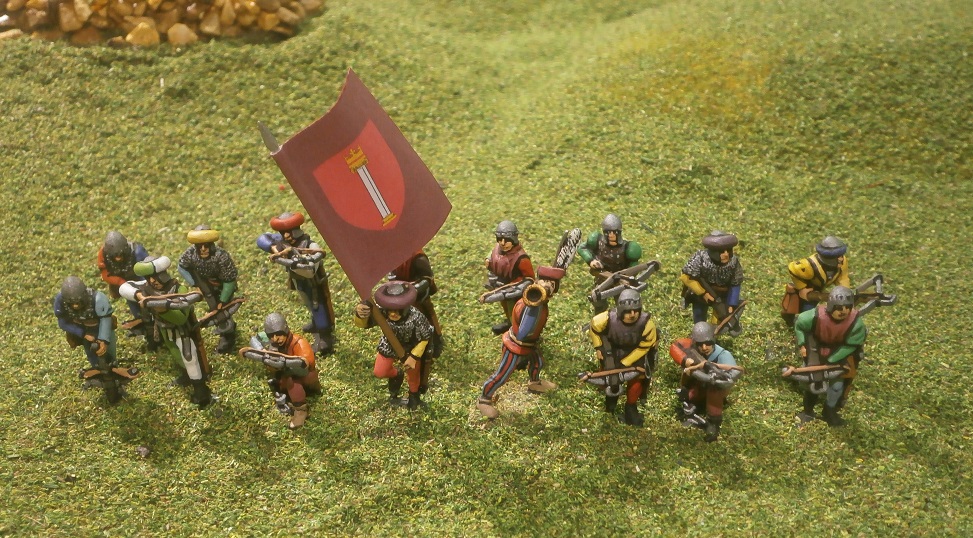
… but the Arabyans cut down many of them before they could even span their weapons. In return, the old cannon felled two of the enemy’s heavy horsemen, their armour as butter to a ball of iron, no matter how old the piece that hurled it!

Knowing he and his light horse could not hope to prevail in direct combat against such armoured riders as the enemy possessed, Lord Lucca led his men in a merry dance against the foe, adding their own short-bow arrows to the quarrels and round-shot of the rest of his force, buying time so that when the halflings arrived, led by the famous ‘Pettirosso’ himself, Roberto Cappuccio, the battle was still yet to be decided.
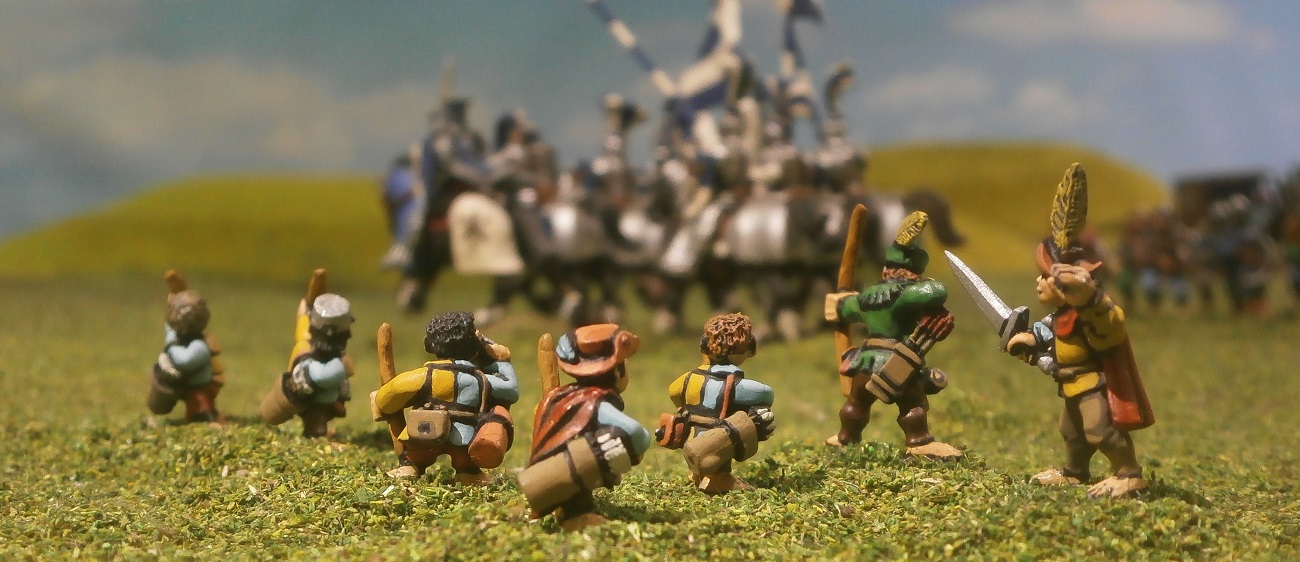
More of the enemy’s riders fell as the halfling’s proved their skill at archery, and while the regular archers of Terrene engaged in an exchange of arrows with the Arabyans …

… the bravi carrying Lord Alessio’s banner were badly stung by the Verezzan crossbowmen and turned to flee! The halflings, made bold by their successes, advanced, only to be severely mauled by the piercing power of the Arabyans’ quarrels. Faltering, they could only watch with horror as the enemy’s mounted men at arms charged and destroyed the Verezzan crossbowmen. Just when the old cannon was needed, when the enemy had revealed the flank of their body to its muzzle, it failed to fire. The desperate crew managed to make it ready again and it did successfully fire, but its ball overshot the foe. The men at arms, perhaps angered by what it had done to them earlier in the fight, now charged the cannon itself and mercilessly cut down the crew.
Lord Lucca, seeing his crossbowmen and artillery piece destroyed, and his brave halflings falling upon the flank, suddenly saw an opportunity to inflict hurt and charged the bravi who had rallied and reformed close enough for him to reach. Once again they fled, as soon as he launched his charge, and he soon realised his error, for in attempting to close upon the foe he had opened his riders to a charge from the enemy’s remaining mounted men at arms.
His pursuit faltered as he attempted to regain order, then turned to flight when the enemy did indeed come thundering towards him. He and his light horse, who would normally have easily outstripped such a heavily armoured foe, where so disordered by casualties, and his attempt to stop their charge against the bravi, that they could not escape, and to a man, the noble Lord Lucca included, they were hacked down and trampled into the dirt.
And so Lord Lucca was killed, in an act of foul treachery, whilst fighting to save his citizens from thieves and murderers.
Made furious by what he had heard, Duke Guidobaldo rode immediately onwards in the hope of closing with the supposed Portomaggiorans himself, but they had fled away quickly, proving themselves to be base cowards, and he found only one of them remaining, a fool who could barely stand for having drunk too much of that which his comrades had looted. When this man was questioned, the truth was revealed, and it was no less horrible than that which had been believed before.
The looters were not Portomaggiorans at all, but rather had deliberately disguised themselves as such. They were hired-soldiers of the VMC, who had most likely been sent thither to stir up dissension between Tilean states by their cruel actions, and at the same time to take more than that which had been agreed. Northerners are well known for their grasping greed, being in many ways no better than Sartosan pirates, only dressing up most of their robberies as trade, with papers, tickets and receipts to mask its true nature.
Here they had gone one terrible step further, for they had dressed themselves as Portomaggiorans, even unto carrying Lord Alessio’s banner, so that they might rob the Verezzans, despite having declared themselves to be allies of both states and willing to march north to assist them against brutes and vampires. In truth, they had come, as they came last year to Camponeffro in the realm of Raverno, to raze and plunder, rape and murder.
Either that, or the officers of the VMC had already lost control of a significant portion of their mercenary forces? Perhaps their obsession with profit had led them to cut corners and hire scum little better than corsairs and outlawed bravi?
Whatever the truth, whatever the VMC soldiers’ motivations, Duke Guidobaldo knew that he could not leave the citizens of Verezzo leaderless and without military protection. Not only would they be open to further abuses at the hands of possibly rogue VMC soldiery, but also in this time of war against vampires, brutes and even scavenging goblins, they might suffer at the hands of a multitude of others. He also knew that after the ravaging of his own realm, the battering of his own army, and the fact that his son was fighting with the grand alliance in command of most of Pavona’s soldiery, that he had entirely insufficient forces to guard both Pavona and Verezzo effectively, and so he has offered the citizens shelter in his own realm, being welcome to settle in the ruined villages and towns left in the wake of Boulderguts’ rampage, thus re-populating those settlements.
Furthermore, Duke Guidobaldo even has in his possession a letter from Lord Vescucci in which the Verezzan ruler proposed that the two of them ought to lay aside all past grievances so that they might more effectively support each other in the mutual defence of their realms in this time of emergency. Having received this touched the Duke’s heart, especially as Lord Lucca most likely lay dead before the Duke even read his word. And his sadness was magnified by the plight of the poor people of Verezzo.
So it is that right now the people of Verezzo, their goods and chattels, their livestock and servants, are being encouraged to travel to the safety of Pavona, so that they might both survive and prosper under the protective care of Duke Guidobaldo.
All praise be given to the great god Morr, whose embrace will comfort us through the long aeons after our lives, for his working through his servant, Duke Guidobaldo Gondi, to ensure the people are so comforted even before they part this mortal coil.
…
Appendix
We played the battle, but I decided to recreate more artistic pics of certain moments and units rather than use the in-game pics. Instead I used the in-game pics as memory aids to help me set up the 'arty' pictures and to write the story of the fight. I laying casualties down etc before photographing = so that the pics told me what happened rather than the scribbled notes I usually faff about with. This technique helped me to play the game without too many distractions. (I played the NPC Verezzans.)
Also, we decided that as it was a small game (approx. 1000pts vs. approx. 750 pts) and because we had the time available (zipping through the turns with so few units and no magic) that we would play to the obvious end of the battle. As a consequence the game lasted 8 turns.
Here are a few actual in game pics, in order …
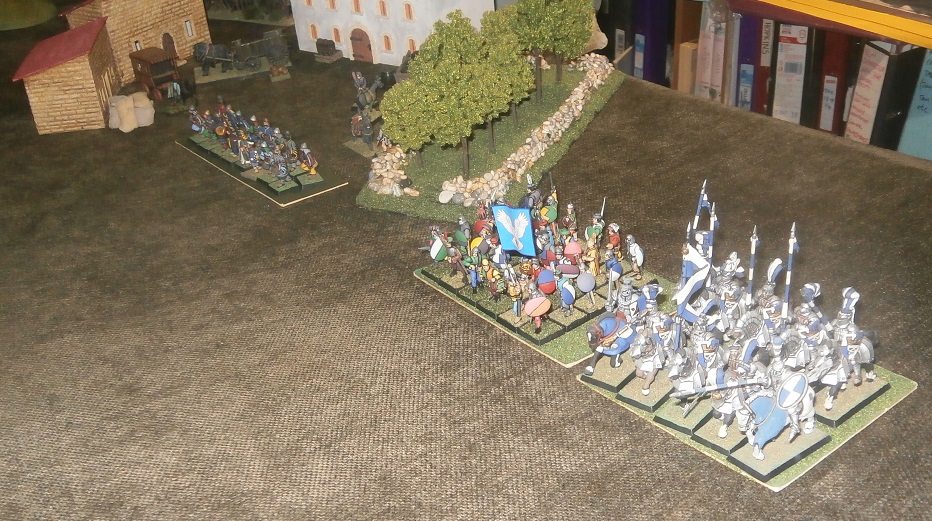







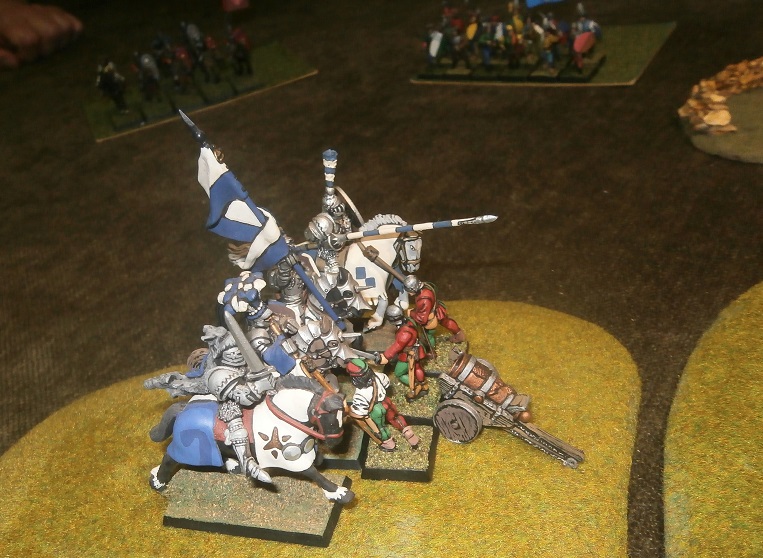

A Letter Sent to Many, Autumn IC 2403
This to be sent to all the legitimate and honourable rulers of Tilea, for their better understanding of the foul Treachery performed at Verezzo this Autumn of the Year IC 2403 and furthermore so they may know how the Lord of Pavona, His Grace Duke Guidobaldo Gondi, has offered his help and protection to all the citizens of that realm in their time of dire need and great sorrow.
Upon returning from Remas and having learned from his subjects of the discovery of the remains of a camp near unto Scozzese, the Duke rode post-haste from the security of his ancient and noble city of Pavona with his gentlemen at arms in order to investigate. It was quickly apparent that goblins had indeed utilised the camp in question, without a doubt the same force that held Scozzese to ransom by threat of destruction whilst the noble duke was abroad leading the pursuit of the tyrant Boulderguts. Keen to exact retribution for their actions, and to cleanse Tilea of their kind so that no more realms might suffer at their foul hands, and without a care for the meagre size of his own force, Duke Guidobaldo rode forthwith in pursuit.
The trail led unto the realm of Verezzo, and when Duke Guidobaldo’s outriders reported encountering several many citizens fleeing from the realm, the noble lord of Pavona feared that the goblins had already set upon this realm in a similar manner, perhaps this time employing the violence they had threatened against defenceless Scozzese. Upon questioning the Verezzan citizens, however, it became clear that a quite different crime had been perpetrated.
Here is the full and horrible nature of the account Duke received.
A force, clad in the blue and white livery and flying the colours of Portomaggiore, had arrived at the outlying estates to the north of the city of Verezzo to announce they were there to take the supplies promised by Lord Lucca Vescussi. They claimed Lord Lucca was still with the grand alliance army near Trantio, engaged in the war against the vampires, but that his orders were clear - that the army of Portomaggiore was permitted by his command to take all it needed for its sustenance during this time of war, in return for the protection it was providing the realm. The citizens complained that they themselves had been given no instructions to give anything at all to the Portomaggiorans, only that they should provide the army of the VMC with the supplies stockpiled for that very purpose, which indeed they had done only two weeks previously, and furthermore the Lord Lucca had already returned to their realm a week before. The soldiers scoffed at these claims, redoubled their demands, and then began violently plundering everything of worth and value they could lay their brutal hands upon.

News quickly reached Lord Lucca, ruler of Verezzo, who gathered what little force remained in his realm after his considerable contribution to the army of the Grand Alliance and rode out to face the robbers in battle.

As well as his riders, being light horsemen from a wild region of the Border Princes who had served him for many a year and were glad to dwell in a more civilised land, he had a company of crossbowmen, stout citizen militia all, and the one gun remaining in his small arsenal, being an ancient piece kept serviceable despite its archaic nature. He also sent word to the halfling soldiers remaining in Terrene that they should move as rapidly as possible to support his small force.
Upon arriving, he found a not inconsiderable force of what appeared to be Portomaggiorans arrayed before him, including a large body of brigand-bravi flying the personal banner of Lord Alessio Falconi - presumably a part of Falconi’s not inconsiderable household forces …

… as well as a body of mercenary crossbowmen, apparently Arabyan (perhaps a remnant of Gedik Mamidous’ Sons of the Desert left behind in Tilea?) The latter, by their very nature, might be expected to behave in such a manner, but then Lord Lucca saw, to his horror, that among the robbers was a body of mounted men-at-arms, liveried in the blue and white of Portomaggiore, well-armed, armoured and mounted upon horses of quality.

That gentlemen might stoop to such wicked and ignoble action was offensive to Lord Lucca, as it subsequently seemed indeed to Duke Guidobaldo when he first heard the report. If only our two realms, Pavona and Portomaggiore, had been granted differing liveries by history? Here was an action that demeaned the colours blue and white. Only pride, well earned, prevented our Duke from declaring then and there that he would change the livery of his own soldiers, for he knew full well that if any should change, it ought to be the Portomaggiorans, for it was they by their own actions (or so it seemed at that time) who had disgraced their livery.
Lord Lucca’s crossbowmen came on as best they could, to support the fast-moving lord and his body of light horse …

… but the Arabyans cut down many of them before they could even span their weapons. In return, the old cannon felled two of the enemy’s heavy horsemen, their armour as butter to a ball of iron, no matter how old the piece that hurled it!

Knowing he and his light horse could not hope to prevail in direct combat against such armoured riders as the enemy possessed, Lord Lucca led his men in a merry dance against the foe, adding their own short-bow arrows to the quarrels and round-shot of the rest of his force, buying time so that when the halflings arrived, led by the famous ‘Pettirosso’ himself, Roberto Cappuccio, the battle was still yet to be decided.

More of the enemy’s riders fell as the halfling’s proved their skill at archery, and while the regular archers of Terrene engaged in an exchange of arrows with the Arabyans …

… the bravi carrying Lord Alessio’s banner were badly stung by the Verezzan crossbowmen and turned to flee! The halflings, made bold by their successes, advanced, only to be severely mauled by the piercing power of the Arabyans’ quarrels. Faltering, they could only watch with horror as the enemy’s mounted men at arms charged and destroyed the Verezzan crossbowmen. Just when the old cannon was needed, when the enemy had revealed the flank of their body to its muzzle, it failed to fire. The desperate crew managed to make it ready again and it did successfully fire, but its ball overshot the foe. The men at arms, perhaps angered by what it had done to them earlier in the fight, now charged the cannon itself and mercilessly cut down the crew.
Lord Lucca, seeing his crossbowmen and artillery piece destroyed, and his brave halflings falling upon the flank, suddenly saw an opportunity to inflict hurt and charged the bravi who had rallied and reformed close enough for him to reach. Once again they fled, as soon as he launched his charge, and he soon realised his error, for in attempting to close upon the foe he had opened his riders to a charge from the enemy’s remaining mounted men at arms.
His pursuit faltered as he attempted to regain order, then turned to flight when the enemy did indeed come thundering towards him. He and his light horse, who would normally have easily outstripped such a heavily armoured foe, where so disordered by casualties, and his attempt to stop their charge against the bravi, that they could not escape, and to a man, the noble Lord Lucca included, they were hacked down and trampled into the dirt.
And so Lord Lucca was killed, in an act of foul treachery, whilst fighting to save his citizens from thieves and murderers.
Made furious by what he had heard, Duke Guidobaldo rode immediately onwards in the hope of closing with the supposed Portomaggiorans himself, but they had fled away quickly, proving themselves to be base cowards, and he found only one of them remaining, a fool who could barely stand for having drunk too much of that which his comrades had looted. When this man was questioned, the truth was revealed, and it was no less horrible than that which had been believed before.
The looters were not Portomaggiorans at all, but rather had deliberately disguised themselves as such. They were hired-soldiers of the VMC, who had most likely been sent thither to stir up dissension between Tilean states by their cruel actions, and at the same time to take more than that which had been agreed. Northerners are well known for their grasping greed, being in many ways no better than Sartosan pirates, only dressing up most of their robberies as trade, with papers, tickets and receipts to mask its true nature.
Here they had gone one terrible step further, for they had dressed themselves as Portomaggiorans, even unto carrying Lord Alessio’s banner, so that they might rob the Verezzans, despite having declared themselves to be allies of both states and willing to march north to assist them against brutes and vampires. In truth, they had come, as they came last year to Camponeffro in the realm of Raverno, to raze and plunder, rape and murder.
Either that, or the officers of the VMC had already lost control of a significant portion of their mercenary forces? Perhaps their obsession with profit had led them to cut corners and hire scum little better than corsairs and outlawed bravi?
Whatever the truth, whatever the VMC soldiers’ motivations, Duke Guidobaldo knew that he could not leave the citizens of Verezzo leaderless and without military protection. Not only would they be open to further abuses at the hands of possibly rogue VMC soldiery, but also in this time of war against vampires, brutes and even scavenging goblins, they might suffer at the hands of a multitude of others. He also knew that after the ravaging of his own realm, the battering of his own army, and the fact that his son was fighting with the grand alliance in command of most of Pavona’s soldiery, that he had entirely insufficient forces to guard both Pavona and Verezzo effectively, and so he has offered the citizens shelter in his own realm, being welcome to settle in the ruined villages and towns left in the wake of Boulderguts’ rampage, thus re-populating those settlements.
Furthermore, Duke Guidobaldo even has in his possession a letter from Lord Vescucci in which the Verezzan ruler proposed that the two of them ought to lay aside all past grievances so that they might more effectively support each other in the mutual defence of their realms in this time of emergency. Having received this touched the Duke’s heart, especially as Lord Lucca most likely lay dead before the Duke even read his word. And his sadness was magnified by the plight of the poor people of Verezzo.
So it is that right now the people of Verezzo, their goods and chattels, their livestock and servants, are being encouraged to travel to the safety of Pavona, so that they might both survive and prosper under the protective care of Duke Guidobaldo.
All praise be given to the great god Morr, whose embrace will comfort us through the long aeons after our lives, for his working through his servant, Duke Guidobaldo Gondi, to ensure the people are so comforted even before they part this mortal coil.
…
Appendix
We played the battle, but I decided to recreate more artistic pics of certain moments and units rather than use the in-game pics. Instead I used the in-game pics as memory aids to help me set up the 'arty' pictures and to write the story of the fight. I laying casualties down etc before photographing = so that the pics told me what happened rather than the scribbled notes I usually faff about with. This technique helped me to play the game without too many distractions. (I played the NPC Verezzans.)
Also, we decided that as it was a small game (approx. 1000pts vs. approx. 750 pts) and because we had the time available (zipping through the turns with so few units and no magic) that we would play to the obvious end of the battle. As a consequence the game lasted 8 turns.
Here are a few actual in game pics, in order …










Lands Annex
Vassal
Hahah! Great! I liked the posed "game based" pictures.
Padre
Lord
Scuttlebutt!
The town of Scozzese, in the realm of Pavona
The very end of Autumn, IC 2403
Pieter Schout, the army of the VMC’s chief linguister, had been making his was through the army camp to attend upon the general, but as he had time to spare, he stopped a while to speak with Captain Vinco and one of the quartermaster general’s clerks, who were inspecting a recently arrived wine cart.
“This is not good,” said the clerk, Zanobi, as he swilled the contents of the little pewter can he had just taken a sip from, his lips contorted in disgust. “Even thirsty soldiers would not consider this drinkable. These merchants are mocking us. To offer such as this for the price they expect us to pay is an insult.”
“Then it cannot be the same wine the quartermaster general and I tasted of,” said Captain Vinco, reaching out for the can.
The clerk pulled the can away. “I know you to be a brave man, good captain, but there’s no need to face this particular enemy!” He poured out what remained, then folded his arms as he did so often, the empty can disappearing behind the loose sleeves of his orange doublet.
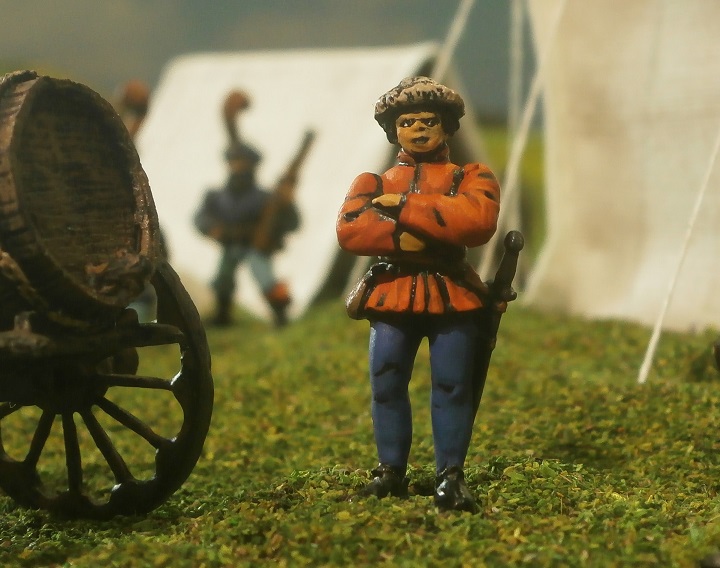
The captain bowed flamboyantly, as if acknowledging a gracious favour, eliciting a smile from Pieter.
“Dishonesty seems to be trait shared by more than just the merchants of Scozzese,” said Pieter. “There was something deceitful about the town’s councillors who spoke yesterday with the general. When we arrived here, they were welcoming, even ingratiating. Then they turned suddenly sour when Duke Guidobaldo’s letter came …”
“Well that’s surely to be expected?” interrupted Vinco. “Considering the claims contained in the letter concerning our own soldiers.”

The captain commanded a company of mounted handgunners, but himself preferred the full armour of a man at arms. As he had only just returned from a scouting foray he was even now plated from the neck down, although had discarded his helmet to wear a feathered leather cap instead.
Pieter understood the captain’s point. The duke of Pavona’s letter had slandered the VMC, accusing them of attacking and plundering the villages of Spomanti in Verezzo, even killing Lord Lucca in the process, while disguised as Lord Alessio’s Portomaggioran soldiers, as if too cowardly and ashamed to own what they had done. As the Scozzese councillors were the duke of Pavona’s subjects, it was to be expected they would accept their own lord’s account and so show anger towards the soldiers of the VMC.
Yet even then their anger seemed tempered, as if dulled by some other occult concern. In contrast to their feigned disquiet, Pieter now remembered the flash of real anger in Luccia la Fanciulla’s face when she herself heard the letter’s contents – a far more substantial reaction than that of the councillors, despite her quick efforts to subdue any sign of her emotion. She was a Tilean noblewoman, sworn before the goddess Myrmidia to serve in the army of the VMC, having accepted its cause was honourable. The faction of Marienburg trading interests forming the Vereenigde Marienburg Compagnie had been invited to defend Alcente from Khurnag’s Waagh and, having done just that, was now acting in the defence of the whole of Tilea against the vampire duchess. Luccia’s own honour was bound up with that of the VMC, so to insult it was to insult her.
Captain Vinco laughed. “I can imagine the discomfort they felt when obliged to question our general concerning their own lord’s accusations. There is no pleasant way to address such matters.”
“I know,” said Pieter. “They had no reason to doubt the letter and they were very nervous before the general. But what seemed to me to be dishonest was the way they yielded so quickly when General Valckenburgh answered them and seemed so easily convinced of their error.”
Captain Vinco frowned. “So … you think they should have been obstinate and called the general a liar to his face?”
“Why not, if they were honest?” asked Pieter.
“Cowardice springs to mind,” said the captain. “It’s one thing for such men to defend their lord’s honour when among friends, quite another when faced by an army such as ours.”
“You might have the truth of it,” Pieter agreed. “Indeed, the general seemed to believe fear was behind their sudden acceptance of his argument. If that was so, then they most likely still believed Duke Guidobaldo’s version of events, and were merely pretending to believe the general. Which is dishonesty. And if not that, then they were truly swayed by the general’s words, readily dismissing their own lord’s report as false. Which is another species of dishonesty, for it breaks the bonds of loyalty between them and their lord. Either dishonesty would explain their sudden amenability.”
The clerk snorted. “Oh, they’re not that amenable, otherwise they’d have delivered what was paid for. Not this vinegar!”
“Perhaps they feel guilty about accepting the general’s word over their own lord’s and so thought to make amends by pursuing bad trade with us?” suggested Captain Vinco, grinning.
“If you have an understanding of Pavonans, good captain,” said the clerk, “then you have a rare skill my friend. I heard they banished every dwarf from their realm, for reasons no-one can make head nor tail of.”
“I’ll warrant the reason was to do with gold,” said the captain. “Duke Guidobaldo will have profited somehow from their departure.”
“Perhaps he just hates short people?” suggested Pieter, only half joking. “From the way the Verezzan halflings were talking, the hatred is reciprocated.”
Only the day before a company of halfling rangers had arrived at the camp, from the realm of Verezzo where there was said to be an entire town and several villages of their kind. They too demanded an audience with the general, who had joked to his closest advisers that it was becoming hard to command the army what with all the guests he had to welcome.
“You mean this Pettirosso?” asked Captain Vinco. “You were present when he spoke to the general?”
“I was,” said Pieter. “It was thought a linguister might be needed in case they spoke to each other in a halfling tongue.”
“I knew you possessed an abundance of tongues but had no idea you spoke a halfling language,” said the captain
“Only after a fashion, for it is more a dialect of the Empire. It turned out Pettirosso spoke only Tilean, which made me somewhat redundant.”
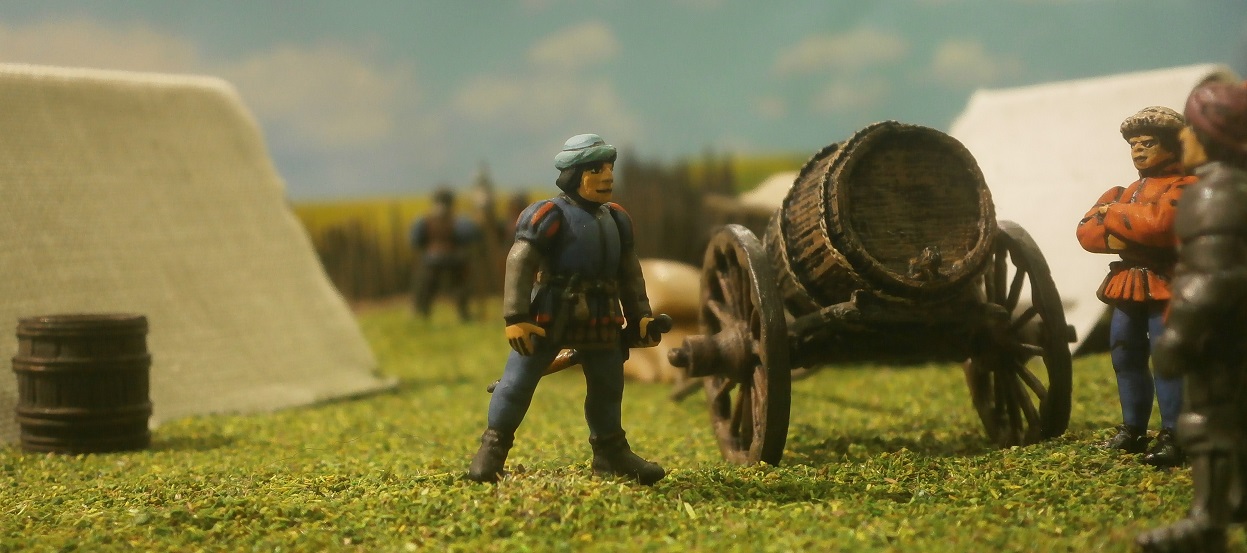
Captain Vinco and Zanobi stared at Pieter, which at first confused him, until he realised they most likely had no idea what was said at the meeting.
“Well, I suppose it is no secret,” he began, “Or at least I have not been bound to keep it so from our own officers and clerks. It was this Pettirosso who brought news of the Pavonans crossing the River Remo, and a new account concerning what exactly happened at Spomanti.”
“Everyone knows the duke lied in his letter,” declared Zanobi.
“Everyone here knows, of course,” countered the captain. “I think we ourselves would have noticed if it was is doing the robbing! But the rest of Tilea might well believe the duke’s lies!”
“This Pettirosso fellow claimed the duke had done much more than lied,” continued Pieter. “It seems he and his rangers were there when Lord Lucca died, and their tale began very much like the Duke of Pavona's letter. A force, Portomaggioran by their standards and livery, did indeed attack Spomanti. Their beloved Lord Lucca rushed to its aid, sending orders to the rangers to support his counterattack, along with more of Terrene’s halfling soldiers. When they were defeated, their lord killed, Pettirosso and his band were just about the only ones to escape. Knowing the land well and very talented at 'sneaking about' they not only evaded the enemy's clutches but remained to spy on the so-called Portomaggiorans.”
“‘Sneaking you say? How so?” asked the clerk.

Captain Vinco shushed the clerk, saying, “Hold your tongue, Master Zanobi. Pieter’s about to tell us the part we don’t know.”
“No, no, I will answer,” said Pieter. “For to know the nature of he who delivered a story, is to better judge how far said story can be trusted. A ‘Pettirosso’ is what the Verezzans call a Robin Redbreast, and it is a somewhat famous nickname in these parts. His real name is Roberto Cappuccio. He was once an outlaw, a ‘goodfellow’ who declared a love of righting wrongs. He was set against the tyrant who was Lord Lucca’s father, stealing from him and his most cruel officers, and apparently doling out much of what was stolen to the poorest of folk. Once Lucca became ruler, the thief recognised this philosopher son was nothing like his father, and when he daringly approached Lord Lucca to offer himself for wise judgement, to the astonishment of the court, he was accepted as a loyal servant for his ‘good deeds’, and he and his rangers, skilled archers all, became part of Lord Lucca's marching army.
Captain Vinco laughed. “Bravo! Quite the story. It would be fascinating to know the truth behind it. Still, I see how knowing this Pettirosso’s reputation might colour our perception of what he had to say.”
“Maybe so,” agreed Pieter. “There could be several species of lies concealed in what such a fellow has to say. Anyway, he claimed the enemy, having stripped all the loot they could from Spomanti, moved off northwards. After a while they halted, burned the flags and changed some of their clothes - the knights, however, keeping their blue and white livery. Then a company of Southland’s crossbowmen, mercenaries for sure, and a handful of the knights went off further north, escorting the loot, while a regiment of bravi-swords and the rest of the knights, along with their commander, headed off east-by-south. Pettirosso did not want to divide his little band, so he decided to follow the loot and thus discover who and where it was going to.
“They shadowed the little force, until they saw it approaching the river crossing over the Remo at Casoli, which they said proved their suspicions - the looters were not Portomaggioran as duke of Pavona claimed. They were the duke’s own men! Not that the Pettirosso knew of the claims made by Duke Guidobaldo’s letter. He simply reported what he himself claimed to have discovered.
“Later that same day, the Pettirosso spotted our own scouts, and looking for potential allies, he trailed them and thus discovered us.”
Captain Vinco laughed loudly. “And, being a bold, little fellow, marched right on into our camp to demand an audience with the general!”
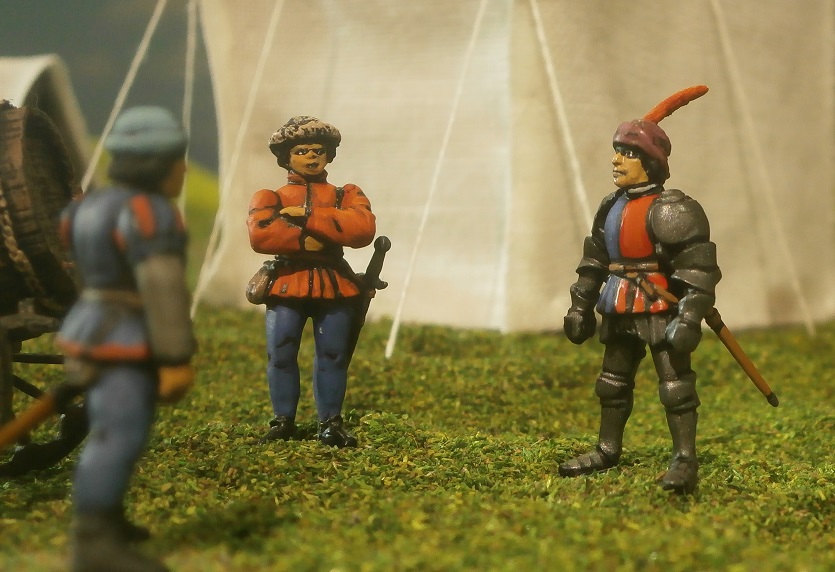
The clerk had a furrowed brow, obviously pondering all that he had heard. “So, we have only the word of a famous ex-thief?” he said. “Whose dead lord happened to be an enemy of the duke of Pavona? What did the general say?”
“General Valkenburgh is ever the diplomat,” answered Pieter. “He thanked the fellow; expressed sorrow for his loss but said that because he himself was no Tilean he would have to tread carefully when dealing with such serious claims. Then, as a kindness, he offered the rangers employment as scouts in our army, howsoever temporarily, that they might not be without bread.”
“Ha ha!” chuckled Captain Vinco. “A proud, strutting Robin Redbreast made to feel like a beggar!”
“Indeed,” agreed Pieter. “It may not have been the general’s best judged answer. The attempted act of charity changed the Pettirosso’s demeanour considerably - the fellow’s face went bright red with anger, his eyes showing more than a glimpse of the rebel he’s said to have once been. As bold as you like, he launched into an impassioned tirade, telling the general that Lord Lucca was murdered by dishonourable thieves led by a coward who disguised himself and his men as Portomaggiorans. He said that such a crime went beyond robbery and murder, being an attempt to ferment war between several Tilean realms, and this at the very time they must instead unite to fight the terrible enemies from the north. Then he told the general that ‘treading carefully’ was not way to answer such a crime, and certainly not one that was even now ongoing.”
“How did the general take that?” asked Zanobi.
“Oh, he was as inscrutable as ever, as if no offence at all had been given, nor had any been intended.”

“He’s here to profit the company,” said Vinco, “not to get all heated about slights and Tilean honour.”
Now Zanobi snorted. “He got heated enough when he ordered the burning of Camponeffro as punishment for what the Ravernans did.”
“Aye, but even then the company profited, or at the least made no loss, for we took everything of value before setting the fires,” said the captain. Then he asked, “Pieter, what did the general say to this petty arabiatti?”
“He just asked what the halfling meant by it being an ‘ongoing’ crime. It turned out that the stolen loot, on a lumbering, overloaded caravan, guarded by a mere handful of soldiers, is apparently, right now, within our reach, still on this side of the river and waiting to cross. The Pettirosso said that a quick force of horsemen, as well as his own lads, who for revenge he claimed would happily run until their lungs burned, could reach the loot and easily dispatch the handful of guards. ‘You have horse soldiers, do you not, my lord?’ says he, as if making an idle enquiry at supper. ‘Why not act now?’ he asked, ‘And so retrieve that which was stolen. Let’s teach these murderers a lesson they shall not forget!’”
“Bolder and bolder,” said the captain.
“Oh, he did not stop there. When the general did not answer immediately, the halfling suggested that the Portomaggiorans, whose brave ruler Lord Alessio was even now leading the mighty alliance army in the north, would surely be more than grateful if the general both cleared his name and punished those who were attempting to besmear his reputation. The Portomaggiorans would be in the general’s debt, he said, as would all those who love the truth. Then, his impatience perhaps getting the better of him, he said that if the general will not help him before it is too late, then he would find another way, or die trying. He loved his master for conscience sake, with all his heart, says he, and would not risk allowing this crime to go unpunished.
“When the general answered that he would have to consider the matter, and take advice from his Tilean lawyers, the Pettirosso finally went too far. He looked the general in the eye, as bold as brass, and says: ‘As you are merchants from the north and cannot understand honour like a Tilean, I would willingly pay you half what was stolen, if you will lend help, and if I am allowed to return home with the rest.’”
Captain Vinco shook his head in disbelief, with closed eyes, while the clerk rolled his eyes to the heavens.
“I think then, even the halfling noticed the mood had changed. Yet still the general simply nodded, declaring he would think upon it all. Before the ranger could dig himself any deeper, the general dismissed the fellow, ordering him and his men to eat, rest, and so prepare themselves for what must be done in the morrow.”
The town of Scozzese, in the realm of Pavona
The very end of Autumn, IC 2403
Pieter Schout, the army of the VMC’s chief linguister, had been making his was through the army camp to attend upon the general, but as he had time to spare, he stopped a while to speak with Captain Vinco and one of the quartermaster general’s clerks, who were inspecting a recently arrived wine cart.
“This is not good,” said the clerk, Zanobi, as he swilled the contents of the little pewter can he had just taken a sip from, his lips contorted in disgust. “Even thirsty soldiers would not consider this drinkable. These merchants are mocking us. To offer such as this for the price they expect us to pay is an insult.”
“Then it cannot be the same wine the quartermaster general and I tasted of,” said Captain Vinco, reaching out for the can.
The clerk pulled the can away. “I know you to be a brave man, good captain, but there’s no need to face this particular enemy!” He poured out what remained, then folded his arms as he did so often, the empty can disappearing behind the loose sleeves of his orange doublet.

The captain bowed flamboyantly, as if acknowledging a gracious favour, eliciting a smile from Pieter.
“Dishonesty seems to be trait shared by more than just the merchants of Scozzese,” said Pieter. “There was something deceitful about the town’s councillors who spoke yesterday with the general. When we arrived here, they were welcoming, even ingratiating. Then they turned suddenly sour when Duke Guidobaldo’s letter came …”
“Well that’s surely to be expected?” interrupted Vinco. “Considering the claims contained in the letter concerning our own soldiers.”

The captain commanded a company of mounted handgunners, but himself preferred the full armour of a man at arms. As he had only just returned from a scouting foray he was even now plated from the neck down, although had discarded his helmet to wear a feathered leather cap instead.
Pieter understood the captain’s point. The duke of Pavona’s letter had slandered the VMC, accusing them of attacking and plundering the villages of Spomanti in Verezzo, even killing Lord Lucca in the process, while disguised as Lord Alessio’s Portomaggioran soldiers, as if too cowardly and ashamed to own what they had done. As the Scozzese councillors were the duke of Pavona’s subjects, it was to be expected they would accept their own lord’s account and so show anger towards the soldiers of the VMC.
Yet even then their anger seemed tempered, as if dulled by some other occult concern. In contrast to their feigned disquiet, Pieter now remembered the flash of real anger in Luccia la Fanciulla’s face when she herself heard the letter’s contents – a far more substantial reaction than that of the councillors, despite her quick efforts to subdue any sign of her emotion. She was a Tilean noblewoman, sworn before the goddess Myrmidia to serve in the army of the VMC, having accepted its cause was honourable. The faction of Marienburg trading interests forming the Vereenigde Marienburg Compagnie had been invited to defend Alcente from Khurnag’s Waagh and, having done just that, was now acting in the defence of the whole of Tilea against the vampire duchess. Luccia’s own honour was bound up with that of the VMC, so to insult it was to insult her.
Captain Vinco laughed. “I can imagine the discomfort they felt when obliged to question our general concerning their own lord’s accusations. There is no pleasant way to address such matters.”
“I know,” said Pieter. “They had no reason to doubt the letter and they were very nervous before the general. But what seemed to me to be dishonest was the way they yielded so quickly when General Valckenburgh answered them and seemed so easily convinced of their error.”
Captain Vinco frowned. “So … you think they should have been obstinate and called the general a liar to his face?”
“Why not, if they were honest?” asked Pieter.
“Cowardice springs to mind,” said the captain. “It’s one thing for such men to defend their lord’s honour when among friends, quite another when faced by an army such as ours.”
“You might have the truth of it,” Pieter agreed. “Indeed, the general seemed to believe fear was behind their sudden acceptance of his argument. If that was so, then they most likely still believed Duke Guidobaldo’s version of events, and were merely pretending to believe the general. Which is dishonesty. And if not that, then they were truly swayed by the general’s words, readily dismissing their own lord’s report as false. Which is another species of dishonesty, for it breaks the bonds of loyalty between them and their lord. Either dishonesty would explain their sudden amenability.”
The clerk snorted. “Oh, they’re not that amenable, otherwise they’d have delivered what was paid for. Not this vinegar!”
“Perhaps they feel guilty about accepting the general’s word over their own lord’s and so thought to make amends by pursuing bad trade with us?” suggested Captain Vinco, grinning.
“If you have an understanding of Pavonans, good captain,” said the clerk, “then you have a rare skill my friend. I heard they banished every dwarf from their realm, for reasons no-one can make head nor tail of.”
“I’ll warrant the reason was to do with gold,” said the captain. “Duke Guidobaldo will have profited somehow from their departure.”
“Perhaps he just hates short people?” suggested Pieter, only half joking. “From the way the Verezzan halflings were talking, the hatred is reciprocated.”
Only the day before a company of halfling rangers had arrived at the camp, from the realm of Verezzo where there was said to be an entire town and several villages of their kind. They too demanded an audience with the general, who had joked to his closest advisers that it was becoming hard to command the army what with all the guests he had to welcome.
“You mean this Pettirosso?” asked Captain Vinco. “You were present when he spoke to the general?”
“I was,” said Pieter. “It was thought a linguister might be needed in case they spoke to each other in a halfling tongue.”
“I knew you possessed an abundance of tongues but had no idea you spoke a halfling language,” said the captain
“Only after a fashion, for it is more a dialect of the Empire. It turned out Pettirosso spoke only Tilean, which made me somewhat redundant.”

Captain Vinco and Zanobi stared at Pieter, which at first confused him, until he realised they most likely had no idea what was said at the meeting.
“Well, I suppose it is no secret,” he began, “Or at least I have not been bound to keep it so from our own officers and clerks. It was this Pettirosso who brought news of the Pavonans crossing the River Remo, and a new account concerning what exactly happened at Spomanti.”
“Everyone knows the duke lied in his letter,” declared Zanobi.
“Everyone here knows, of course,” countered the captain. “I think we ourselves would have noticed if it was is doing the robbing! But the rest of Tilea might well believe the duke’s lies!”
“This Pettirosso fellow claimed the duke had done much more than lied,” continued Pieter. “It seems he and his rangers were there when Lord Lucca died, and their tale began very much like the Duke of Pavona's letter. A force, Portomaggioran by their standards and livery, did indeed attack Spomanti. Their beloved Lord Lucca rushed to its aid, sending orders to the rangers to support his counterattack, along with more of Terrene’s halfling soldiers. When they were defeated, their lord killed, Pettirosso and his band were just about the only ones to escape. Knowing the land well and very talented at 'sneaking about' they not only evaded the enemy's clutches but remained to spy on the so-called Portomaggiorans.”
“‘Sneaking you say? How so?” asked the clerk.

Captain Vinco shushed the clerk, saying, “Hold your tongue, Master Zanobi. Pieter’s about to tell us the part we don’t know.”
“No, no, I will answer,” said Pieter. “For to know the nature of he who delivered a story, is to better judge how far said story can be trusted. A ‘Pettirosso’ is what the Verezzans call a Robin Redbreast, and it is a somewhat famous nickname in these parts. His real name is Roberto Cappuccio. He was once an outlaw, a ‘goodfellow’ who declared a love of righting wrongs. He was set against the tyrant who was Lord Lucca’s father, stealing from him and his most cruel officers, and apparently doling out much of what was stolen to the poorest of folk. Once Lucca became ruler, the thief recognised this philosopher son was nothing like his father, and when he daringly approached Lord Lucca to offer himself for wise judgement, to the astonishment of the court, he was accepted as a loyal servant for his ‘good deeds’, and he and his rangers, skilled archers all, became part of Lord Lucca's marching army.
Captain Vinco laughed. “Bravo! Quite the story. It would be fascinating to know the truth behind it. Still, I see how knowing this Pettirosso’s reputation might colour our perception of what he had to say.”
“Maybe so,” agreed Pieter. “There could be several species of lies concealed in what such a fellow has to say. Anyway, he claimed the enemy, having stripped all the loot they could from Spomanti, moved off northwards. After a while they halted, burned the flags and changed some of their clothes - the knights, however, keeping their blue and white livery. Then a company of Southland’s crossbowmen, mercenaries for sure, and a handful of the knights went off further north, escorting the loot, while a regiment of bravi-swords and the rest of the knights, along with their commander, headed off east-by-south. Pettirosso did not want to divide his little band, so he decided to follow the loot and thus discover who and where it was going to.
“They shadowed the little force, until they saw it approaching the river crossing over the Remo at Casoli, which they said proved their suspicions - the looters were not Portomaggioran as duke of Pavona claimed. They were the duke’s own men! Not that the Pettirosso knew of the claims made by Duke Guidobaldo’s letter. He simply reported what he himself claimed to have discovered.
“Later that same day, the Pettirosso spotted our own scouts, and looking for potential allies, he trailed them and thus discovered us.”
Captain Vinco laughed loudly. “And, being a bold, little fellow, marched right on into our camp to demand an audience with the general!”

The clerk had a furrowed brow, obviously pondering all that he had heard. “So, we have only the word of a famous ex-thief?” he said. “Whose dead lord happened to be an enemy of the duke of Pavona? What did the general say?”
“General Valkenburgh is ever the diplomat,” answered Pieter. “He thanked the fellow; expressed sorrow for his loss but said that because he himself was no Tilean he would have to tread carefully when dealing with such serious claims. Then, as a kindness, he offered the rangers employment as scouts in our army, howsoever temporarily, that they might not be without bread.”
“Ha ha!” chuckled Captain Vinco. “A proud, strutting Robin Redbreast made to feel like a beggar!”
“Indeed,” agreed Pieter. “It may not have been the general’s best judged answer. The attempted act of charity changed the Pettirosso’s demeanour considerably - the fellow’s face went bright red with anger, his eyes showing more than a glimpse of the rebel he’s said to have once been. As bold as you like, he launched into an impassioned tirade, telling the general that Lord Lucca was murdered by dishonourable thieves led by a coward who disguised himself and his men as Portomaggiorans. He said that such a crime went beyond robbery and murder, being an attempt to ferment war between several Tilean realms, and this at the very time they must instead unite to fight the terrible enemies from the north. Then he told the general that ‘treading carefully’ was not way to answer such a crime, and certainly not one that was even now ongoing.”
“How did the general take that?” asked Zanobi.
“Oh, he was as inscrutable as ever, as if no offence at all had been given, nor had any been intended.”

“He’s here to profit the company,” said Vinco, “not to get all heated about slights and Tilean honour.”
Now Zanobi snorted. “He got heated enough when he ordered the burning of Camponeffro as punishment for what the Ravernans did.”
“Aye, but even then the company profited, or at the least made no loss, for we took everything of value before setting the fires,” said the captain. Then he asked, “Pieter, what did the general say to this petty arabiatti?”
“He just asked what the halfling meant by it being an ‘ongoing’ crime. It turned out that the stolen loot, on a lumbering, overloaded caravan, guarded by a mere handful of soldiers, is apparently, right now, within our reach, still on this side of the river and waiting to cross. The Pettirosso said that a quick force of horsemen, as well as his own lads, who for revenge he claimed would happily run until their lungs burned, could reach the loot and easily dispatch the handful of guards. ‘You have horse soldiers, do you not, my lord?’ says he, as if making an idle enquiry at supper. ‘Why not act now?’ he asked, ‘And so retrieve that which was stolen. Let’s teach these murderers a lesson they shall not forget!’”
“Bolder and bolder,” said the captain.
“Oh, he did not stop there. When the general did not answer immediately, the halfling suggested that the Portomaggiorans, whose brave ruler Lord Alessio was even now leading the mighty alliance army in the north, would surely be more than grateful if the general both cleared his name and punished those who were attempting to besmear his reputation. The Portomaggiorans would be in the general’s debt, he said, as would all those who love the truth. Then, his impatience perhaps getting the better of him, he said that if the general will not help him before it is too late, then he would find another way, or die trying. He loved his master for conscience sake, with all his heart, says he, and would not risk allowing this crime to go unpunished.
“When the general answered that he would have to consider the matter, and take advice from his Tilean lawyers, the Pettirosso finally went too far. He looked the general in the eye, as bold as brass, and says: ‘As you are merchants from the north and cannot understand honour like a Tilean, I would willingly pay you half what was stolen, if you will lend help, and if I am allowed to return home with the rest.’”
Captain Vinco shook his head in disbelief, with closed eyes, while the clerk rolled his eyes to the heavens.
“I think then, even the halfling noticed the mood had changed. Yet still the general simply nodded, declaring he would think upon it all. Before the ranger could dig himself any deeper, the general dismissed the fellow, ordering him and his men to eat, rest, and so prepare themselves for what must be done in the morrow.”
Padre
Lord
To His Holiness Bernado Ugolini, Most Highly Favoured of Morr, from your faithful servant, Brother Migliore.
The End of Autumn, 2403
If it pleases your holiness, I hereby and humbly present the conclusions of my researches into the history of the Ratto Uomo, commissioned by yourself in light of the ever more numerous reports of sightings upon the seas around, and even within the lands of, Tilea.
Concerning their ships
The ratto uomo are not natural seafarers, but can it be claimed that any land-born race truly is? Perhaps the elves have perfected the art of maritime navigation more fully than all others, but even their sailors must find their sea legs before becoming accustomed to ship-board life. All vessels are subject to the vicissitudes of the seas, battered by the winds and waves, pulled by the currents, baked by the sun and befuddled by the light of the chaos moon. All sailors of all races fear becoming embayed on a lee-shore or attack by corsairs, and there are none who are immune to ship’s fever, the bloody flux, scurvy or simple starvation when sustenance proves hard to find. Nevertheless, the ratto uomo must not be thought to be deficient in their mastery of the seas, for I have learned from the salty dogs of the holy city and Portomaggiore that the ratmen’s vessels have long been able to sail close-hauled on a bowline, indeed directly into the wind, being for the most part propelled not by sails but by great screws affixed beneath their sterns, powered by blasts of sulphurous steam made forceful by the conjoined, mundane and etheric heat of their sky-stones. This is why they are so feared, for they can bear down upon a prize from leeward as easily as windward. Furthermore, even their tenders and their lesser, lighter vessels, of insufficient worth to warrant such infernal engines, are most often galleys, and as the ratto uomo care not a jot if their slaves are worked en-masse unto their very deaths, then they can similarly speed through the seas contrary to any wind, so that any sailing ship in pursuit must tack close to have a chance to intercept them.
Several many seamen made the claim that the reports of ratto uomo in the gulf are on the increase, yet at the same time, a good number instead told me that there have always been reports of such sightings, and that nothing has changed, for tired, hungry, fearful eyes can conjure many a danger in the distance, the mists or in the crepuscular hour. It can rarely be known why lone ships are lost at sea, for survivors from such vessels are very few in number. Of those lost ships whose fates are known, the vast majority were travelling in convoy - their loss thus witnessed by the crews of their companions, and few of these ever report attacks by ratto uomo. Yet, there are those who say that this in itself is evidence, for the ratmen are renowned as bullies and cowards, and as such prefer to prey upon weak and lonely prizes, the better to ensure their own survival and success.
One particular curiosity concerning the ratto uomo’s sea-going activities is their reputed use of sub-marine vessels. No such vessel has ever been captured intact, but they have been, through the centuries, reported and have even been known to ram ships. Whether or not these vessels are similarly propelled by turning screws or by oars none can say for certain, although in IC 2286 the Viadazan Maestro Romolo Auriemma, apparently inspired by the recovered wreckage of part of such a vessel, drew up plans for a sub-marine vessel in which the oars were made watertight by protruding through leather-sealed ports.
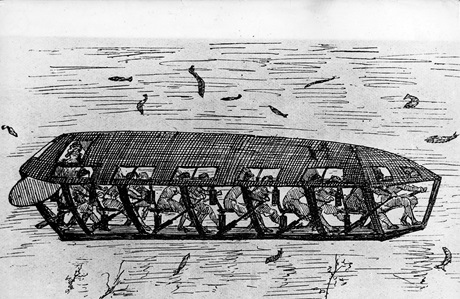
It seems that he constructed said vessel but that nothing is known of his trails, not even whether his efforts were in any way successful. His rather dense treatise discusses many practical issues, concerning how to let out or receive of anything without the admission of water? How to propel and direct without the usual advantages of wind & tides, or the sight of the heavens? How to supply air for respiration? How to keep fires lit for light & cooking? As well as some rather obscure scribblings which seem to detail the leather seals and what appears to be fin-ended oars able to contract and dilate as required for either pressing upon or passing through the water. The last of his pages shows a weight suspended beneath to enable falling and rising.
How similar the vessel Maestro Romolo designed and constructed was to the kind employed by the ratto uomo is, however, a matter of pure speculation.
Concerning the Underpasses
In the great library of the Palazio Endrezzi, I discovered the texts your scholarly adviser Stoldo Schiavone remembered perusing during his youthful studies. One of the volumes was missing, but fortunately the volume with a chapter considering the ratto uomo’s underground movements during the great war nearly two centuries ago was present and I scoured it for anything of possible importance. This I have transcribed here almost exactly as the original.
Excerpts from Anichino Didonato’s IC 2361 treatise about the Ratto Uomo Wars of IC 2212-15, Volume 2, Chapter 6: Concerning Caverns, Sewers and the Great Underpasses
By the Summer of the year IC 2213 it had become generally known that the great swarm-armies of ratmen were emerging not merely from the ancient city sewers, as did their emissaries, assassins and spies so frequently during the past two, murderous decades, nor were they simply camped in cavernous holds before their assaults, or marching by night to hide in ruinous places and wastelands and swamps, but that they were issuing from the mouths of great underpasses, being tunnels of enormous proportions stretching for many leagues beneath almost the entire length and breadth of Tilea.
In early Autumn 2213 the army of the ‘Third Reman Pact’ fought at the mouth of the tunnel to the east of Remas, and also at an exit near Ebino, but in both cases, despite overwhelming the enemy forces in the vicinity of the mouth, could not penetrate deep into the tunnels without the loss of a great many soldiers. Such a sacrifice was considered a price not worth paying, for should the ratto uomo send another army through the tunnel, then whatever costly victories had been achieved would prove futile. The mouth of the tunnel near Remas was collapsed with the use of black powder, but that action also proved of limited consequence, for the enemy simply carved another portal further back along the tunnel, upon the eastern side of the River Remo. At least it allowed a defence to be made at Stiani, where the Pact’s forces were massed and the great Battle of Stiani was fought in the summer of 2214 in which a mighty horde of ratto uomo was defeated and scattered, their wicked engines destroyed and mountainous piles of their corpses burned. See Chapter 8 for a full account of this battle.
The underpasses were not what one might commonly imagine, akin to brick-built sewers, nor even ancient, twisting, irregular caverns, accessed one to another by squeezing through skewed crevices and cracks. Instead they were wide enough for an army to march in column of ranks and files.
The following excerpt is taken from Chapter 2, ‘Concerning the Enemy’s Armies’
The ratto uomo fielded horde-legions with triple the numbers of the Tilean armies they faced. These were divided into regularly sized, regimented bodies scuttle-marching in strict rank and files. Each such body was commanded by a chieftain, accompanied by a bodyguard-lieutenant, several musicians bearing shrill instruments and the bearer of a ragged banner.

Most commonly they carried long bladed spears and round, iron-rimmed shields, being clothed in dirty rags with scrap-plates of iron armour on their upper bodies and arms.
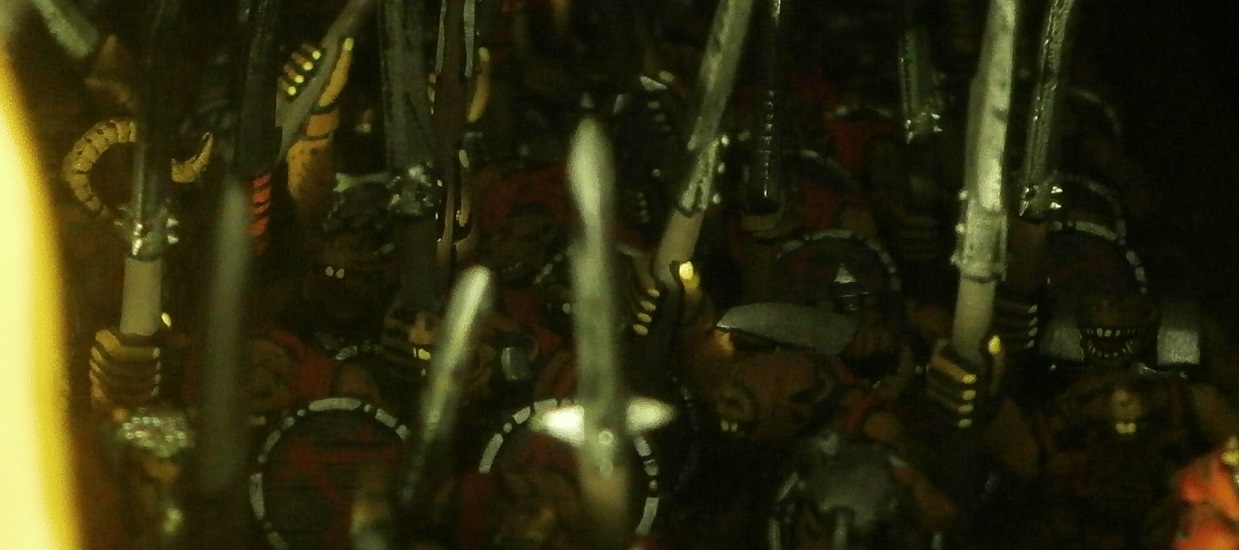
Their natural proclivity to swarm, as might their tiny brethren when threatened by some cataclysmic event such as a flood or wildfire, meant that they had an uncanny agility, even when packed tightly in ranks and files of the closest order. They marched this way also, as closely dressed as a body of Tilean soldiers might be only in the moments before engaging a foe.

Here Chapter 6 continues:
The great underpasses, and the mouths they served, were high enough to allow the passage of engines of war of considerable size. Some engines were propelled by strange mechanisms, in which sulphurous steam was created by shards of burning sky-stone to turn gears and consequently the wheels, as might river waters turn a mill wheel. Such was the unreliability of these engines, and the ever-present danger that they might self-combust or even explode, that they were most commonly moved upon the march by slaves. Both their own ratto uomo, and their larger brute cousins, were employed as such beasts of burden, often together, so that while the smaller slaves where whipped to perform most of the labour, the brutes would be required to lend a more mighty hand as occasion demanded, such as when stuck in a rut, struggling through mud or upon an upward slope.
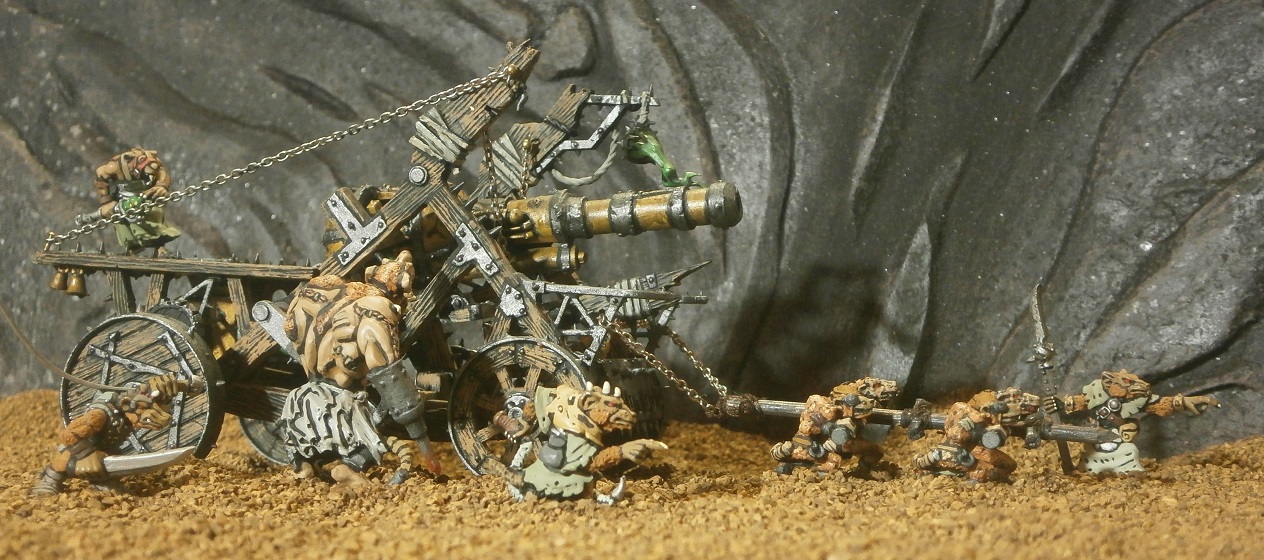
When transported through the tunnels, it seems that the engines were invariably removed from the main body of the army, most likely due to the relative slowness of their lumbering progress and perhaps also a reluctance to manoeuvre such unstable burdens in close proximity to the army’s massed soldiers. Any sudden detonation would surely have sent a wave of fire washing along the tunnels, capable of immolating many hundreds among the huddled hordes if it were to reach them before its heat was sufficiently dissipated.
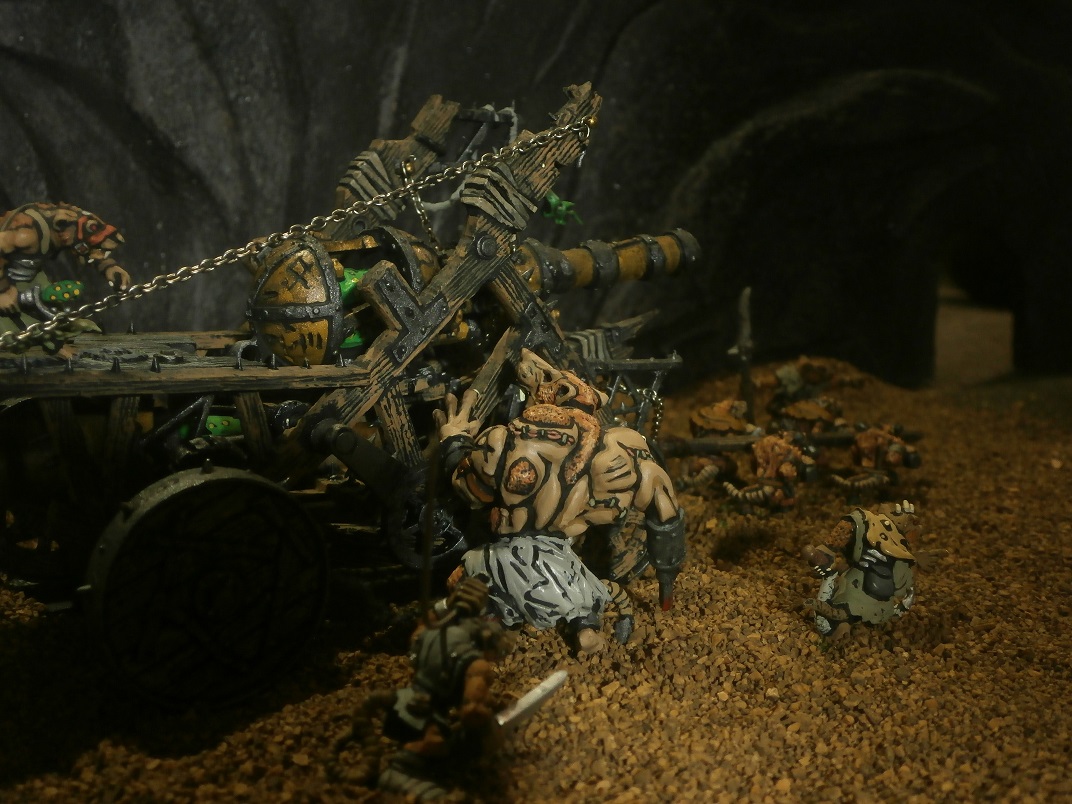
Each engine, its slaves and matrosses, was governed by an engineer whose understanding was sufficient to coax his ward into destructive power as and when required. They often carried a shard of the precious sky-stone themselves, mounted upon a haft of iron, the function of which was unknown, but has been variously speculated to be either like unto a key with which to breathe life into the engine, or a stinging staff with which to berate and bully their underlings, or perhaps merely a badge to signal their own importance and professed mastery of the mystery of said stone?

How the underpasses were constructed is unknown for certain. What parts near unto the mouths were inspected closely by miners showed some scattered signs of chiselling, more frequently a swirling form of scraping, while other stretches seemed to have been scorched, the rock surface part-melted or glazed. Knowing the ratto uomo’s predilection to employ mighty machines in battle, as well as vast throngs of slaves of their own kind, then it was supposed that either one, or indeed both of these methods, were employed to hew through the rock. It is presumed the passages linked to natural underground fissures, for where else could the vast quantity of debris created by their mining, howsoever it was done, be put? Some scholars suggested that it were possible that the rocks were carried away by slaves, and indeed there are ancient tales, many hundreds of years old, of entirely new hills appearing in the far northern region of Albu (although the stories claim, among other things, that they were made as cairns for the eternal repose of giants or even that monstrous moles dwelling a thousand fathoms beneath the ground had thrown them up over-night when they came aloft to breath sufficient air to sustain them for another millennia).
The ground of the underpasses was like unto a beach, part-pebbled, part-sand, which in itself gave several miners cause to wonder at how exactly it had come to be so. It was suggested that perhaps the ground was a by-product of the pulverising of the rock, or some sort of burning?
The tunnel mouths aforementioned were almost certainly extensions of the same underpass, stretching from Ebino then under the River Tarano just before the River Bellagio branched off, then beneath the River Trantino north-west of Scorcio, then beneath the mouth of the River Remo itself then corkscrewing up to exit through a sea facing wall of rock, thus requiring a ramp to be made from the debris which poured from the mouth. How the whole was ventilated was never properly discovered, and it could only be speculated that there were some form of ventilation shafts, perhaps guarded by iron grills or the like, with apertures cunningly concealed from the upper world.
Chapter 6, Part 2: Concerning the Collapsing of the Underpasses
Having had such limited success in collapsing the tunnel mouths, the renowned maestro Abramo Ruggiere of Urbimo was tasked with discovering a way to destroy the underpasses. He was chosen because of his successful engagements in great architectural works such as redirecting the Via Aurelia to avoid the flood plains west of Astiano and damning the River Riatti near Terenne to create an artificial lake, and his proven expertise in the construction of great helical grooved shafts screws with which to lift and direct water. He proposed re-directing an artificial offshoot of the River Remo to permanently flood a long section of the underpass, but to employ a different method involving fiery conjurations and gunpowder to collapse the tunnel in the western reaches of Usola, south-east of Ebino, so that if either method proved unsuccessful then the other might make up for the deficiency, and also should the ratto uomo discover the operation before it was completed and devise some method to thwart it, then the same method could not be applied to the other stretch.
Other city states, including Miragliano, Trantio and Astiano, were expected to assume the responsibility of collapsing or otherwise preventing the use any tunnels in their own proximity, and it is possible, if not likely, that several different methods were employed for these works.
Both maestro Abramo’s proposed methods proved effective. At torrent of water drawn from the Remo was poured through a large, carved hole into the underpass and flowed freely for several days until it began to spill out from the hole, presumably because the enemy had collapsed the tunnel themselves at a removed point in order to block the water’s further onrush. At that point, as had been planned, the maestro ordered the damning of the Remo’s outflow so that the river might resume its course. Subsequently a smaller channel was dug to ensure that the waters within the underpass would be replenished continually, thus replacing any lost due to flooding through underground fissures, whether natural or unnatural.
To the north, near Ebino, several fire wizards were employed to conjure a magically induced wave of flame to wash along the underpass, where large quantities of blackpowder, both barrels and grenadoes (the latter jammed into fissures in the rock walls) had already been placed at both frequent and regular intervals. It was presumed that each blast would add to the wave of flame as it flowed, so that as the ethereally derived power of the heat dwindled, the fury of the mundane flames would increase in inverse proportion.
Thus it was that the course of the war was changed considerably, for subsequently the enemy had to rely upon overland marches and the seas, and was much less able to conceal the disposition of their forces.
I have copied here, as best my limited ability allows, the little map included in the chapter:

Here the chapter ended. The remainder of the book concentrated upon the history of the Third Reman Pact and of the war itself, mainly concerning the politics and rulers of the various Tilean states involved in the war, as well as a veritable cornucopia of stories concerning the nobility, some important and others insignificant, but of very little consequence to our world two centuries later.
…
As you yourself wisely suggested, I myself discussed my findings, as well as that I had learned from both the sailors and Anichino Didonato’s other volumes, with the maestro Angelo da Leoni. He allowed me to visit him in his workshop, where he was surrounded by books, papers, schemas and strange artefacts, the like of some of which I had never seen before. A large, spherical, globe of strangely-hued metal gave off occasional stuttering clicks throughout our meeting, but neither the maestro nor his gnomish assistant paid it any attention.
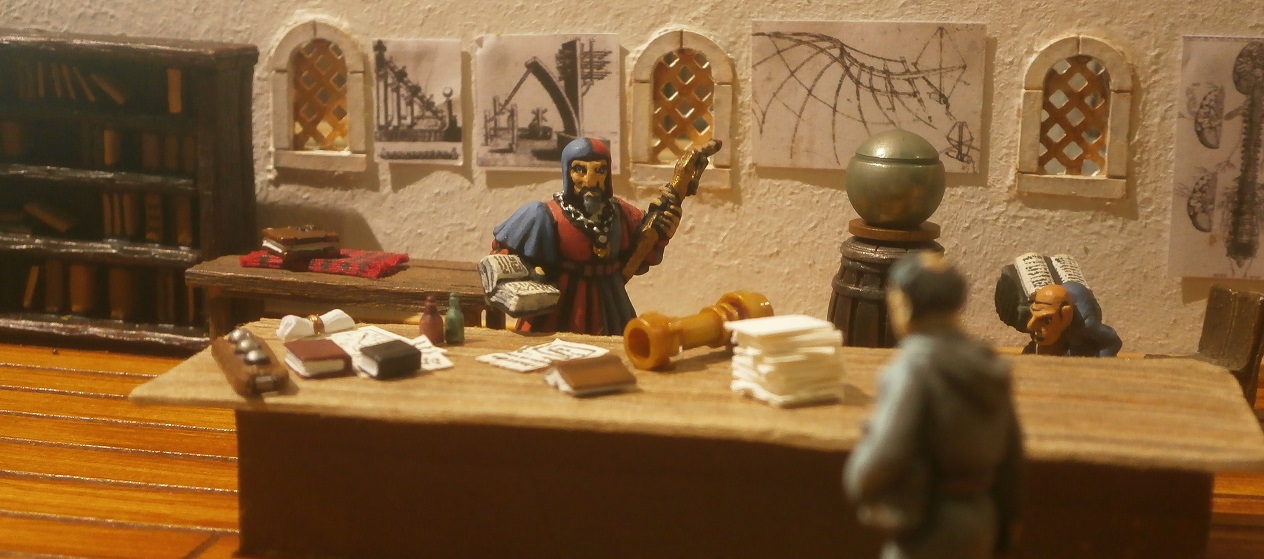
He clearly found my account fascinating and was prompted to wax both lyrically and generously in sharing his own thoughts. He seemed most intrigued by the possibility that the ratmen’s tunnelling engines, if they did indeed employ heat to burn the subterraneous rock - as the evidence of scorching suggested - might be, in form, rather like his own engine which he gifted to the Disciplinati di Morr for their march into the north. That consisted, he told me, of lenses both dioptrical and catoptrical, some of pure glass and others of glass admixed with powdered sky-stone, being employed to separate, then concentrate a conjoining of light both etheric and mundane, vastly increasing the heat thereby manifested. Such an apparatus, especially if the source of ethereal light were not the far-away sun but a shard of pure sky-stone, of a size and form that would most likely bake the very flesh of anyone standing close enough to work the device, might indeed produce a shaft of such brilliant intensity as to burn away the rock or at the least make it (to a depth of several feet) so brittle in consistency that simply scraping at it would subsequently cause it to crumble it away.
Yet he foresaw innumerate difficulties and dangers inherent in the employment of such an apparatus, not least the great cloud of poisonous fumes that he believed would be produced. Here he showed me several strange masks, hoods and sleeved cloaks he had fashioned, kept in a wardrobe in his workshop, intended to be worn at times of plague or when foul and foetid fumes tainted the air, and spoke of the possibility that similar garments might be employed to permit workers to labour at least for some time before succumbing to the noxious vapours. Yet, still he checked himself, for he now declared such a sudden boiling, even of only that constituent part of rock that gifted the quality of hardness, and its almost instantaneous transformation into vapour, would of necessity cause a great and violent on-rush of air, at most explosive and at the least like unto the strongest of gales. This would be forced unstoppably through the great tunnel to be released and diminished only wherever vents pierced the roof to reach the upper world, which surely there must have been. Indeed, he proposed that such vents, placed at regular intervals, would have had different purposes over time, from allowing air to circulate sufficiently to make work in the tunnels just possible, then later allowing the necessary escape of the bursting, noxious vapours. Perhaps some of these vents, the suggested, if only those most suitably placed, were then later transformed into the concealed ventilation shafts intended to serve the tunnel permanently?
Before I left, and as a most gracious gesture to show his respect for you my lord, he instructed his gnomish clerk to take a copy of a paper of consequence, that might better inform natural philosophers and engineers of at least the basic principles of his burning apparatus, if not the full and complicated practicalities of its construction, which were more explored in the making and calibration of the apparatus than in any schema or drawn design beforehand. I enclose said page here.
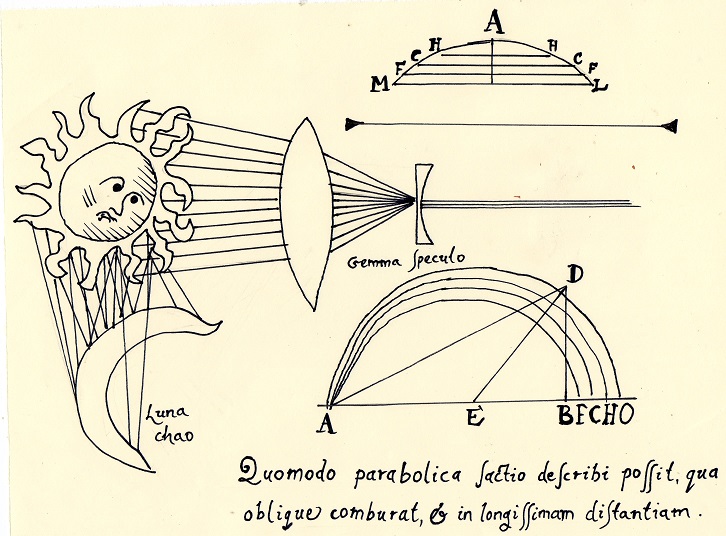
I remain, as always and forever more, your most humble servant, for you are great Morr’s most blessed and my heart only knows love for him and those who serve him truly.
The End of Autumn, 2403
If it pleases your holiness, I hereby and humbly present the conclusions of my researches into the history of the Ratto Uomo, commissioned by yourself in light of the ever more numerous reports of sightings upon the seas around, and even within the lands of, Tilea.
Concerning their ships
The ratto uomo are not natural seafarers, but can it be claimed that any land-born race truly is? Perhaps the elves have perfected the art of maritime navigation more fully than all others, but even their sailors must find their sea legs before becoming accustomed to ship-board life. All vessels are subject to the vicissitudes of the seas, battered by the winds and waves, pulled by the currents, baked by the sun and befuddled by the light of the chaos moon. All sailors of all races fear becoming embayed on a lee-shore or attack by corsairs, and there are none who are immune to ship’s fever, the bloody flux, scurvy or simple starvation when sustenance proves hard to find. Nevertheless, the ratto uomo must not be thought to be deficient in their mastery of the seas, for I have learned from the salty dogs of the holy city and Portomaggiore that the ratmen’s vessels have long been able to sail close-hauled on a bowline, indeed directly into the wind, being for the most part propelled not by sails but by great screws affixed beneath their sterns, powered by blasts of sulphurous steam made forceful by the conjoined, mundane and etheric heat of their sky-stones. This is why they are so feared, for they can bear down upon a prize from leeward as easily as windward. Furthermore, even their tenders and their lesser, lighter vessels, of insufficient worth to warrant such infernal engines, are most often galleys, and as the ratto uomo care not a jot if their slaves are worked en-masse unto their very deaths, then they can similarly speed through the seas contrary to any wind, so that any sailing ship in pursuit must tack close to have a chance to intercept them.
Several many seamen made the claim that the reports of ratto uomo in the gulf are on the increase, yet at the same time, a good number instead told me that there have always been reports of such sightings, and that nothing has changed, for tired, hungry, fearful eyes can conjure many a danger in the distance, the mists or in the crepuscular hour. It can rarely be known why lone ships are lost at sea, for survivors from such vessels are very few in number. Of those lost ships whose fates are known, the vast majority were travelling in convoy - their loss thus witnessed by the crews of their companions, and few of these ever report attacks by ratto uomo. Yet, there are those who say that this in itself is evidence, for the ratmen are renowned as bullies and cowards, and as such prefer to prey upon weak and lonely prizes, the better to ensure their own survival and success.
One particular curiosity concerning the ratto uomo’s sea-going activities is their reputed use of sub-marine vessels. No such vessel has ever been captured intact, but they have been, through the centuries, reported and have even been known to ram ships. Whether or not these vessels are similarly propelled by turning screws or by oars none can say for certain, although in IC 2286 the Viadazan Maestro Romolo Auriemma, apparently inspired by the recovered wreckage of part of such a vessel, drew up plans for a sub-marine vessel in which the oars were made watertight by protruding through leather-sealed ports.

It seems that he constructed said vessel but that nothing is known of his trails, not even whether his efforts were in any way successful. His rather dense treatise discusses many practical issues, concerning how to let out or receive of anything without the admission of water? How to propel and direct without the usual advantages of wind & tides, or the sight of the heavens? How to supply air for respiration? How to keep fires lit for light & cooking? As well as some rather obscure scribblings which seem to detail the leather seals and what appears to be fin-ended oars able to contract and dilate as required for either pressing upon or passing through the water. The last of his pages shows a weight suspended beneath to enable falling and rising.
How similar the vessel Maestro Romolo designed and constructed was to the kind employed by the ratto uomo is, however, a matter of pure speculation.
Concerning the Underpasses
In the great library of the Palazio Endrezzi, I discovered the texts your scholarly adviser Stoldo Schiavone remembered perusing during his youthful studies. One of the volumes was missing, but fortunately the volume with a chapter considering the ratto uomo’s underground movements during the great war nearly two centuries ago was present and I scoured it for anything of possible importance. This I have transcribed here almost exactly as the original.
Excerpts from Anichino Didonato’s IC 2361 treatise about the Ratto Uomo Wars of IC 2212-15, Volume 2, Chapter 6: Concerning Caverns, Sewers and the Great Underpasses
By the Summer of the year IC 2213 it had become generally known that the great swarm-armies of ratmen were emerging not merely from the ancient city sewers, as did their emissaries, assassins and spies so frequently during the past two, murderous decades, nor were they simply camped in cavernous holds before their assaults, or marching by night to hide in ruinous places and wastelands and swamps, but that they were issuing from the mouths of great underpasses, being tunnels of enormous proportions stretching for many leagues beneath almost the entire length and breadth of Tilea.
In early Autumn 2213 the army of the ‘Third Reman Pact’ fought at the mouth of the tunnel to the east of Remas, and also at an exit near Ebino, but in both cases, despite overwhelming the enemy forces in the vicinity of the mouth, could not penetrate deep into the tunnels without the loss of a great many soldiers. Such a sacrifice was considered a price not worth paying, for should the ratto uomo send another army through the tunnel, then whatever costly victories had been achieved would prove futile. The mouth of the tunnel near Remas was collapsed with the use of black powder, but that action also proved of limited consequence, for the enemy simply carved another portal further back along the tunnel, upon the eastern side of the River Remo. At least it allowed a defence to be made at Stiani, where the Pact’s forces were massed and the great Battle of Stiani was fought in the summer of 2214 in which a mighty horde of ratto uomo was defeated and scattered, their wicked engines destroyed and mountainous piles of their corpses burned. See Chapter 8 for a full account of this battle.
The underpasses were not what one might commonly imagine, akin to brick-built sewers, nor even ancient, twisting, irregular caverns, accessed one to another by squeezing through skewed crevices and cracks. Instead they were wide enough for an army to march in column of ranks and files.
The following excerpt is taken from Chapter 2, ‘Concerning the Enemy’s Armies’
The ratto uomo fielded horde-legions with triple the numbers of the Tilean armies they faced. These were divided into regularly sized, regimented bodies scuttle-marching in strict rank and files. Each such body was commanded by a chieftain, accompanied by a bodyguard-lieutenant, several musicians bearing shrill instruments and the bearer of a ragged banner.

Most commonly they carried long bladed spears and round, iron-rimmed shields, being clothed in dirty rags with scrap-plates of iron armour on their upper bodies and arms.

Their natural proclivity to swarm, as might their tiny brethren when threatened by some cataclysmic event such as a flood or wildfire, meant that they had an uncanny agility, even when packed tightly in ranks and files of the closest order. They marched this way also, as closely dressed as a body of Tilean soldiers might be only in the moments before engaging a foe.

Here Chapter 6 continues:
The great underpasses, and the mouths they served, were high enough to allow the passage of engines of war of considerable size. Some engines were propelled by strange mechanisms, in which sulphurous steam was created by shards of burning sky-stone to turn gears and consequently the wheels, as might river waters turn a mill wheel. Such was the unreliability of these engines, and the ever-present danger that they might self-combust or even explode, that they were most commonly moved upon the march by slaves. Both their own ratto uomo, and their larger brute cousins, were employed as such beasts of burden, often together, so that while the smaller slaves where whipped to perform most of the labour, the brutes would be required to lend a more mighty hand as occasion demanded, such as when stuck in a rut, struggling through mud or upon an upward slope.

When transported through the tunnels, it seems that the engines were invariably removed from the main body of the army, most likely due to the relative slowness of their lumbering progress and perhaps also a reluctance to manoeuvre such unstable burdens in close proximity to the army’s massed soldiers. Any sudden detonation would surely have sent a wave of fire washing along the tunnels, capable of immolating many hundreds among the huddled hordes if it were to reach them before its heat was sufficiently dissipated.

Each engine, its slaves and matrosses, was governed by an engineer whose understanding was sufficient to coax his ward into destructive power as and when required. They often carried a shard of the precious sky-stone themselves, mounted upon a haft of iron, the function of which was unknown, but has been variously speculated to be either like unto a key with which to breathe life into the engine, or a stinging staff with which to berate and bully their underlings, or perhaps merely a badge to signal their own importance and professed mastery of the mystery of said stone?

How the underpasses were constructed is unknown for certain. What parts near unto the mouths were inspected closely by miners showed some scattered signs of chiselling, more frequently a swirling form of scraping, while other stretches seemed to have been scorched, the rock surface part-melted or glazed. Knowing the ratto uomo’s predilection to employ mighty machines in battle, as well as vast throngs of slaves of their own kind, then it was supposed that either one, or indeed both of these methods, were employed to hew through the rock. It is presumed the passages linked to natural underground fissures, for where else could the vast quantity of debris created by their mining, howsoever it was done, be put? Some scholars suggested that it were possible that the rocks were carried away by slaves, and indeed there are ancient tales, many hundreds of years old, of entirely new hills appearing in the far northern region of Albu (although the stories claim, among other things, that they were made as cairns for the eternal repose of giants or even that monstrous moles dwelling a thousand fathoms beneath the ground had thrown them up over-night when they came aloft to breath sufficient air to sustain them for another millennia).
The ground of the underpasses was like unto a beach, part-pebbled, part-sand, which in itself gave several miners cause to wonder at how exactly it had come to be so. It was suggested that perhaps the ground was a by-product of the pulverising of the rock, or some sort of burning?
The tunnel mouths aforementioned were almost certainly extensions of the same underpass, stretching from Ebino then under the River Tarano just before the River Bellagio branched off, then beneath the River Trantino north-west of Scorcio, then beneath the mouth of the River Remo itself then corkscrewing up to exit through a sea facing wall of rock, thus requiring a ramp to be made from the debris which poured from the mouth. How the whole was ventilated was never properly discovered, and it could only be speculated that there were some form of ventilation shafts, perhaps guarded by iron grills or the like, with apertures cunningly concealed from the upper world.
Chapter 6, Part 2: Concerning the Collapsing of the Underpasses
Having had such limited success in collapsing the tunnel mouths, the renowned maestro Abramo Ruggiere of Urbimo was tasked with discovering a way to destroy the underpasses. He was chosen because of his successful engagements in great architectural works such as redirecting the Via Aurelia to avoid the flood plains west of Astiano and damning the River Riatti near Terenne to create an artificial lake, and his proven expertise in the construction of great helical grooved shafts screws with which to lift and direct water. He proposed re-directing an artificial offshoot of the River Remo to permanently flood a long section of the underpass, but to employ a different method involving fiery conjurations and gunpowder to collapse the tunnel in the western reaches of Usola, south-east of Ebino, so that if either method proved unsuccessful then the other might make up for the deficiency, and also should the ratto uomo discover the operation before it was completed and devise some method to thwart it, then the same method could not be applied to the other stretch.
Other city states, including Miragliano, Trantio and Astiano, were expected to assume the responsibility of collapsing or otherwise preventing the use any tunnels in their own proximity, and it is possible, if not likely, that several different methods were employed for these works.
Both maestro Abramo’s proposed methods proved effective. At torrent of water drawn from the Remo was poured through a large, carved hole into the underpass and flowed freely for several days until it began to spill out from the hole, presumably because the enemy had collapsed the tunnel themselves at a removed point in order to block the water’s further onrush. At that point, as had been planned, the maestro ordered the damning of the Remo’s outflow so that the river might resume its course. Subsequently a smaller channel was dug to ensure that the waters within the underpass would be replenished continually, thus replacing any lost due to flooding through underground fissures, whether natural or unnatural.
To the north, near Ebino, several fire wizards were employed to conjure a magically induced wave of flame to wash along the underpass, where large quantities of blackpowder, both barrels and grenadoes (the latter jammed into fissures in the rock walls) had already been placed at both frequent and regular intervals. It was presumed that each blast would add to the wave of flame as it flowed, so that as the ethereally derived power of the heat dwindled, the fury of the mundane flames would increase in inverse proportion.
Thus it was that the course of the war was changed considerably, for subsequently the enemy had to rely upon overland marches and the seas, and was much less able to conceal the disposition of their forces.
I have copied here, as best my limited ability allows, the little map included in the chapter:

Here the chapter ended. The remainder of the book concentrated upon the history of the Third Reman Pact and of the war itself, mainly concerning the politics and rulers of the various Tilean states involved in the war, as well as a veritable cornucopia of stories concerning the nobility, some important and others insignificant, but of very little consequence to our world two centuries later.
…
As you yourself wisely suggested, I myself discussed my findings, as well as that I had learned from both the sailors and Anichino Didonato’s other volumes, with the maestro Angelo da Leoni. He allowed me to visit him in his workshop, where he was surrounded by books, papers, schemas and strange artefacts, the like of some of which I had never seen before. A large, spherical, globe of strangely-hued metal gave off occasional stuttering clicks throughout our meeting, but neither the maestro nor his gnomish assistant paid it any attention.

He clearly found my account fascinating and was prompted to wax both lyrically and generously in sharing his own thoughts. He seemed most intrigued by the possibility that the ratmen’s tunnelling engines, if they did indeed employ heat to burn the subterraneous rock - as the evidence of scorching suggested - might be, in form, rather like his own engine which he gifted to the Disciplinati di Morr for their march into the north. That consisted, he told me, of lenses both dioptrical and catoptrical, some of pure glass and others of glass admixed with powdered sky-stone, being employed to separate, then concentrate a conjoining of light both etheric and mundane, vastly increasing the heat thereby manifested. Such an apparatus, especially if the source of ethereal light were not the far-away sun but a shard of pure sky-stone, of a size and form that would most likely bake the very flesh of anyone standing close enough to work the device, might indeed produce a shaft of such brilliant intensity as to burn away the rock or at the least make it (to a depth of several feet) so brittle in consistency that simply scraping at it would subsequently cause it to crumble it away.
Yet he foresaw innumerate difficulties and dangers inherent in the employment of such an apparatus, not least the great cloud of poisonous fumes that he believed would be produced. Here he showed me several strange masks, hoods and sleeved cloaks he had fashioned, kept in a wardrobe in his workshop, intended to be worn at times of plague or when foul and foetid fumes tainted the air, and spoke of the possibility that similar garments might be employed to permit workers to labour at least for some time before succumbing to the noxious vapours. Yet, still he checked himself, for he now declared such a sudden boiling, even of only that constituent part of rock that gifted the quality of hardness, and its almost instantaneous transformation into vapour, would of necessity cause a great and violent on-rush of air, at most explosive and at the least like unto the strongest of gales. This would be forced unstoppably through the great tunnel to be released and diminished only wherever vents pierced the roof to reach the upper world, which surely there must have been. Indeed, he proposed that such vents, placed at regular intervals, would have had different purposes over time, from allowing air to circulate sufficiently to make work in the tunnels just possible, then later allowing the necessary escape of the bursting, noxious vapours. Perhaps some of these vents, the suggested, if only those most suitably placed, were then later transformed into the concealed ventilation shafts intended to serve the tunnel permanently?
Before I left, and as a most gracious gesture to show his respect for you my lord, he instructed his gnomish clerk to take a copy of a paper of consequence, that might better inform natural philosophers and engineers of at least the basic principles of his burning apparatus, if not the full and complicated practicalities of its construction, which were more explored in the making and calibration of the apparatus than in any schema or drawn design beforehand. I enclose said page here.

I remain, as always and forever more, your most humble servant, for you are great Morr’s most blessed and my heart only knows love for him and those who serve him truly.
Padre
Lord
An excerpt from Bonacorso Fidelibus’s work: “The Many Wars of the Early 25th Century”
Autumn, 2403
Despite the hopes raised by the crushing victories achieved in the realm of Trantio, first at the necropolis valley of Norochia and then further north in the Trantine hills, as well as the news of the ogre tyrant Razger Bouldergut’s departure through the mountainous pass of the Via Nano into the Border Princes, the entire peninsula of Tilea remained wracked by war or the imminent threat of war. Great armies were on the move, alliance-forces combined and divided in response to this particular threat and that, and old enmities and hatreds continued, as ever, to interfere with the greater need.
The army of the VMC had marched all the way from Alcente upon the southern-most tip of the peninsula to Pavona. Its general, Jan Valckenburgh, was intending to join with the Lord Alessio’s mighty army to drive the vampires once and for all to their destruction but had instead become distracted by the reported treachery of the ruler of Pavona, Duke Guidobaldo Gondi.
The Pavonan duke had claimed in a public letter that a force of VMC soldiers, disguised as Lord Alessio’s Portomaggiorans, had attacked the realm of Verezzo, killing the philosopher Lord Lucca Vescussi and plundering the region known as Spomanti. General Valckenburgh, who had interrogated a band of Verezzan rogues fleeing the troubles in their realm, declared Duke Guidobaldo’s words to be lies, claiming instead that it was Duke Guidobaldo’s own Pavonan soldiers, disguised as Portomaggiorans, who had performed the foul deed, spurred by a greed for plunder now that their own realm was so weakened by the depredations of Bouldergut’s brute ogres, and also in order to distract and damage all the realms around them, so that Pavona might not appear so weak in comparison.
Many argued over the truth of the matter. Some said that the Pavonan duke was guilty and had made the false claim simply to hide the fact that he himself was responsible for the raid and murder, cleverly befuddling the picture so that if people learned that the Portomaggiorans were not to blame, he could respond with another lie on top of the original deception. Others said that the VMC was responsible, being dishonourable plunderers by their very nature, and had used the lie as an excuse to go on from plundering Verezzo to plunder Pavona also, all the while claiming to be entirely innocent, instead simply responding appropriately to Duke Guidobaldo’s outrageous defamation and hoping to find proof of his foul deeds to restore their honourable reputation!
Whatever the truth, the army of the VMC now drew close enough to lay siege to the ancient, mightily walled city of Pavona, wherein was garrisoned the last of the Pavonan armies. The young Lord Silvano, who had fought so bravely in the war against the vampires (at Viadaza, Ebino and Trantio) had only recently arrived home, given leave to depart from the grand alliance army after the victory in Norochia, where his men had not even needed to unsheathe their swords.
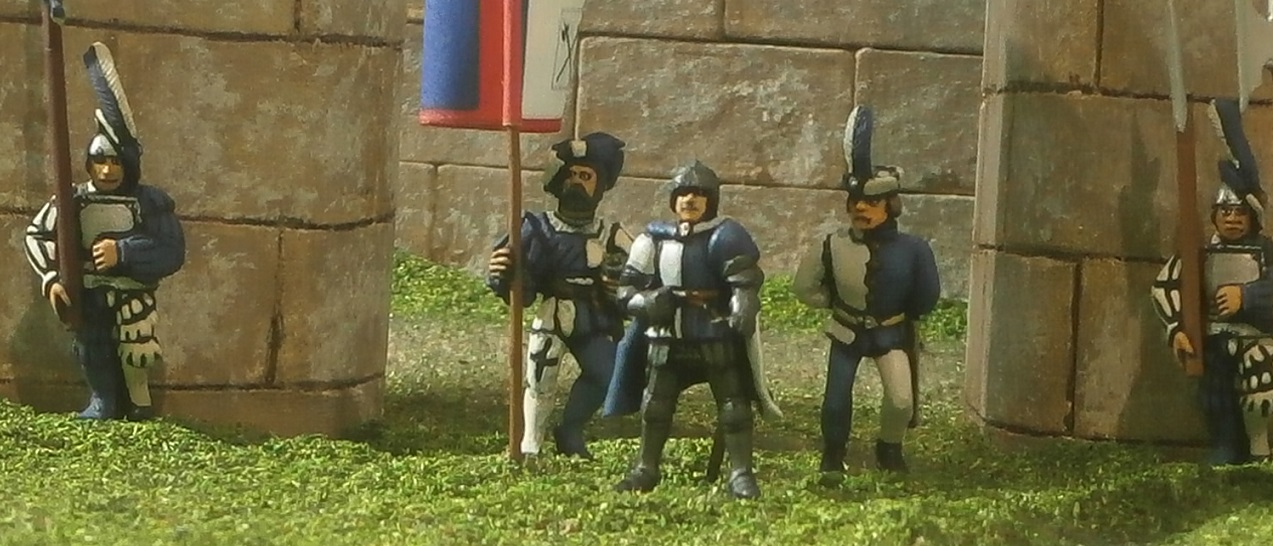
Lord Silvano’s father Duke Guidobaldo also returned, having travelled from Verezzo where he had offered sanctuary to all the citizens, promising them homes, livelihoods and protection in his own realm. Learning of the VMC army’s approach to his city, however, he could not tarry to escort those who accepted his offer, but raced back to his own city, arriving in the nick of time, only matter of hours before the army of the VMC drew themselves up to within handgun shot of the city walls, in preparation to lay siege. He was greeted by his son, but any happiness that they might have felt at being reunited was surely dwarfed by their concerns regarding the forthcoming struggle.
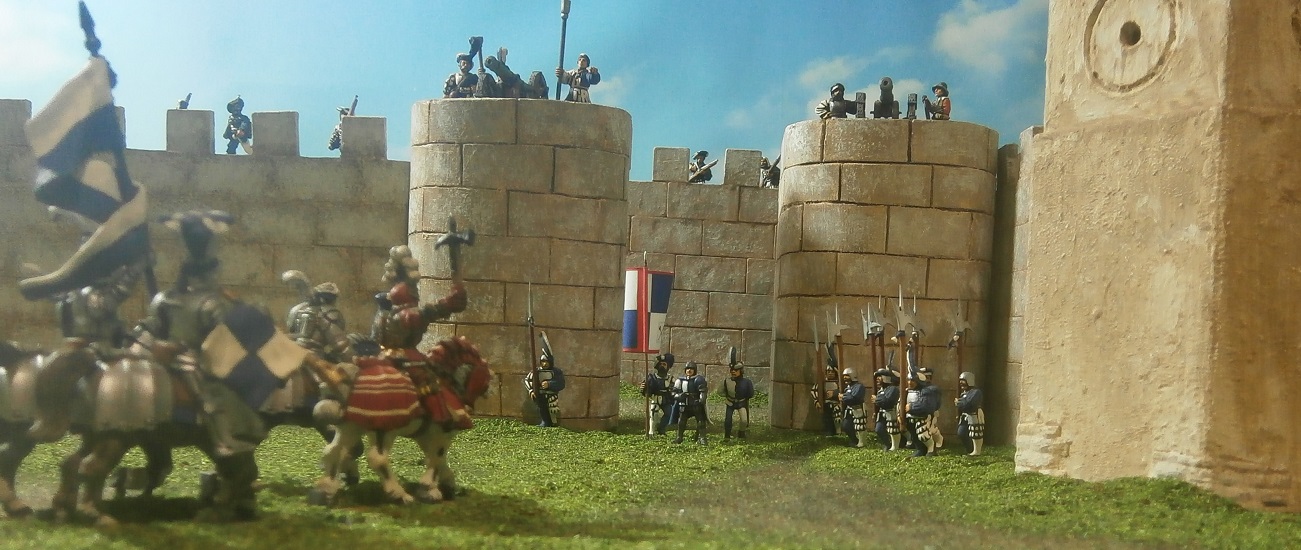
The VMC had marched north to share the burden of the terrible war against the vampires and brutes. Instead they had now embarked upon a war of honour against one of the oldest Tilean city-states, despite the vampire Duchess Maria’s complete destruction of the army of the Dedicati di Morr at Ebino, and the landing of an army of Sartosan pirates upon the coast at Luccini.
It is to the latter event that I shall next turn. King Ferronso of Luccini had taken leave of the grand alliance army at Trantio as soon as he received reports of the Sartosan threat to the coastal realms. He did not do so lightly, and indeed left a significant portion of his small army’s strength with the alliance force, under the command of the condottiere General Marsilio da Fermo. The army’s council of war agreed that they had more than adequate strength to defeat the enemy’s army in Trantio, and so it would be unfair to demand that the young king remained with them when his realm faced such troubles. But the journey home was long, and although the king rode as fast as he possibly could, accompanied by his guard of noble men-at-arms, he arrived too late to defend his realm. The Sartosans had landed in great strength, utterly overwhelmed the city of Luccini itself, plundered it thoroughly, and then moved on to take all they could from Aversa to the east. Thus it was that the young king could only watch, more spy than warrior hero, as his realm was ravaged by an enemy far too strong for him to face.
…
All is Lost! Is All Lost?
They had left their mounts hidden deep in the woods, with the rest of the company, then the three of them, cautiously, if a little clumsily due to their armour, picked their way to the trees’ edge. Although he had already been informed of what was happening in Aversa, the young King Ferronso insisted on seeing with his own eyes, and his companions, for several reasons - not least that he was their king - chose not to argue. Signore Pierozzo went a little way ahead of the king and Barone Vettorio, stopping to beckon them on only when he had made sure it was safe to do so.
Before they reached the boundary, they could hear the enemy, some laughing, others shouting. Pierozzo insisted he go ahead alone to assess the situation. He returned a little while later and led them to a spot he had discovered from where the town could be seen, but where the trees and bushes where thick enough to provide concealment. There they halted and watched a while in silence, until, as was proper, the king chose to speak.
“All is lost,” he said, dejectedly. “If only we’d got here quicker. If only I’d left the Portomaggiorans sooner.”
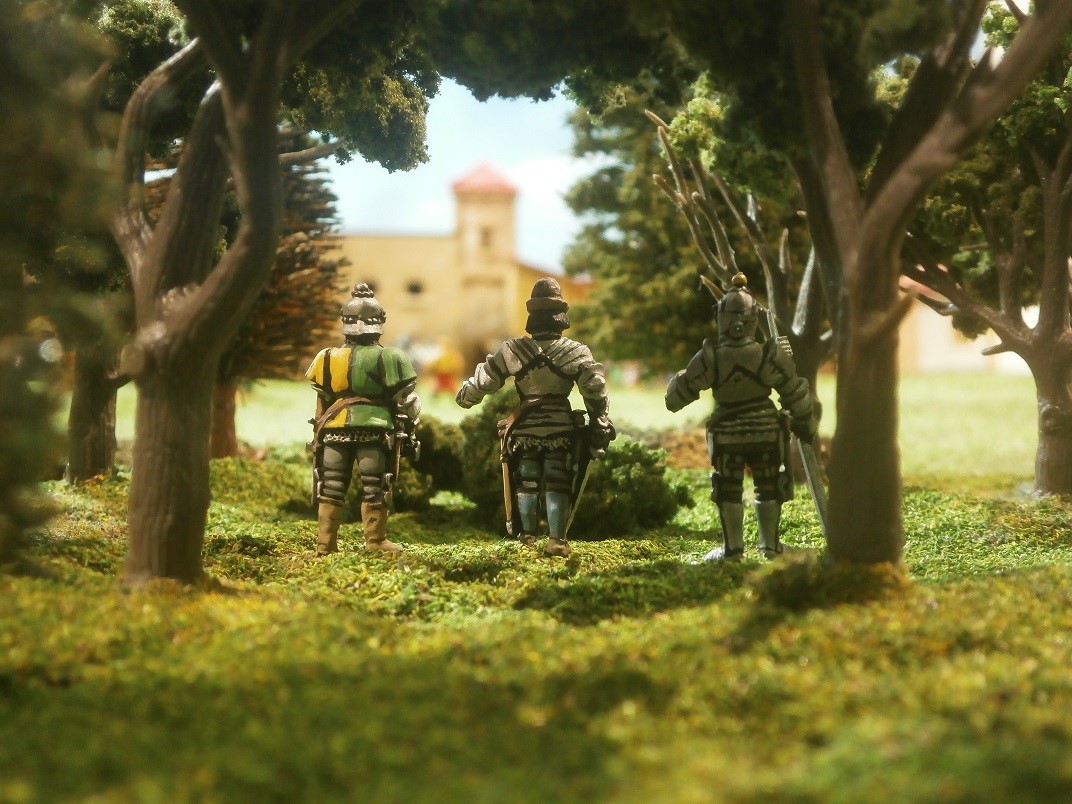
“Your highness, you bear no blame,” said the barone. “We came as soon as we heard, and none but the gods could ride faster, not in armour at least.”
“Then we should have left our armour and used faster mounts. And we should never have stopped for sleep.
“Then we would have arrived ill-equipped in every way to thwart such a numerous foe.”
“We are ill equipped, Vettorio! Why did I leave so many soldiers in Lord Alessio’s service? Why did I not bring them back with me?”
“Sire, you were honour bound,” said the barone. “The vampires were yet to be faced in battle, and to refuse to lend any aid to such a design would be wrong in the gods’ eyes.”
“Aye, your highness, you did only what was right,” added Pierozzo. “Besides, the pike and guns would have slowed us to less than half the pace and still made us no more able to defeat such a numerous foe.”
“But it is a king’s duty to protect his realm. First and foremost. In that I’ve failed.”
“You strove to do exactly that, sire, against the brutes who had torn realm after realm apart, and against the restless dead who threatened far worse,” argued the barone. He gestured at the men before them, “These Sartosans bear all the blame for this deed. Not only are they thieves and murderers, but cowardly opportunists for choosing to strike just when we were engaged elsewhere upon a rightful and necessary war. They too will stand before Morr in the end, and he will scorn them.”
“If it is capable for men to be worse even than vampires,” said Signore Pierozzo, “then these men are so.”
King Ferronso squinted as he watched the activity between the trees and the town, where several bodies of men were engaged upon drill practice.
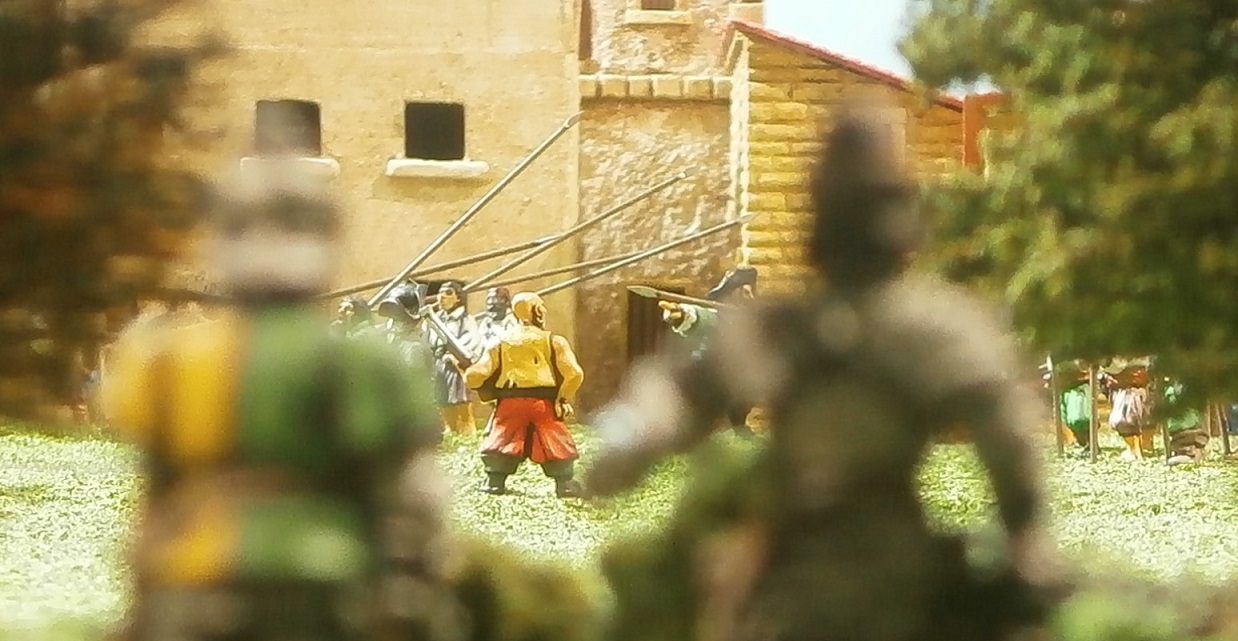
“All is lost,” he repeated. This time his companions said nothing. He sniffed, then turned to the barone. “Vettorio, is all lost?”
“This is bad, sire. But not as bad as it could be. These men have plundered and raped your people, most likely stolen the strongest to sell as slaves. But they won’t eat them as the brutes would have done, nor will they kill them and turn their corpses into foul servants as would the vampires.”
These words did not seem to reassure the king at all. He merely winced at the hearing of them.
“Nor will they stay, your highness,” the barone quickly added. “Sartosans do not conquer, but rather they steal what they can, and then move on.”
“So, when they choose to go, I can return to whatever ruins they leave behind them?” said the king. “Weeping women and frightened children? Not a scrap of gold to pay my debts, nor wine to drink, nor even beef or mutton to eat?”
“The realm will heal, sire, given time.”
“Yes, I suppose it will,” said Ferronso, somewhat dismissively. “I am still king.”
His two companions fell silent, at a loss as to what to say to such a child-like remark.
“They have pikes,” the king announced, unexpectedly. “I never knew pirates to be pikemen.”
“Aye, sire,” said Signore Pierozzo. “Those are our pikes.”
“Ours?”
“The town militia’s. They must have taken them from the arsenal. Maybe they feared we might return, and well-mounted?”
“If they did then they expected more of us,” said the king dejectedly.
The three of them then watched the enemy a while. The Sartosans had divided themselves into little companies, all the better to practise with the pikes. Each little body had a commander, no doubt a fellow who was experienced in the handling of a pike, to guide them through their postures, and ensure they could do so as one. Some were busy at the charge, although unusually they did not hold the pikes at their necks but thrust them from their waists like spears.
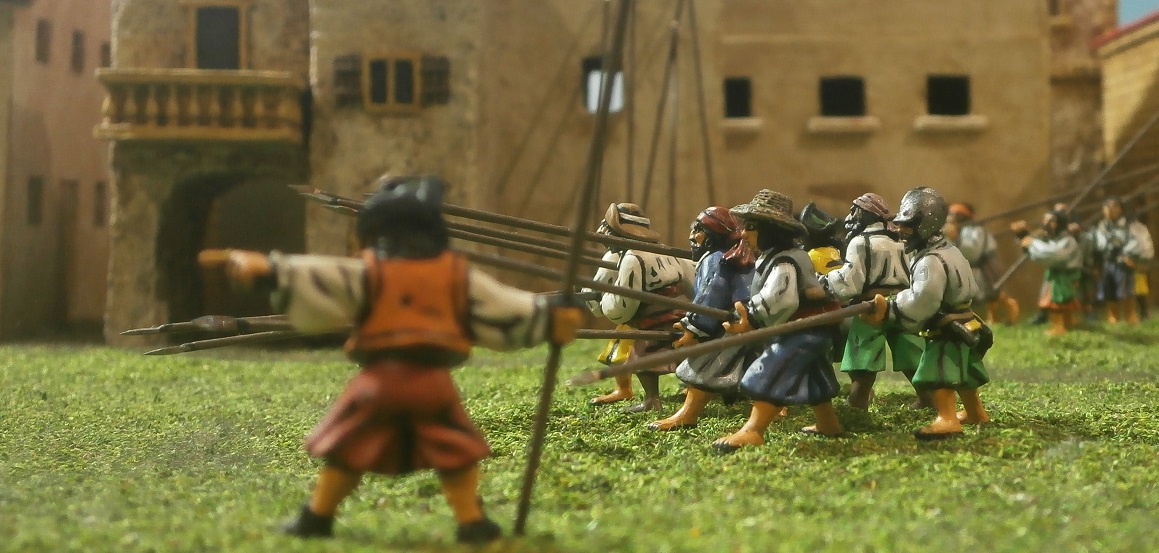
This struck the barone as odd, for it was not the Tilean way. Perhaps the fellow in charge was from some far away realm where such a drill was employed? Others stood at order and watched, while a heavily bearded northerner in a huge green coat and an orange scarf, a Marienburger most likely, tested the strength of the hold of one of their number.
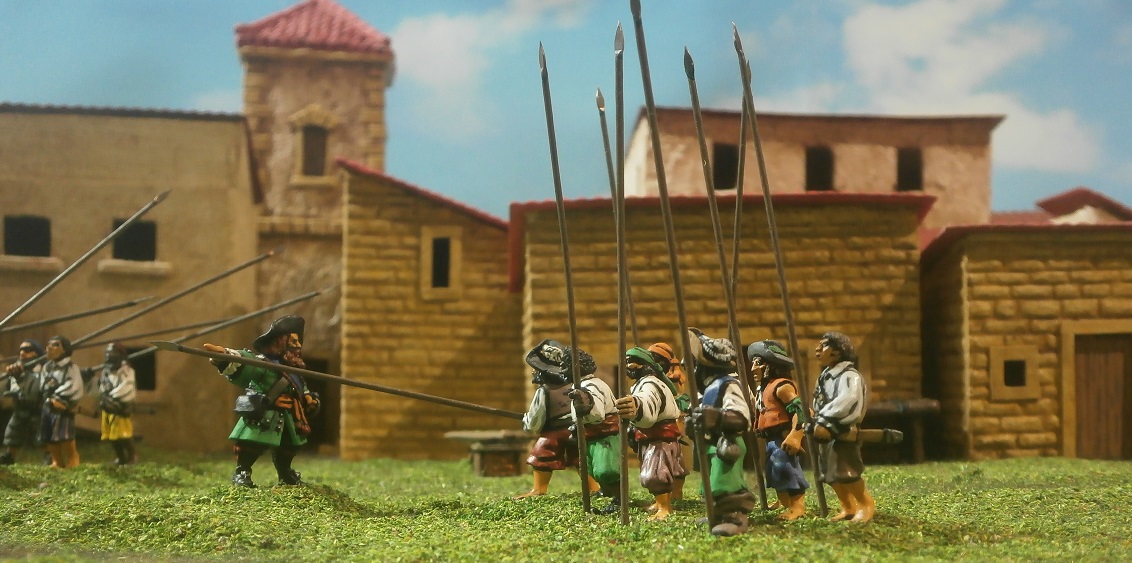
Still others came up as if just about to join in the practise …

… while one tardy fellow stood by a stand of pikes leaning against a building, trying each one as if deciding which was best.
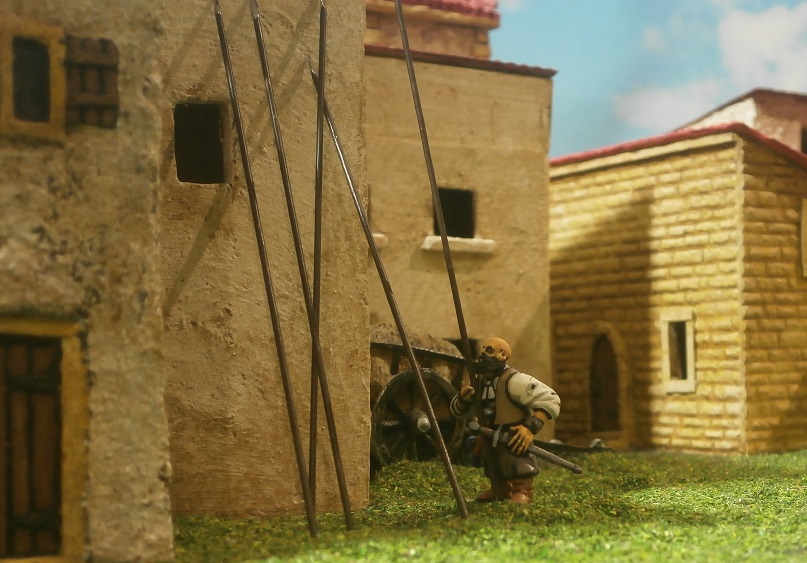
“There don’t seem to be that many of them,” said the king.
His companions, somewhat judiciously, and knowing the young king well, said nothing.
“But then I suppose these are just some of them,” the king added after a while.
“There are indeed many more, Sire,” said Pierozzo. “Here, in the city and across your realm. They have a great number of handgunners, batteries of cannons and swivel guns.”
“’What’ guns?” asked the king.
“Small pieces of artillery, such as are mounted upon stanchions on ships’ gunwales. Neither handgun nor cannon, but somewhere in between.”
“Yes,” said the king, sounding impatient. “I know those.”
Pierozzo nodded, then continued, “There are dwarfs amongst them, even greenskins …”
The king scowled at this comment, which made Pierozzo stop.
“Go on,” said the king. “What else?”
“And regiments of fighters festooned in weapons of every kind.”
“No armour though?”
“None, sire. I think they fear the consequences should they fall into the sea.”
The young king thought about this for a moment. Then he pointed towards three pikeless men who were watching the rest.

“Who are they?” he asked.
“I cannot say, sire. Captains, perhaps? At least one of them.”
“The one in the black coat, I’ll bet,” said the king. “That one by his side in the robes, he’s a wizard, surely?”
“Most likely, sire. And the other one, some other officer, like a first mate or a Bo’s’un or such like.”
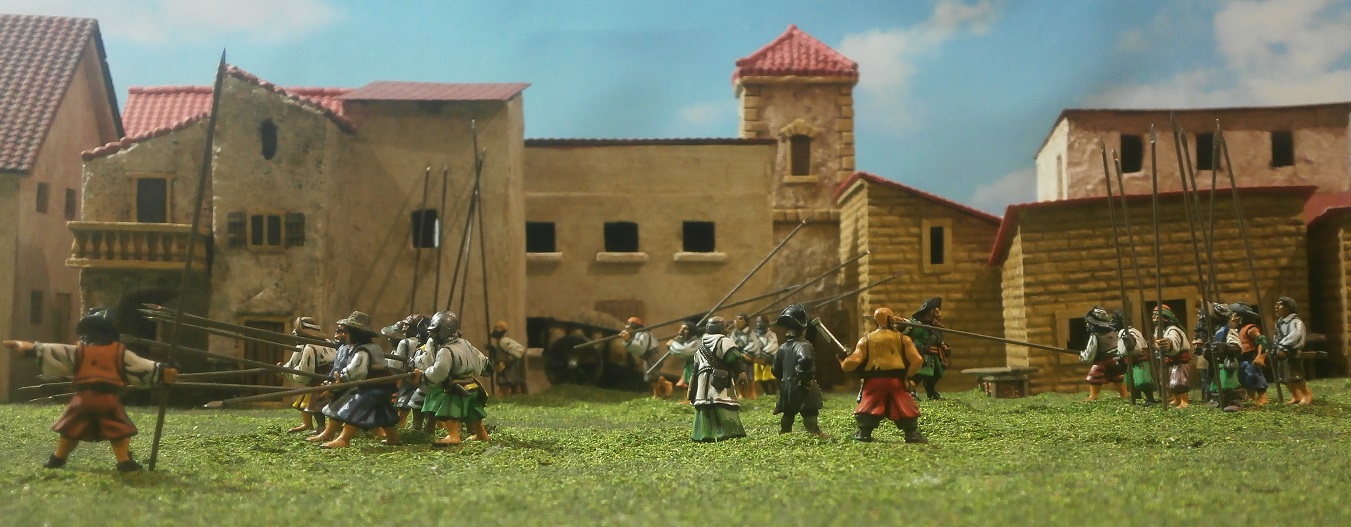
“Would it not be for the best, sire, that we leave now, before someone spies us?” asked the barone. The king did not answer, but just turned and began strolling away. His companions joined him.
“I will not wait until I can creep home, skulking in the shadows in the meantime,” announced the king. “These Sartosans must be punished. What they’ve taken must be retrieved. My people need to know I am a vengeful king, and others must learn what happens to those who offend me.”
“Of course, sire,” said Barone Vettorio, glancing briefly at Pierozzo.
“So, how exactly do I do what must be done?” asked the king.
…
Next we will return to Bonacorso Fidelibus’s Historical work
Autumn, 2403
Despite the hopes raised by the crushing victories achieved in the realm of Trantio, first at the necropolis valley of Norochia and then further north in the Trantine hills, as well as the news of the ogre tyrant Razger Bouldergut’s departure through the mountainous pass of the Via Nano into the Border Princes, the entire peninsula of Tilea remained wracked by war or the imminent threat of war. Great armies were on the move, alliance-forces combined and divided in response to this particular threat and that, and old enmities and hatreds continued, as ever, to interfere with the greater need.
The army of the VMC had marched all the way from Alcente upon the southern-most tip of the peninsula to Pavona. Its general, Jan Valckenburgh, was intending to join with the Lord Alessio’s mighty army to drive the vampires once and for all to their destruction but had instead become distracted by the reported treachery of the ruler of Pavona, Duke Guidobaldo Gondi.
The Pavonan duke had claimed in a public letter that a force of VMC soldiers, disguised as Lord Alessio’s Portomaggiorans, had attacked the realm of Verezzo, killing the philosopher Lord Lucca Vescussi and plundering the region known as Spomanti. General Valckenburgh, who had interrogated a band of Verezzan rogues fleeing the troubles in their realm, declared Duke Guidobaldo’s words to be lies, claiming instead that it was Duke Guidobaldo’s own Pavonan soldiers, disguised as Portomaggiorans, who had performed the foul deed, spurred by a greed for plunder now that their own realm was so weakened by the depredations of Bouldergut’s brute ogres, and also in order to distract and damage all the realms around them, so that Pavona might not appear so weak in comparison.
Many argued over the truth of the matter. Some said that the Pavonan duke was guilty and had made the false claim simply to hide the fact that he himself was responsible for the raid and murder, cleverly befuddling the picture so that if people learned that the Portomaggiorans were not to blame, he could respond with another lie on top of the original deception. Others said that the VMC was responsible, being dishonourable plunderers by their very nature, and had used the lie as an excuse to go on from plundering Verezzo to plunder Pavona also, all the while claiming to be entirely innocent, instead simply responding appropriately to Duke Guidobaldo’s outrageous defamation and hoping to find proof of his foul deeds to restore their honourable reputation!
Whatever the truth, the army of the VMC now drew close enough to lay siege to the ancient, mightily walled city of Pavona, wherein was garrisoned the last of the Pavonan armies. The young Lord Silvano, who had fought so bravely in the war against the vampires (at Viadaza, Ebino and Trantio) had only recently arrived home, given leave to depart from the grand alliance army after the victory in Norochia, where his men had not even needed to unsheathe their swords.

Lord Silvano’s father Duke Guidobaldo also returned, having travelled from Verezzo where he had offered sanctuary to all the citizens, promising them homes, livelihoods and protection in his own realm. Learning of the VMC army’s approach to his city, however, he could not tarry to escort those who accepted his offer, but raced back to his own city, arriving in the nick of time, only matter of hours before the army of the VMC drew themselves up to within handgun shot of the city walls, in preparation to lay siege. He was greeted by his son, but any happiness that they might have felt at being reunited was surely dwarfed by their concerns regarding the forthcoming struggle.

The VMC had marched north to share the burden of the terrible war against the vampires and brutes. Instead they had now embarked upon a war of honour against one of the oldest Tilean city-states, despite the vampire Duchess Maria’s complete destruction of the army of the Dedicati di Morr at Ebino, and the landing of an army of Sartosan pirates upon the coast at Luccini.
It is to the latter event that I shall next turn. King Ferronso of Luccini had taken leave of the grand alliance army at Trantio as soon as he received reports of the Sartosan threat to the coastal realms. He did not do so lightly, and indeed left a significant portion of his small army’s strength with the alliance force, under the command of the condottiere General Marsilio da Fermo. The army’s council of war agreed that they had more than adequate strength to defeat the enemy’s army in Trantio, and so it would be unfair to demand that the young king remained with them when his realm faced such troubles. But the journey home was long, and although the king rode as fast as he possibly could, accompanied by his guard of noble men-at-arms, he arrived too late to defend his realm. The Sartosans had landed in great strength, utterly overwhelmed the city of Luccini itself, plundered it thoroughly, and then moved on to take all they could from Aversa to the east. Thus it was that the young king could only watch, more spy than warrior hero, as his realm was ravaged by an enemy far too strong for him to face.
…
All is Lost! Is All Lost?
They had left their mounts hidden deep in the woods, with the rest of the company, then the three of them, cautiously, if a little clumsily due to their armour, picked their way to the trees’ edge. Although he had already been informed of what was happening in Aversa, the young King Ferronso insisted on seeing with his own eyes, and his companions, for several reasons - not least that he was their king - chose not to argue. Signore Pierozzo went a little way ahead of the king and Barone Vettorio, stopping to beckon them on only when he had made sure it was safe to do so.
Before they reached the boundary, they could hear the enemy, some laughing, others shouting. Pierozzo insisted he go ahead alone to assess the situation. He returned a little while later and led them to a spot he had discovered from where the town could be seen, but where the trees and bushes where thick enough to provide concealment. There they halted and watched a while in silence, until, as was proper, the king chose to speak.
“All is lost,” he said, dejectedly. “If only we’d got here quicker. If only I’d left the Portomaggiorans sooner.”

“Your highness, you bear no blame,” said the barone. “We came as soon as we heard, and none but the gods could ride faster, not in armour at least.”
“Then we should have left our armour and used faster mounts. And we should never have stopped for sleep.
“Then we would have arrived ill-equipped in every way to thwart such a numerous foe.”
“We are ill equipped, Vettorio! Why did I leave so many soldiers in Lord Alessio’s service? Why did I not bring them back with me?”
“Sire, you were honour bound,” said the barone. “The vampires were yet to be faced in battle, and to refuse to lend any aid to such a design would be wrong in the gods’ eyes.”
“Aye, your highness, you did only what was right,” added Pierozzo. “Besides, the pike and guns would have slowed us to less than half the pace and still made us no more able to defeat such a numerous foe.”
“But it is a king’s duty to protect his realm. First and foremost. In that I’ve failed.”
“You strove to do exactly that, sire, against the brutes who had torn realm after realm apart, and against the restless dead who threatened far worse,” argued the barone. He gestured at the men before them, “These Sartosans bear all the blame for this deed. Not only are they thieves and murderers, but cowardly opportunists for choosing to strike just when we were engaged elsewhere upon a rightful and necessary war. They too will stand before Morr in the end, and he will scorn them.”
“If it is capable for men to be worse even than vampires,” said Signore Pierozzo, “then these men are so.”
King Ferronso squinted as he watched the activity between the trees and the town, where several bodies of men were engaged upon drill practice.

“All is lost,” he repeated. This time his companions said nothing. He sniffed, then turned to the barone. “Vettorio, is all lost?”
“This is bad, sire. But not as bad as it could be. These men have plundered and raped your people, most likely stolen the strongest to sell as slaves. But they won’t eat them as the brutes would have done, nor will they kill them and turn their corpses into foul servants as would the vampires.”
These words did not seem to reassure the king at all. He merely winced at the hearing of them.
“Nor will they stay, your highness,” the barone quickly added. “Sartosans do not conquer, but rather they steal what they can, and then move on.”
“So, when they choose to go, I can return to whatever ruins they leave behind them?” said the king. “Weeping women and frightened children? Not a scrap of gold to pay my debts, nor wine to drink, nor even beef or mutton to eat?”
“The realm will heal, sire, given time.”
“Yes, I suppose it will,” said Ferronso, somewhat dismissively. “I am still king.”
His two companions fell silent, at a loss as to what to say to such a child-like remark.
“They have pikes,” the king announced, unexpectedly. “I never knew pirates to be pikemen.”
“Aye, sire,” said Signore Pierozzo. “Those are our pikes.”
“Ours?”
“The town militia’s. They must have taken them from the arsenal. Maybe they feared we might return, and well-mounted?”
“If they did then they expected more of us,” said the king dejectedly.
The three of them then watched the enemy a while. The Sartosans had divided themselves into little companies, all the better to practise with the pikes. Each little body had a commander, no doubt a fellow who was experienced in the handling of a pike, to guide them through their postures, and ensure they could do so as one. Some were busy at the charge, although unusually they did not hold the pikes at their necks but thrust them from their waists like spears.

This struck the barone as odd, for it was not the Tilean way. Perhaps the fellow in charge was from some far away realm where such a drill was employed? Others stood at order and watched, while a heavily bearded northerner in a huge green coat and an orange scarf, a Marienburger most likely, tested the strength of the hold of one of their number.

Still others came up as if just about to join in the practise …

… while one tardy fellow stood by a stand of pikes leaning against a building, trying each one as if deciding which was best.

“There don’t seem to be that many of them,” said the king.
His companions, somewhat judiciously, and knowing the young king well, said nothing.
“But then I suppose these are just some of them,” the king added after a while.
“There are indeed many more, Sire,” said Pierozzo. “Here, in the city and across your realm. They have a great number of handgunners, batteries of cannons and swivel guns.”
“’What’ guns?” asked the king.
“Small pieces of artillery, such as are mounted upon stanchions on ships’ gunwales. Neither handgun nor cannon, but somewhere in between.”
“Yes,” said the king, sounding impatient. “I know those.”
Pierozzo nodded, then continued, “There are dwarfs amongst them, even greenskins …”
The king scowled at this comment, which made Pierozzo stop.
“Go on,” said the king. “What else?”
“And regiments of fighters festooned in weapons of every kind.”
“No armour though?”
“None, sire. I think they fear the consequences should they fall into the sea.”
The young king thought about this for a moment. Then he pointed towards three pikeless men who were watching the rest.

“Who are they?” he asked.
“I cannot say, sire. Captains, perhaps? At least one of them.”
“The one in the black coat, I’ll bet,” said the king. “That one by his side in the robes, he’s a wizard, surely?”
“Most likely, sire. And the other one, some other officer, like a first mate or a Bo’s’un or such like.”

“Would it not be for the best, sire, that we leave now, before someone spies us?” asked the barone. The king did not answer, but just turned and began strolling away. His companions joined him.
“I will not wait until I can creep home, skulking in the shadows in the meantime,” announced the king. “These Sartosans must be punished. What they’ve taken must be retrieved. My people need to know I am a vengeful king, and others must learn what happens to those who offend me.”
“Of course, sire,” said Barone Vettorio, glancing briefly at Pierozzo.
“So, how exactly do I do what must be done?” asked the king.
…
Next we will return to Bonacorso Fidelibus’s Historical work
symphonicpoet
Moderator
Brilliant stuff as always Padre! 
Outsider
Vassal
I always keep an eye out for an update, even if I don't comment as much as I should.Padre":20zi3139 said:Thanks SymphonicPoet. I do wonder if anyone is actually reading at times!!!

